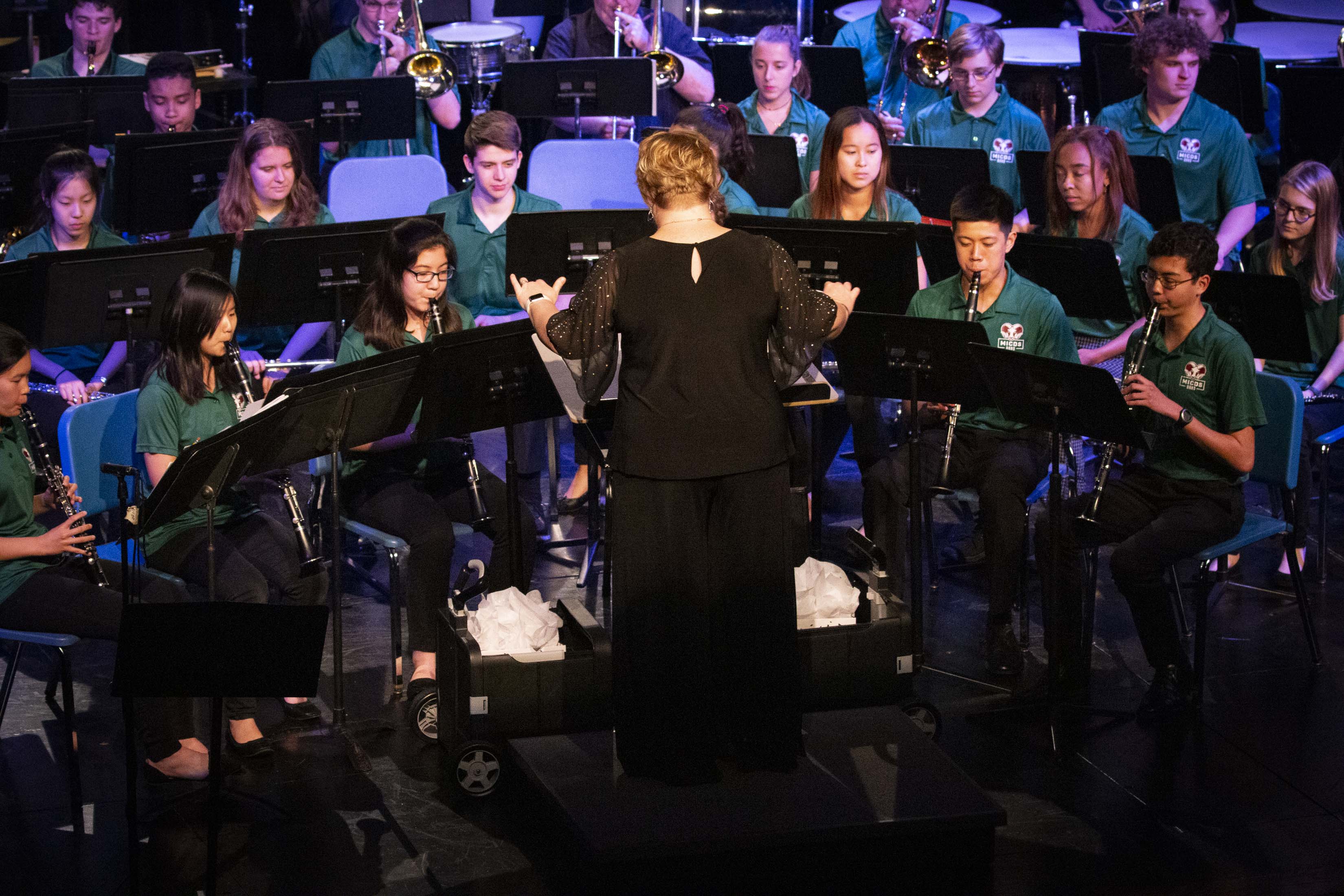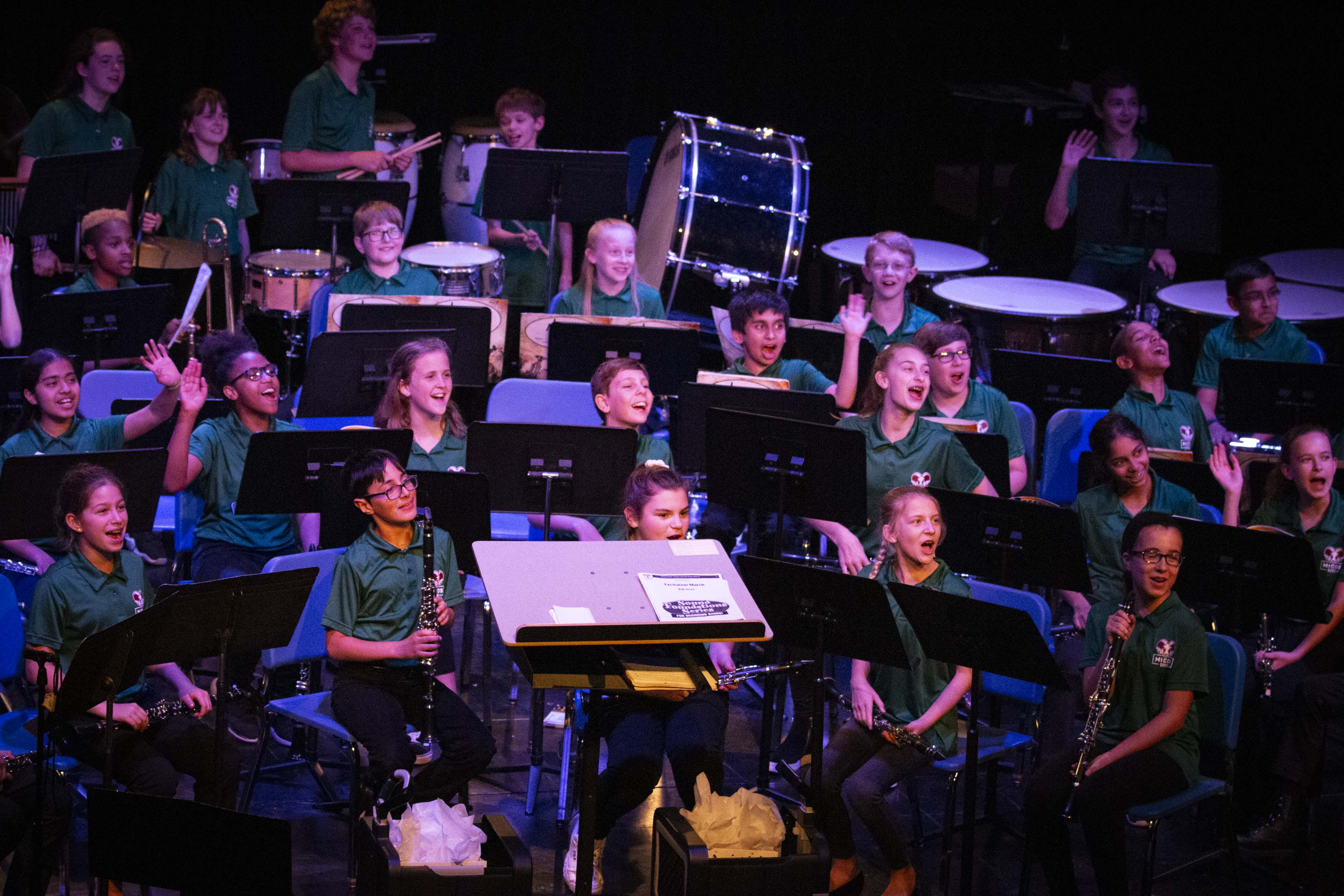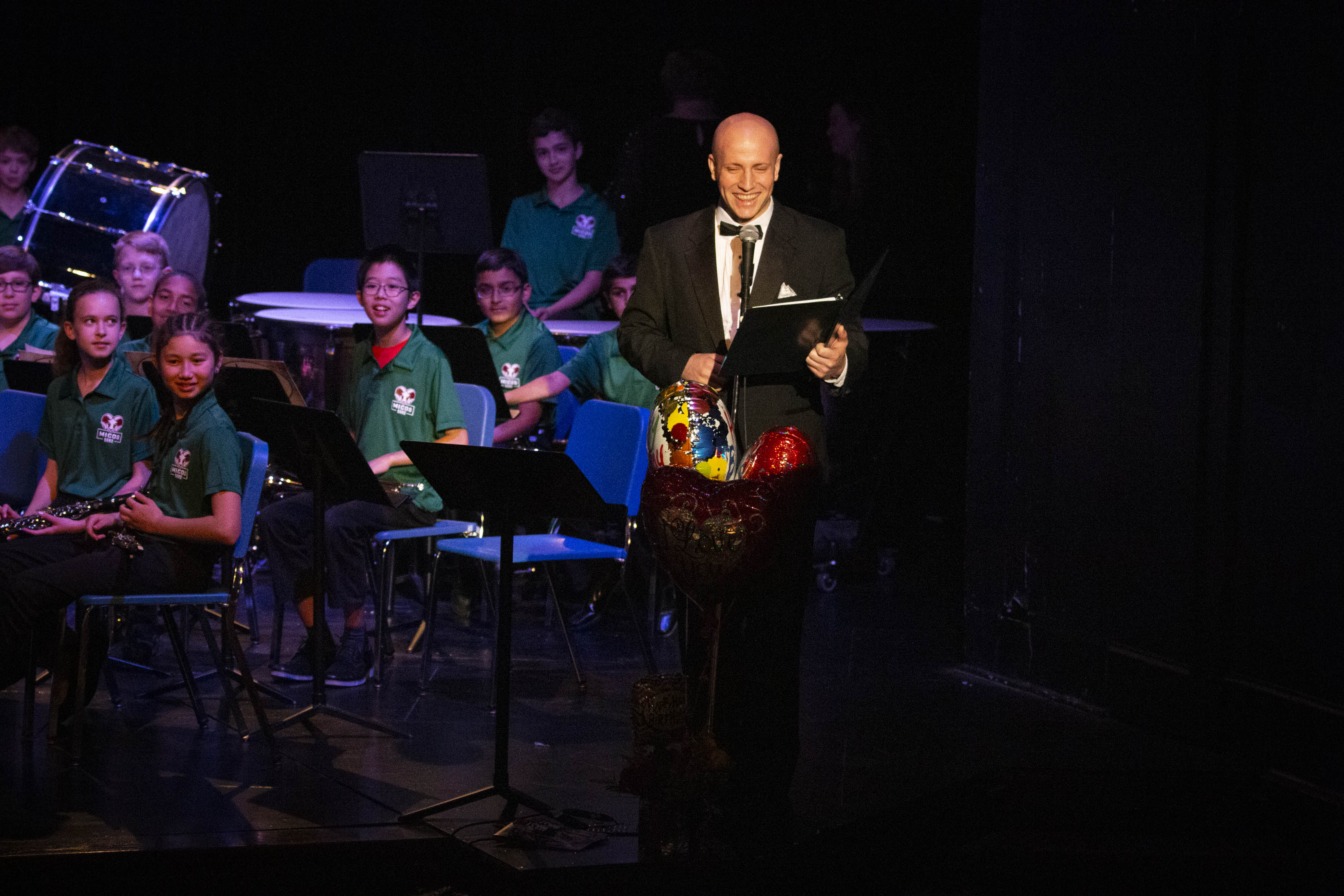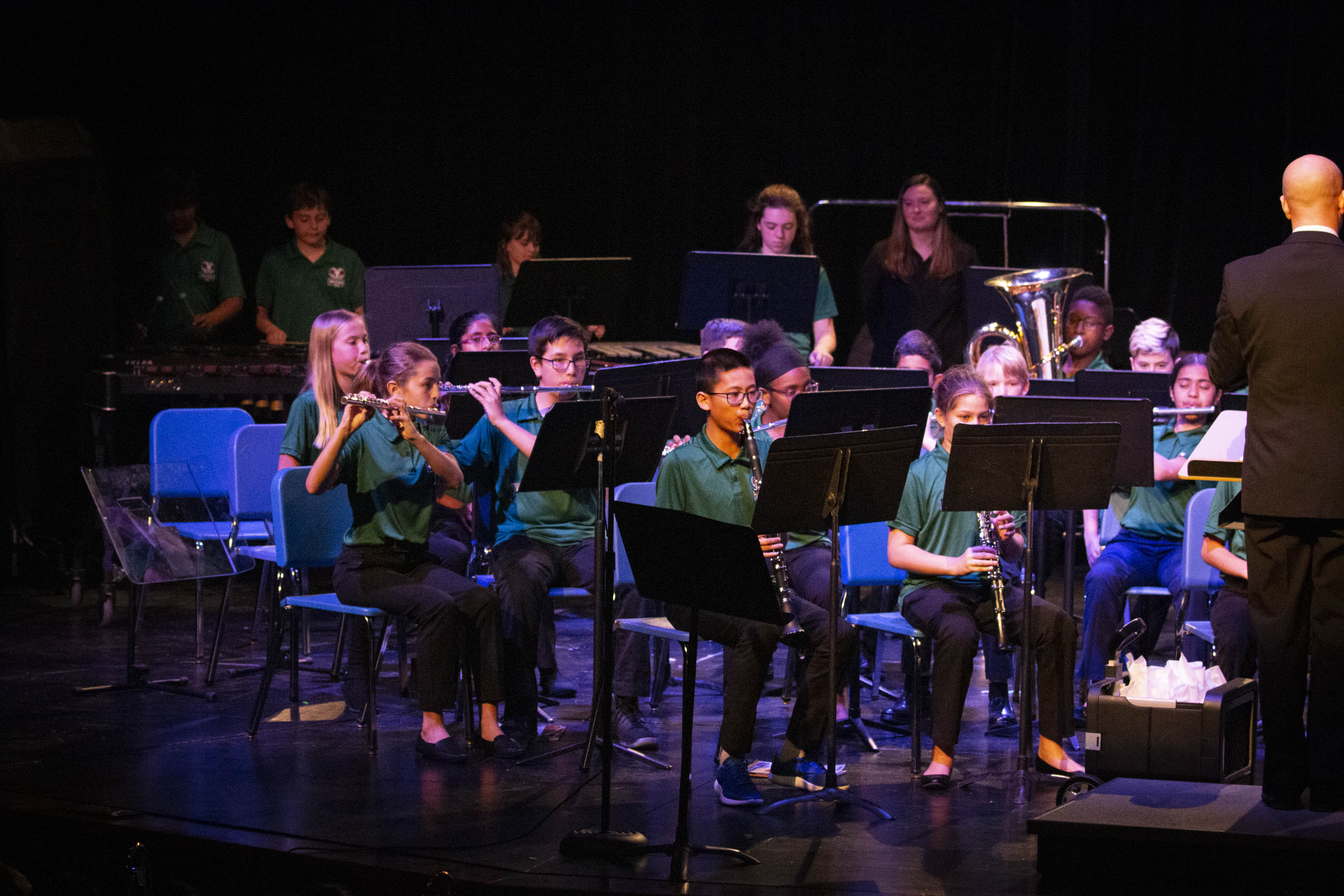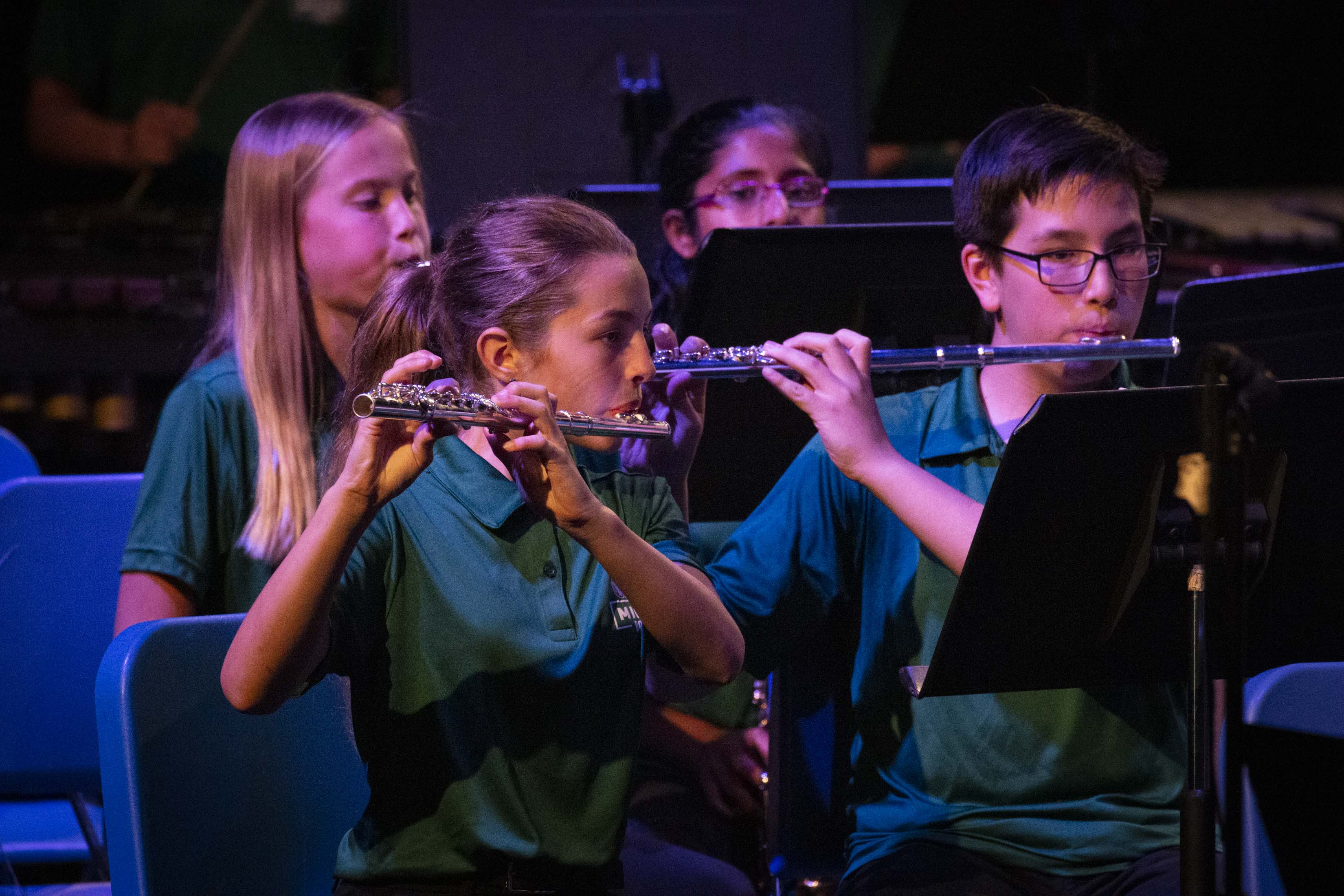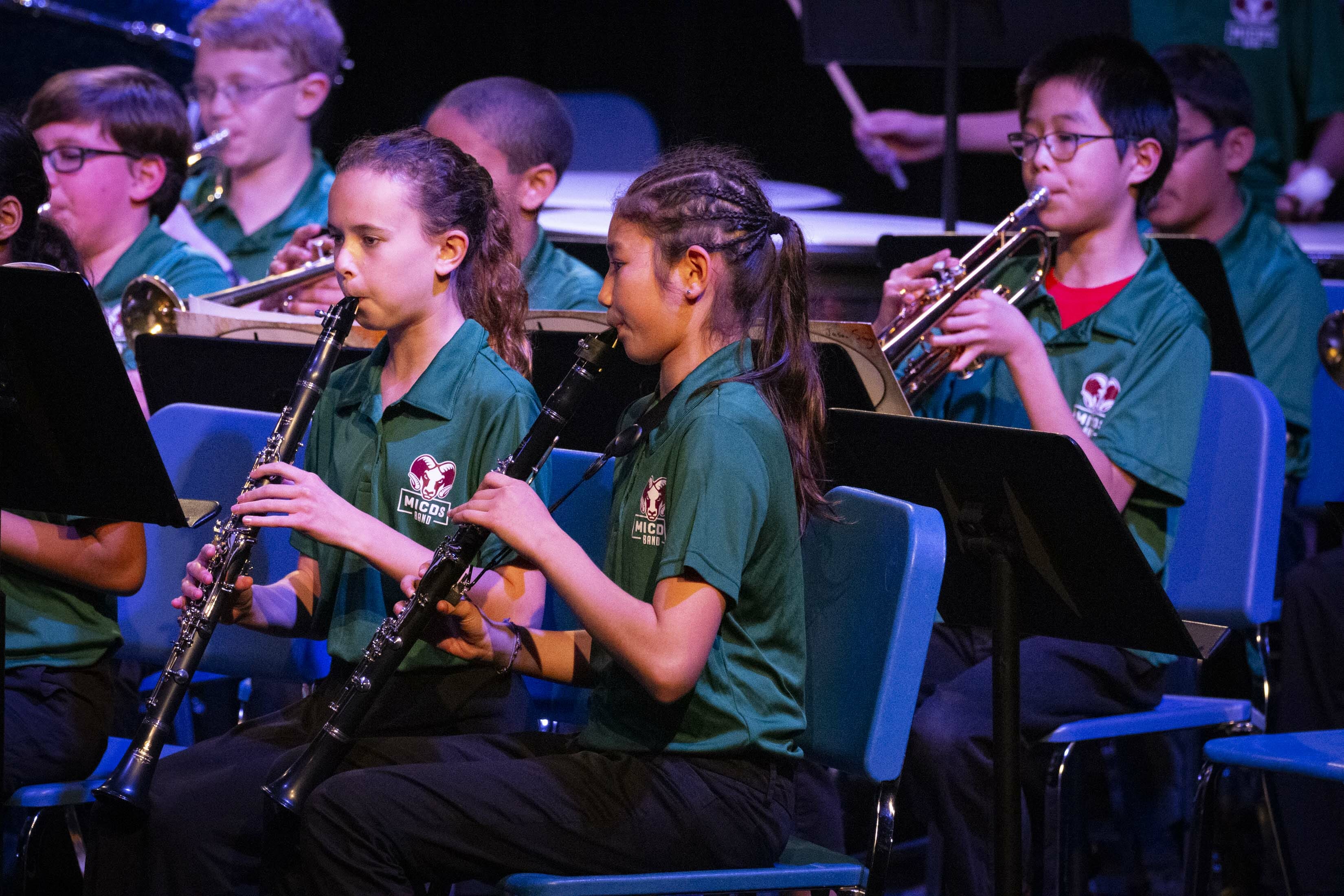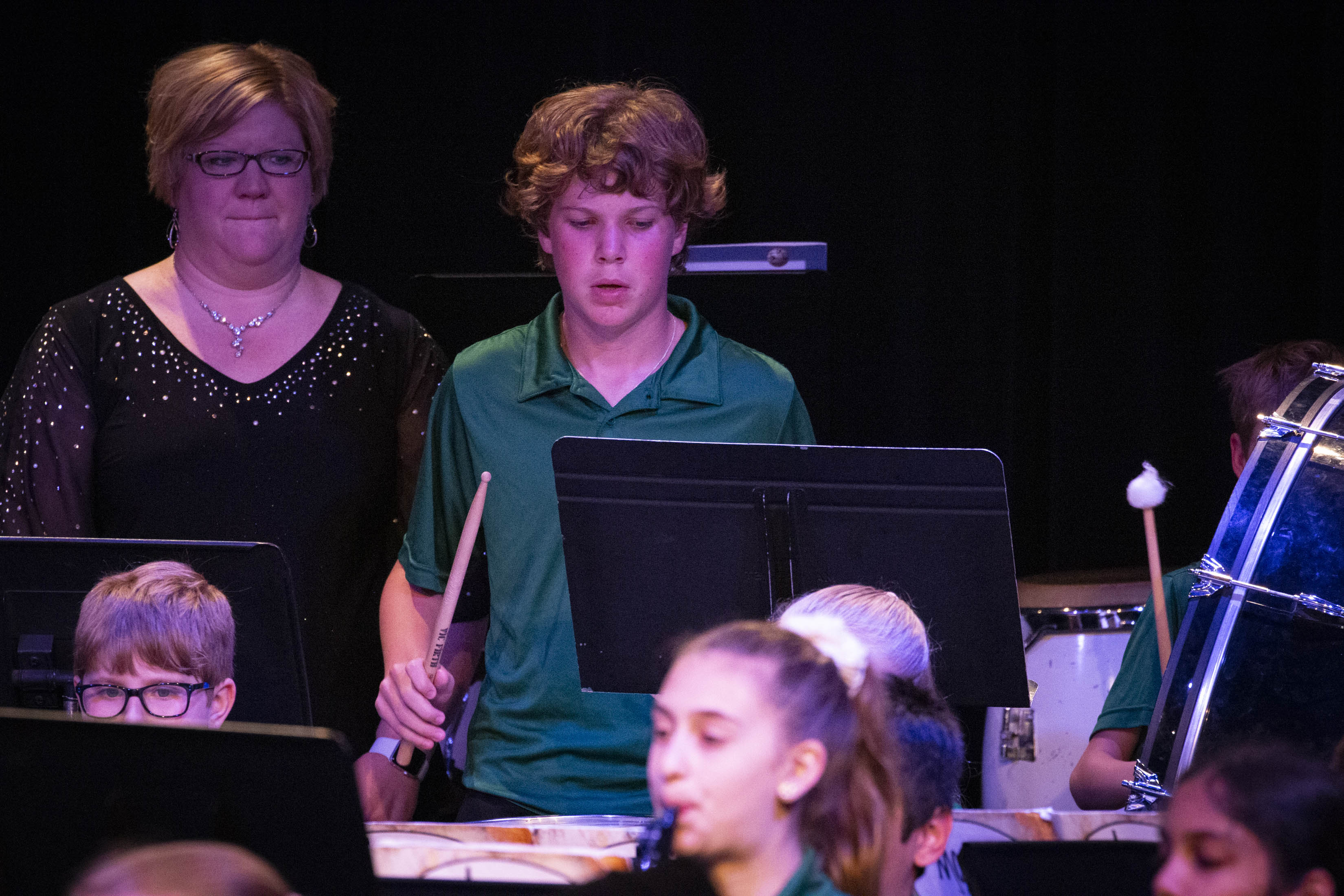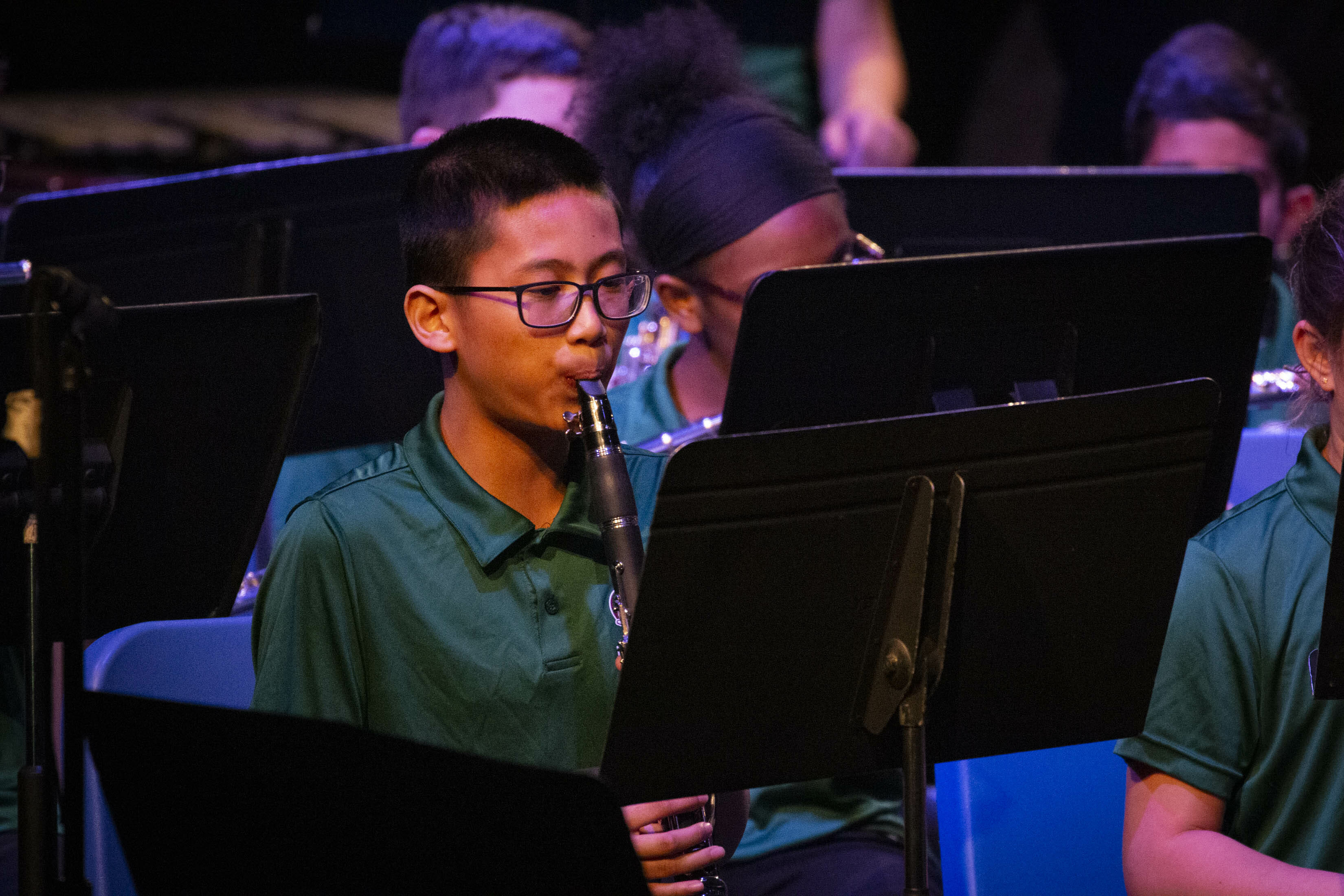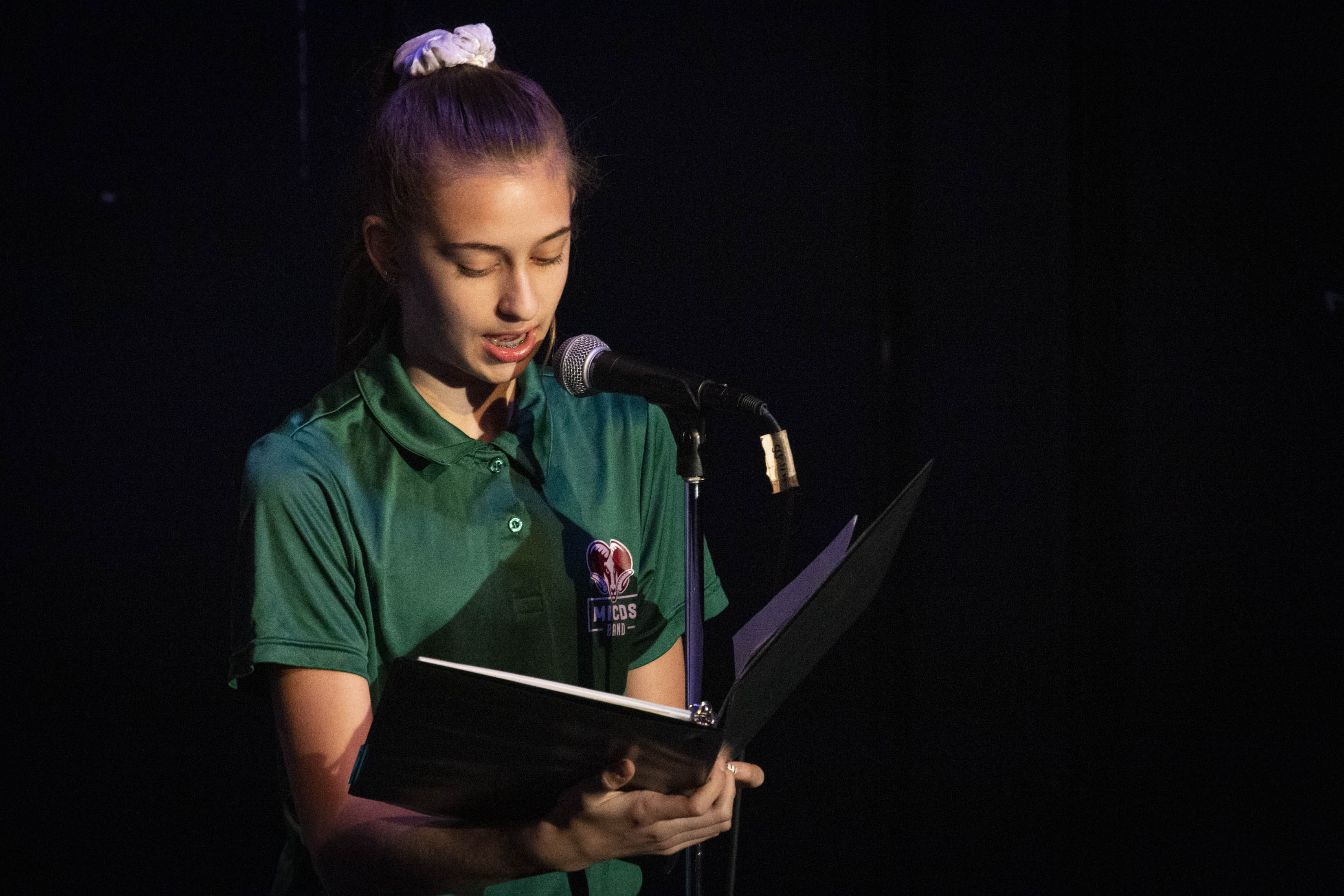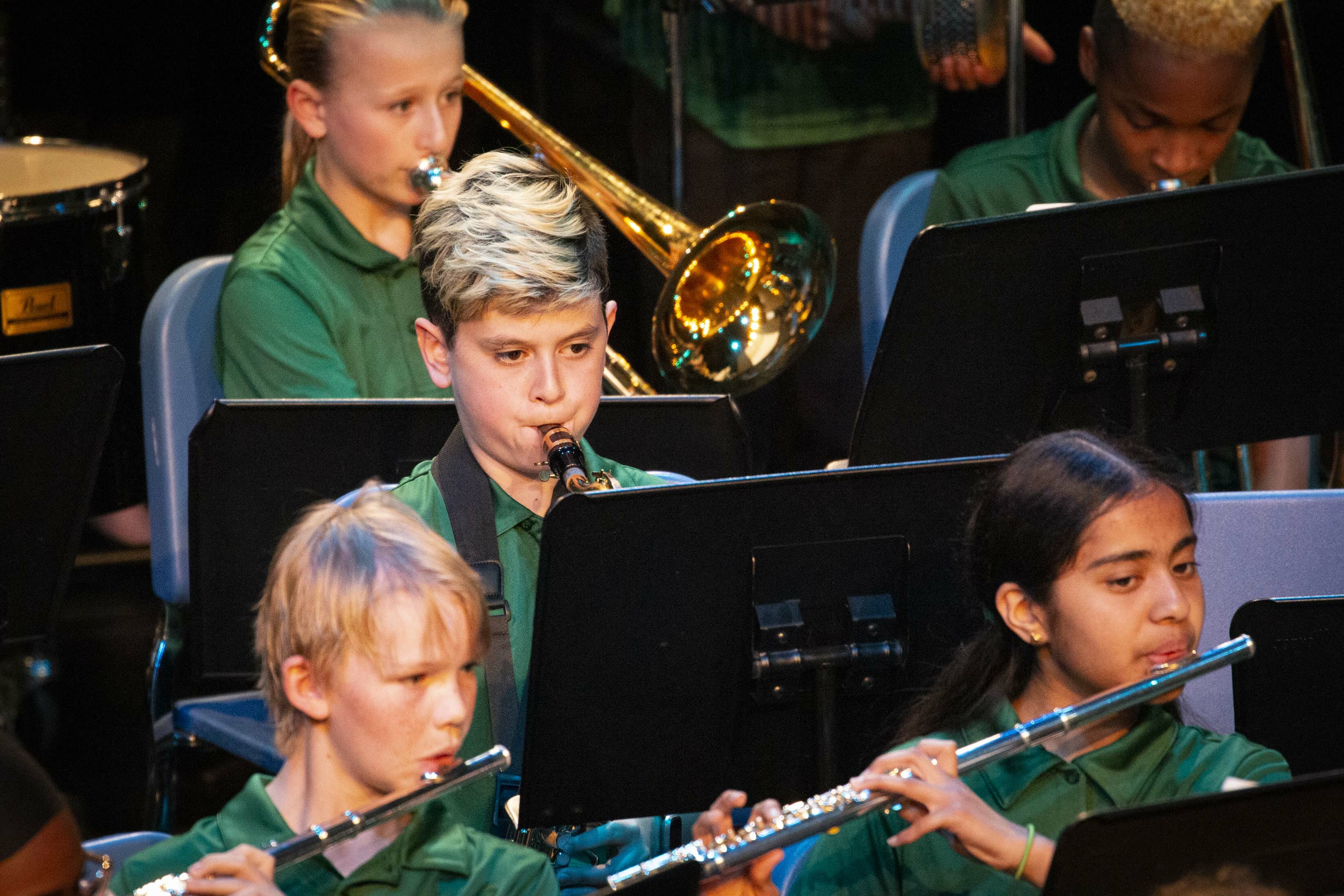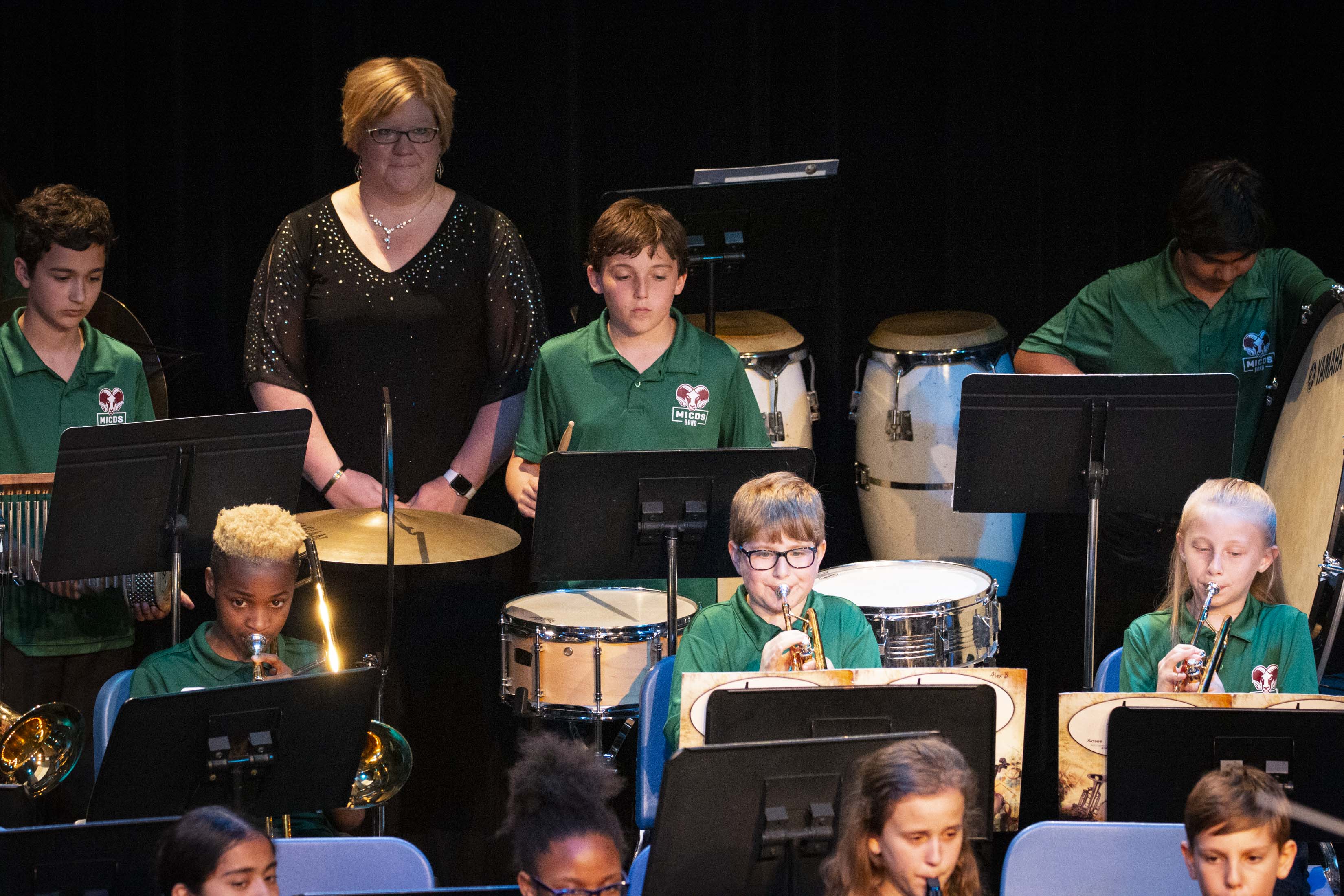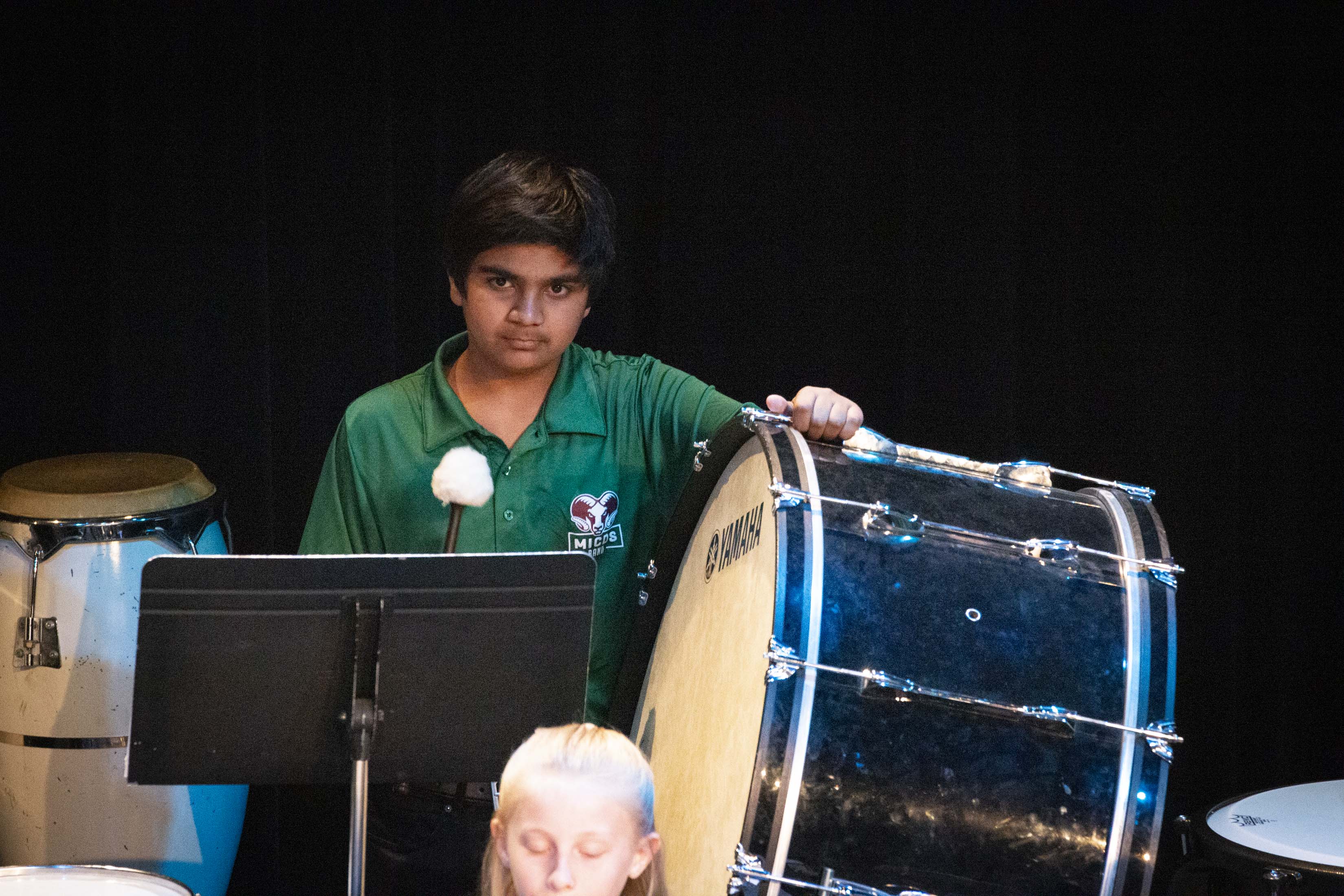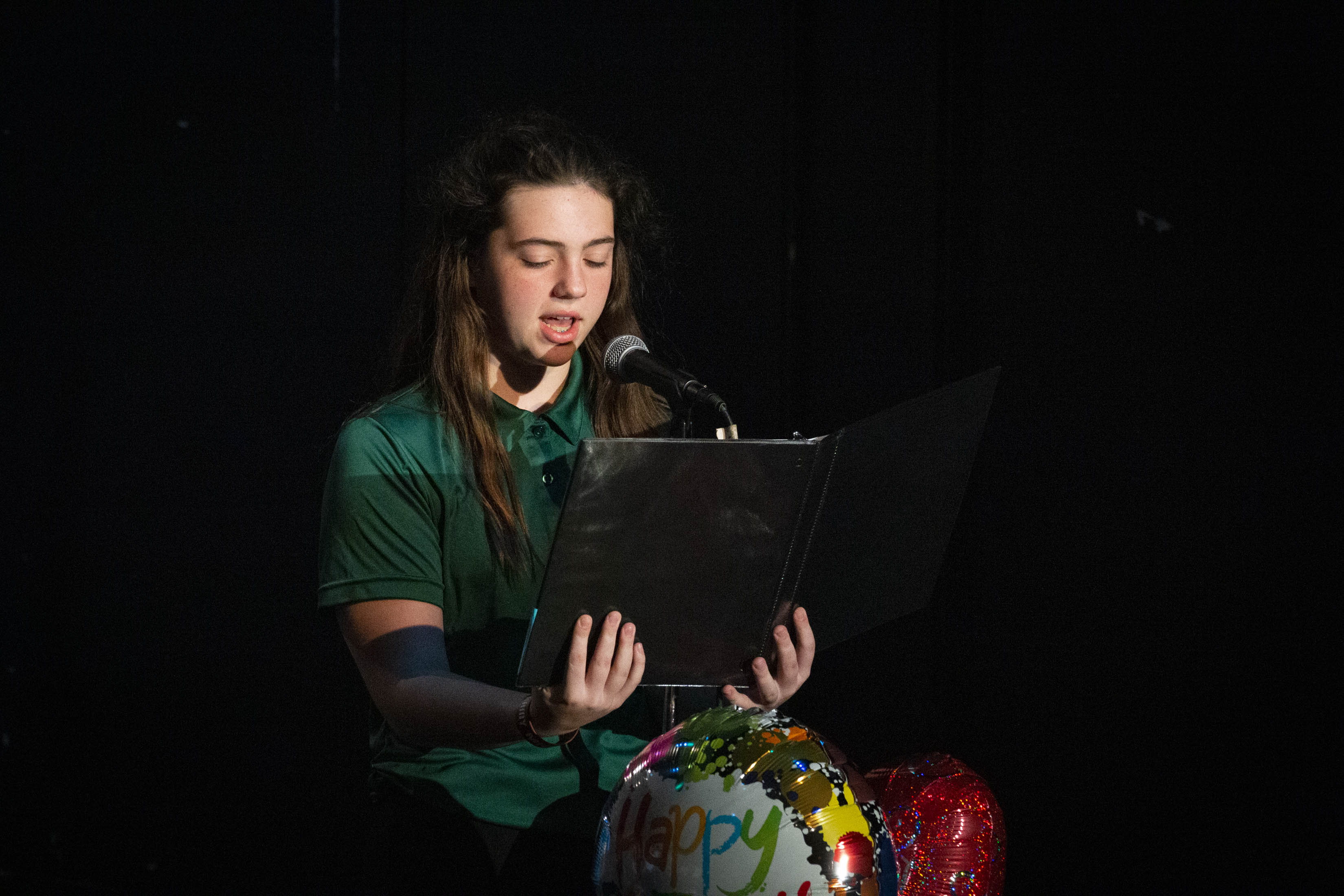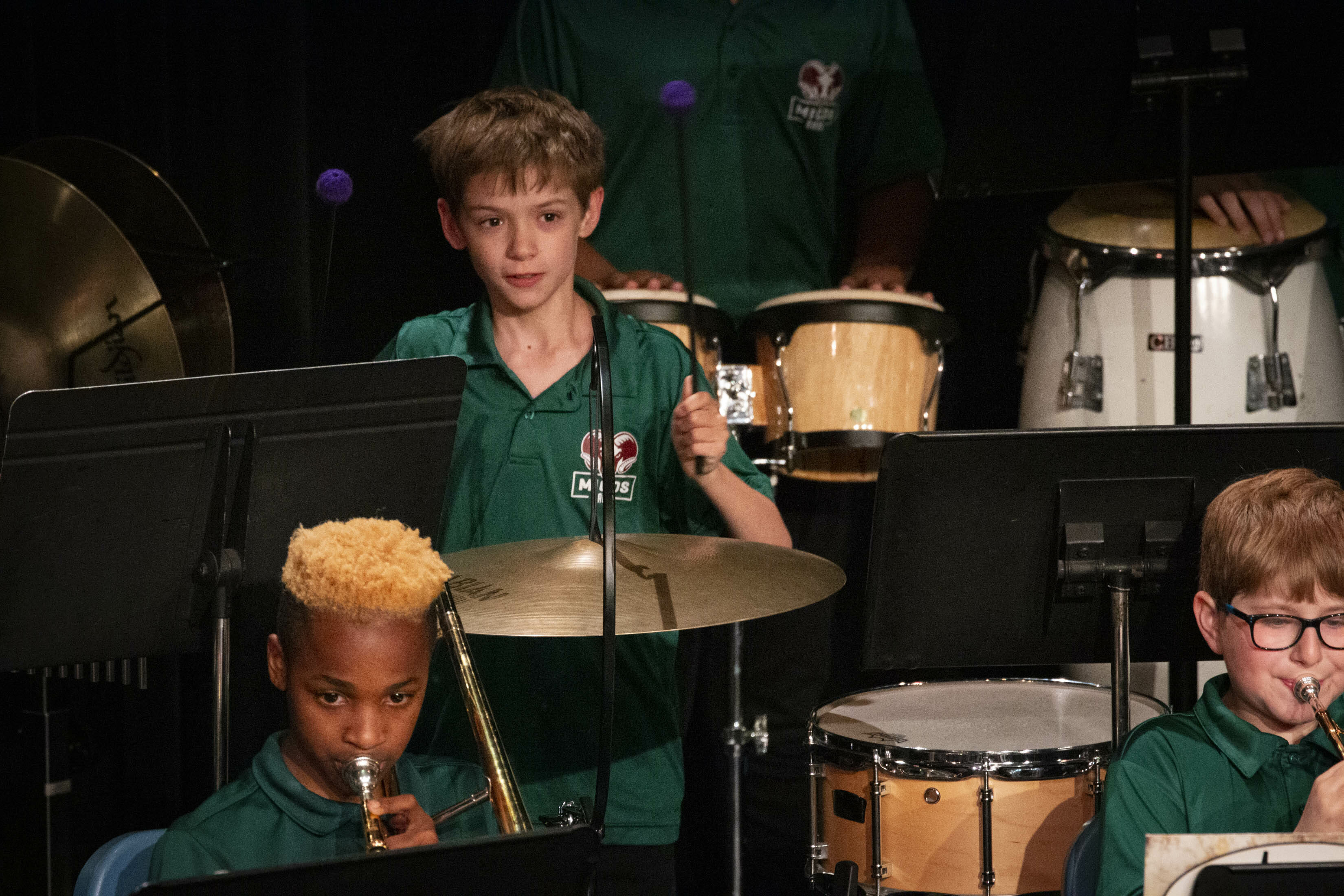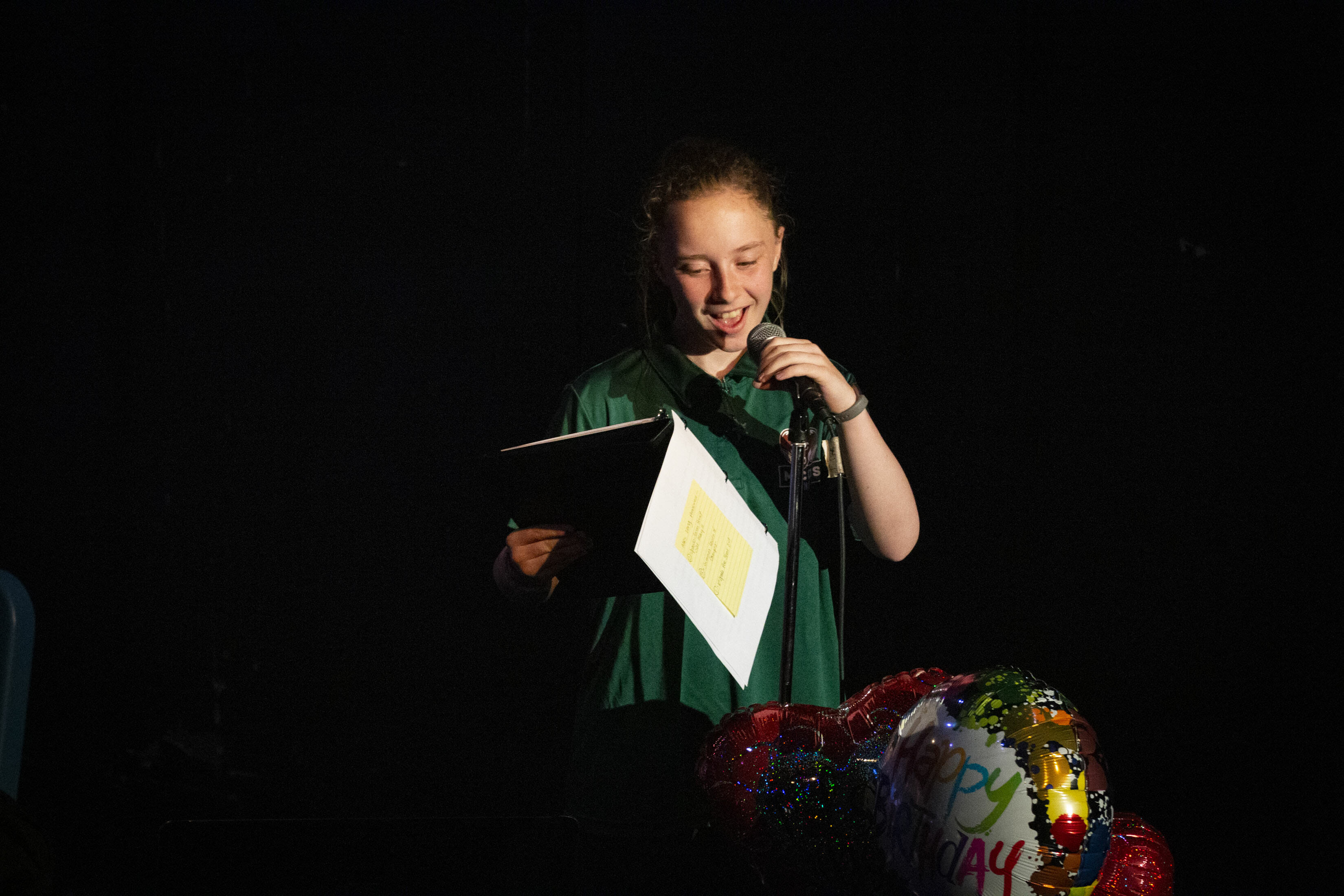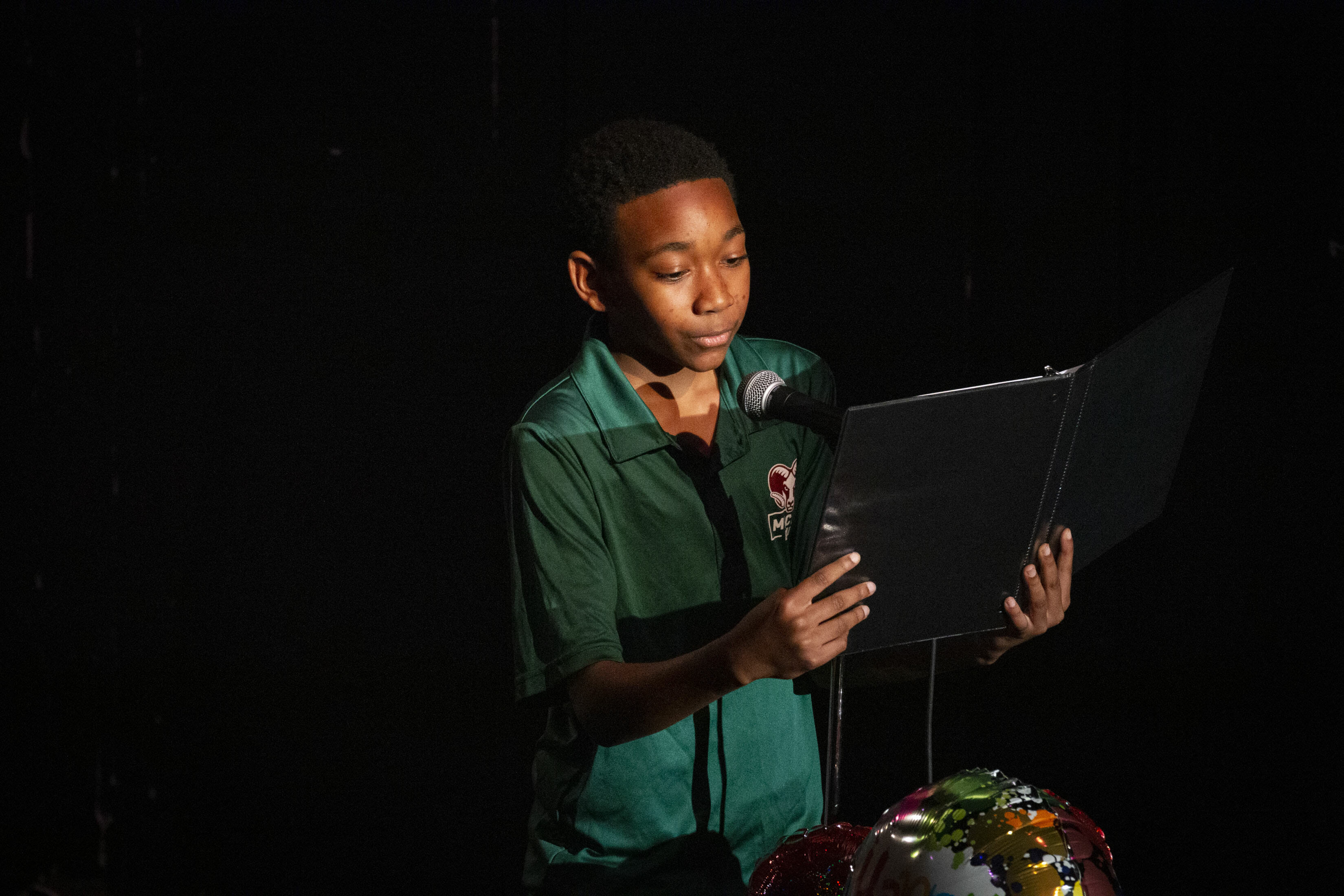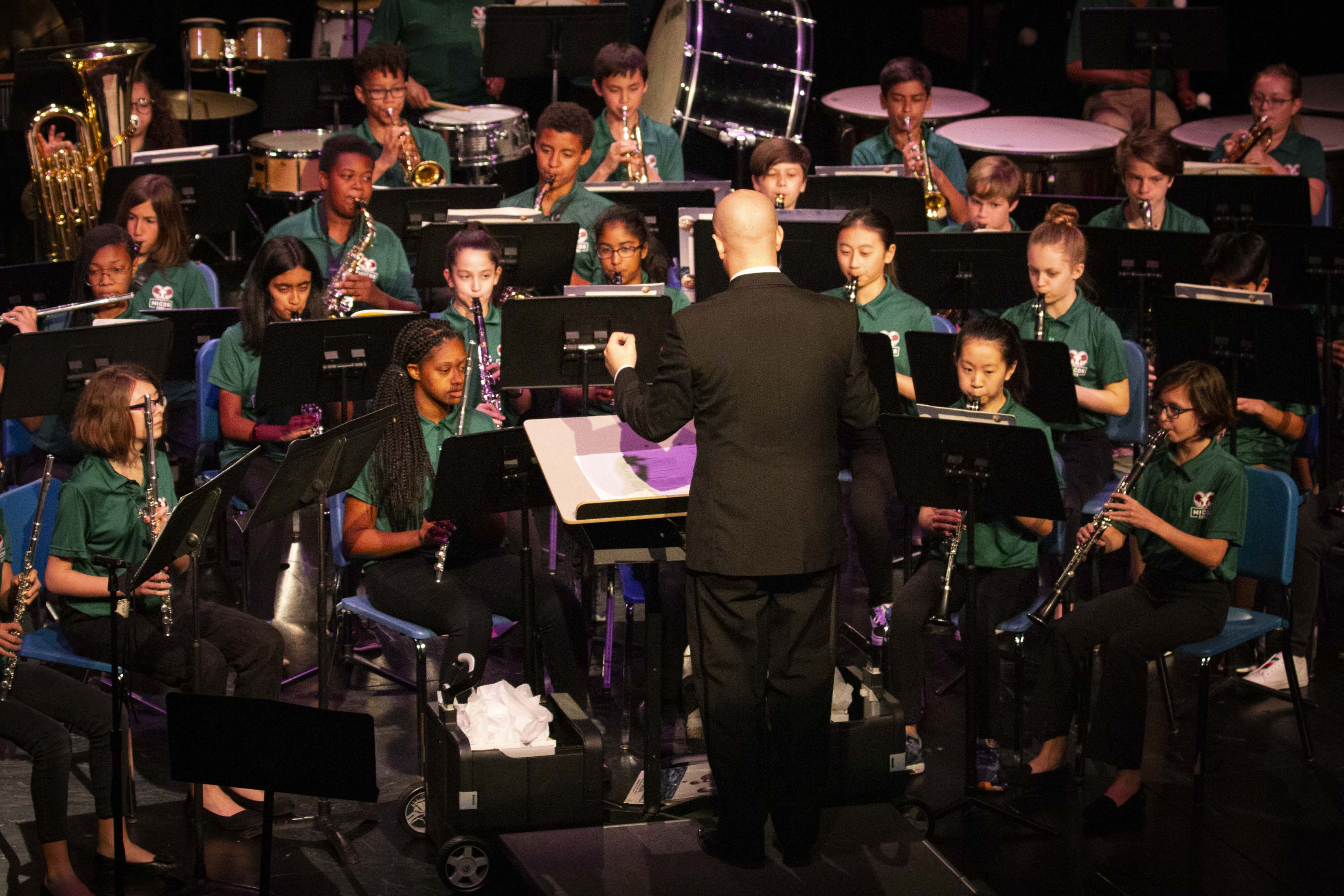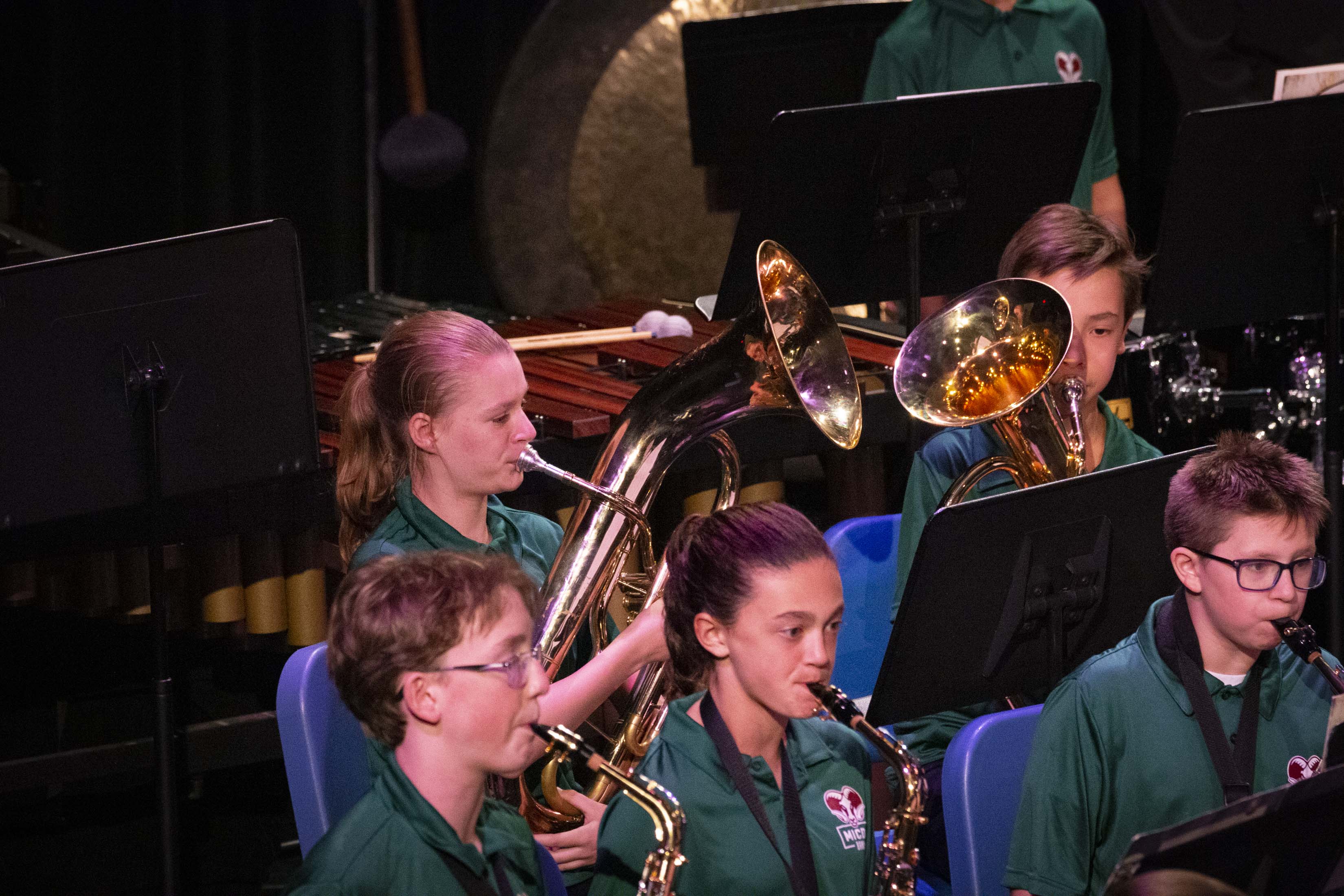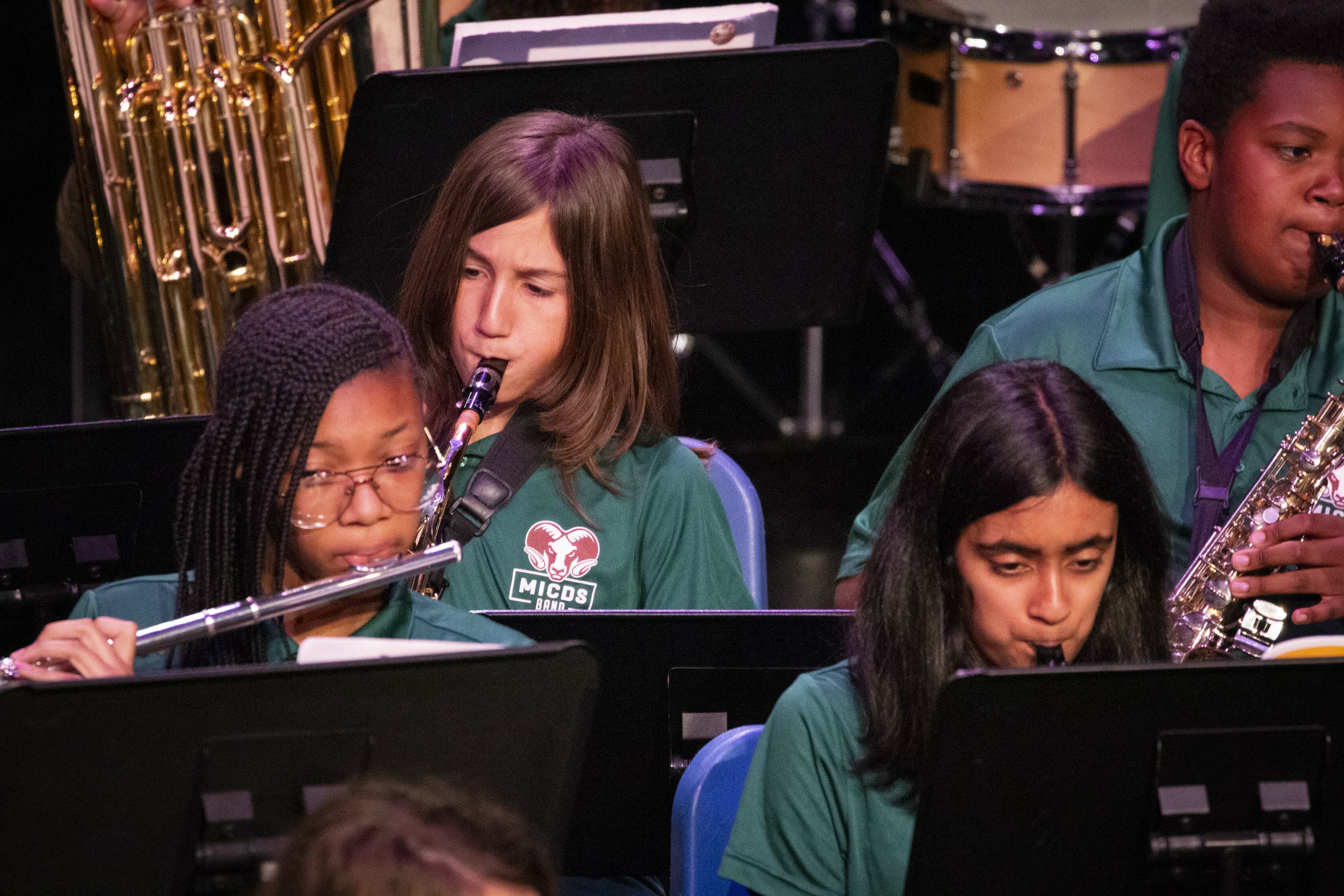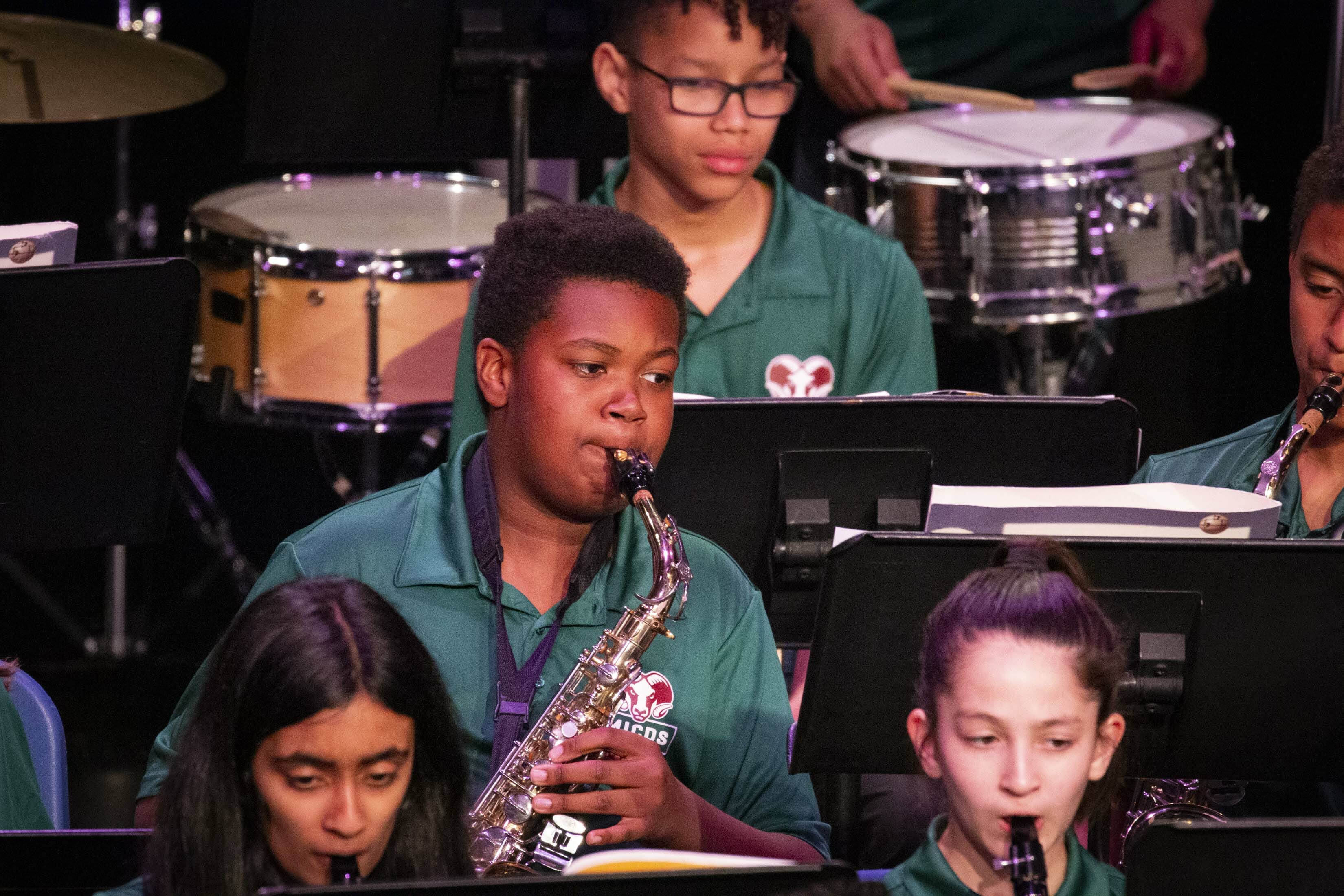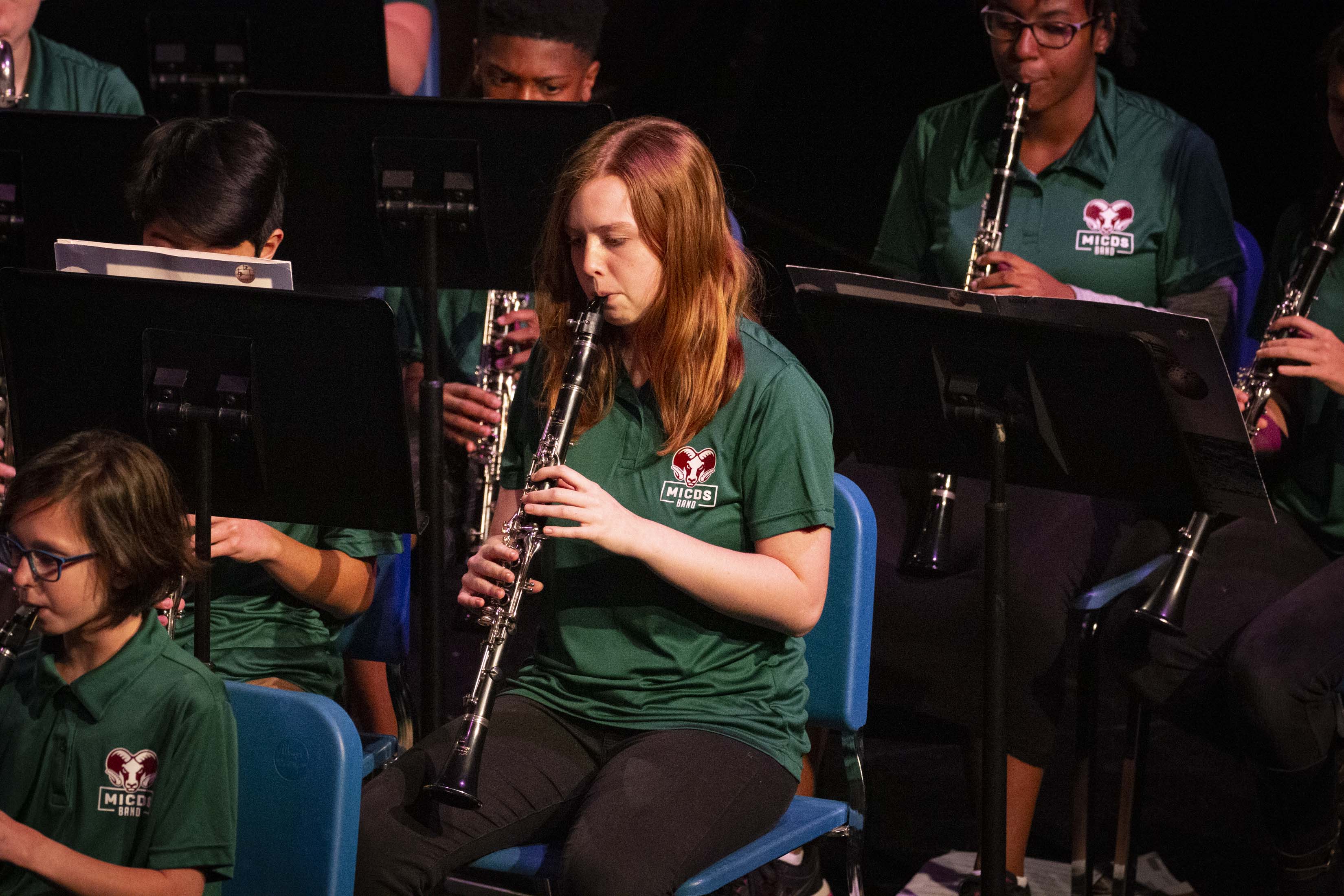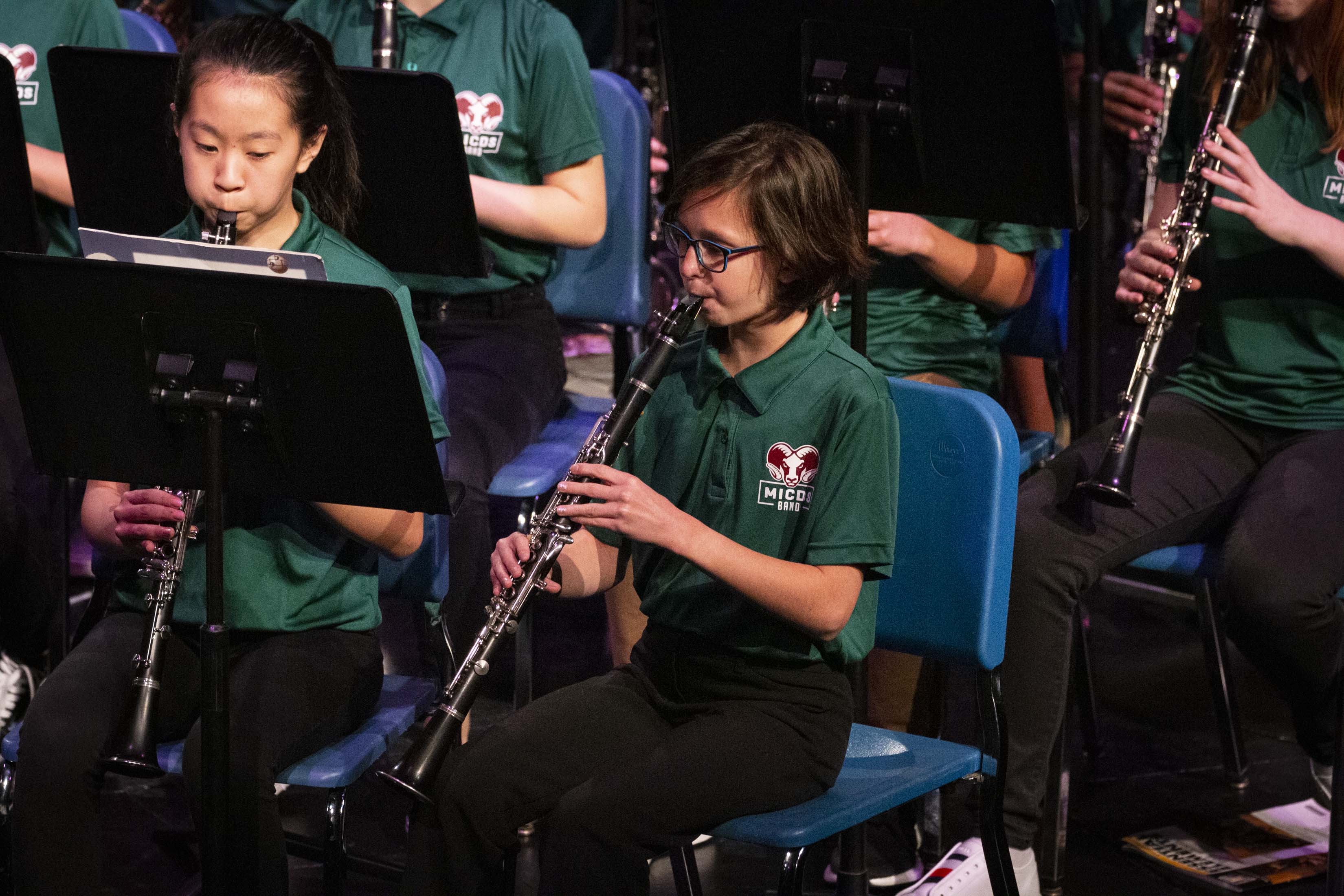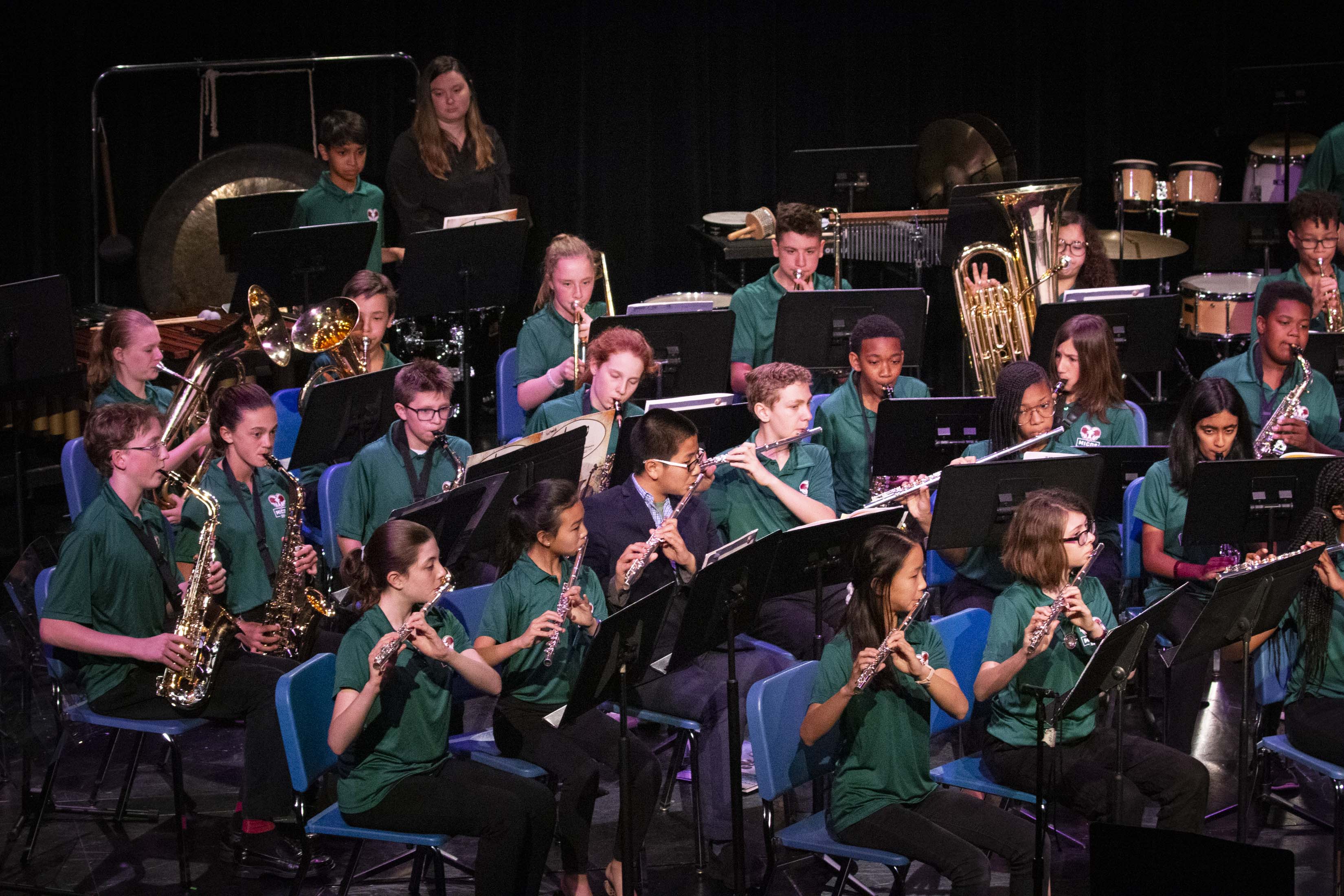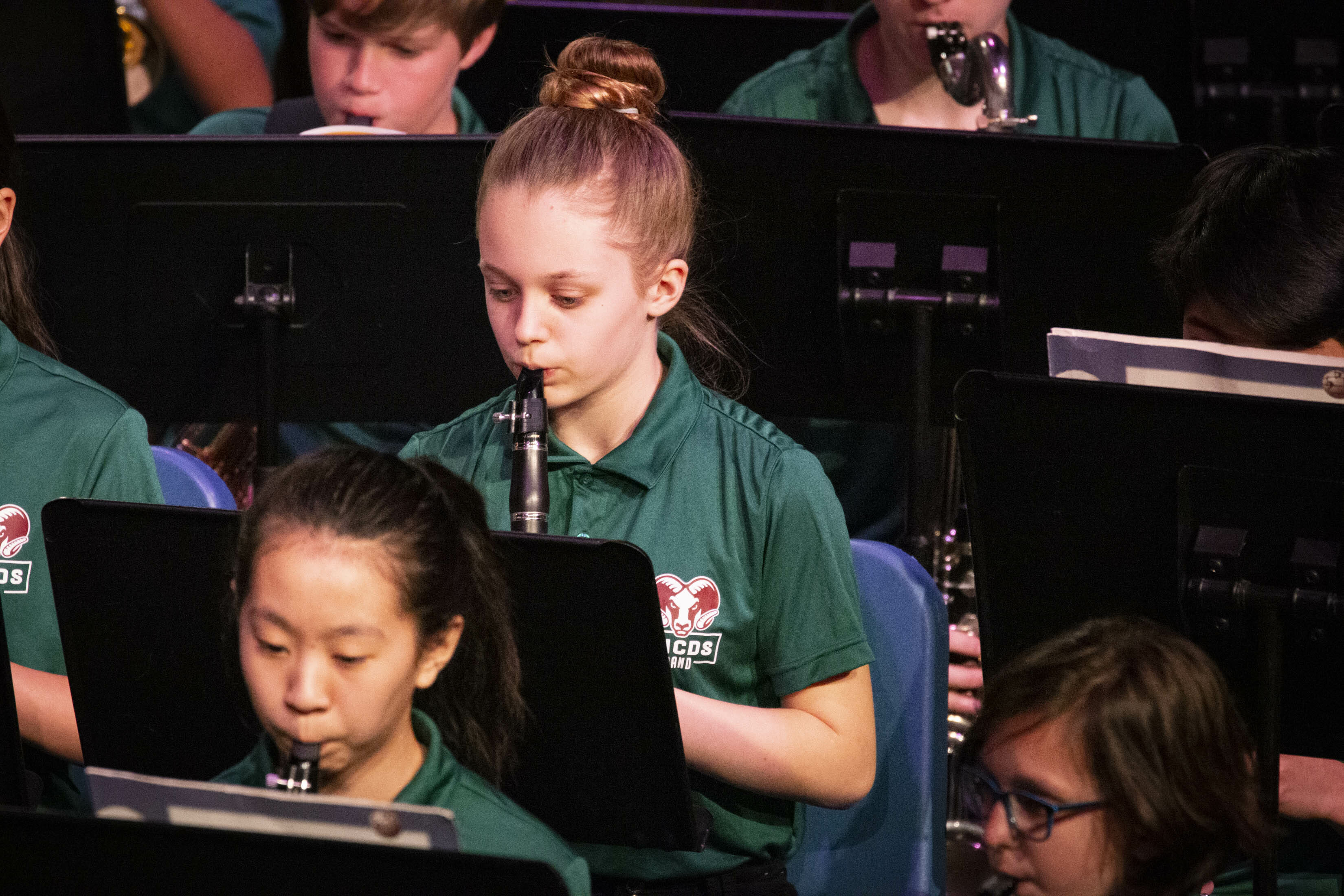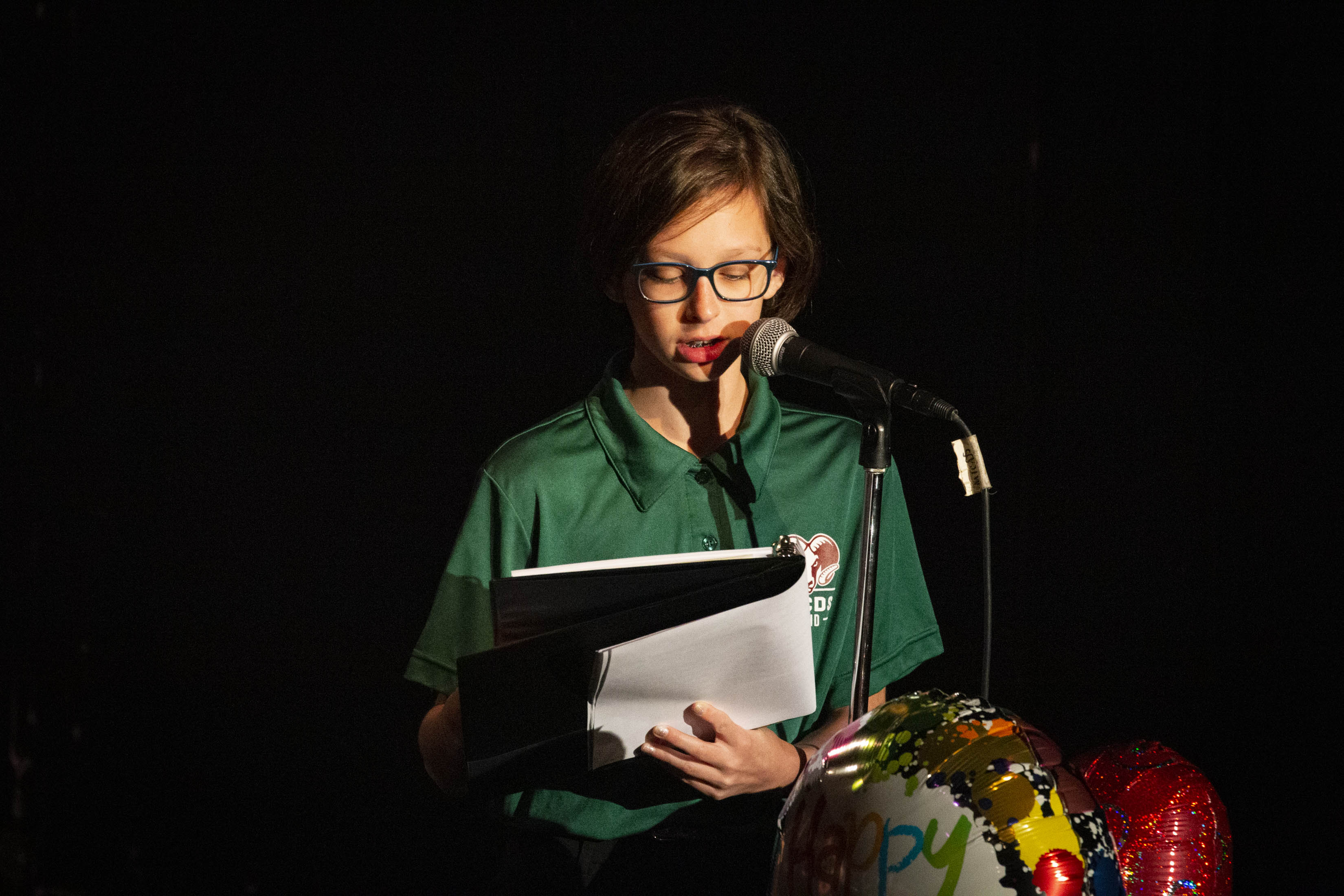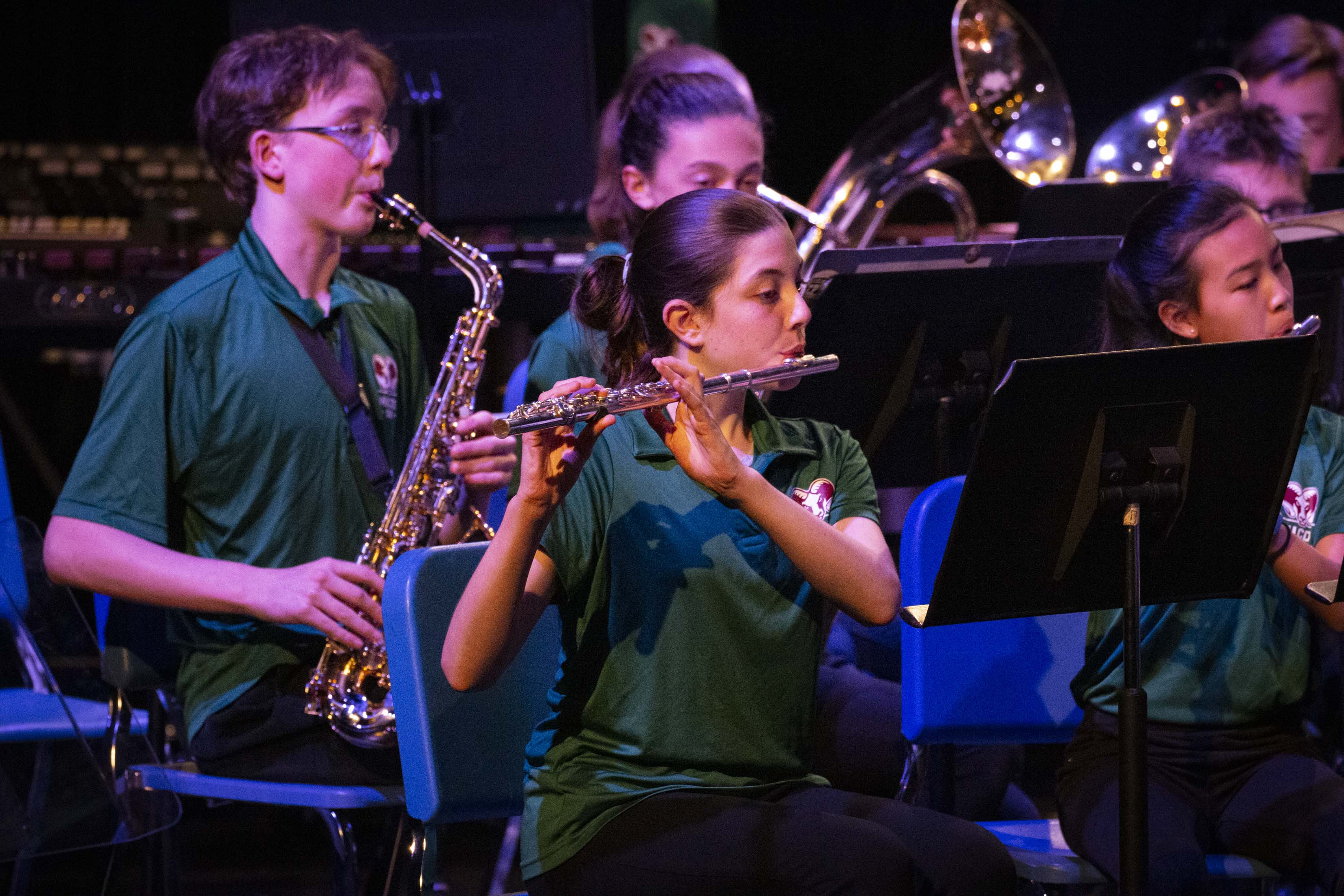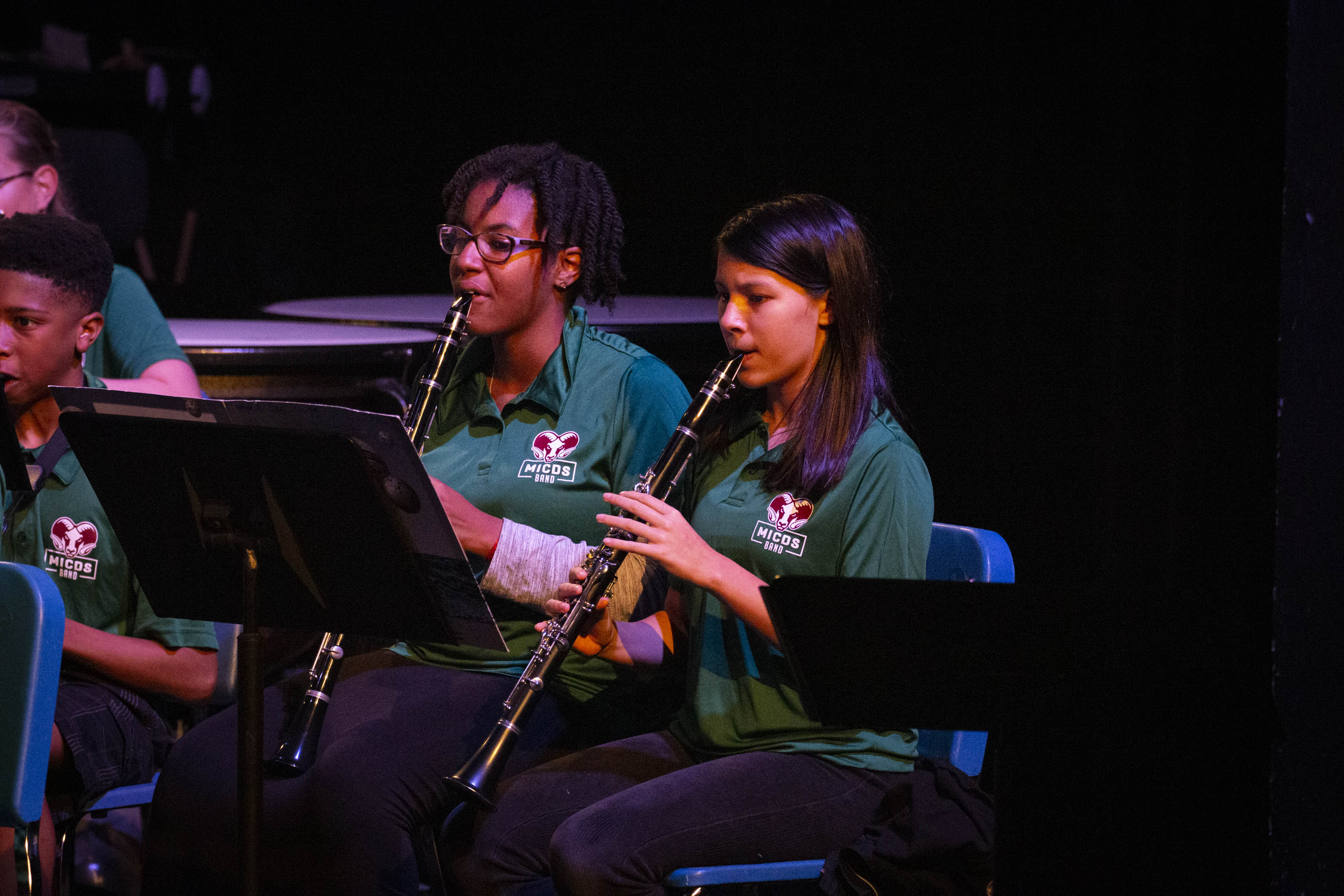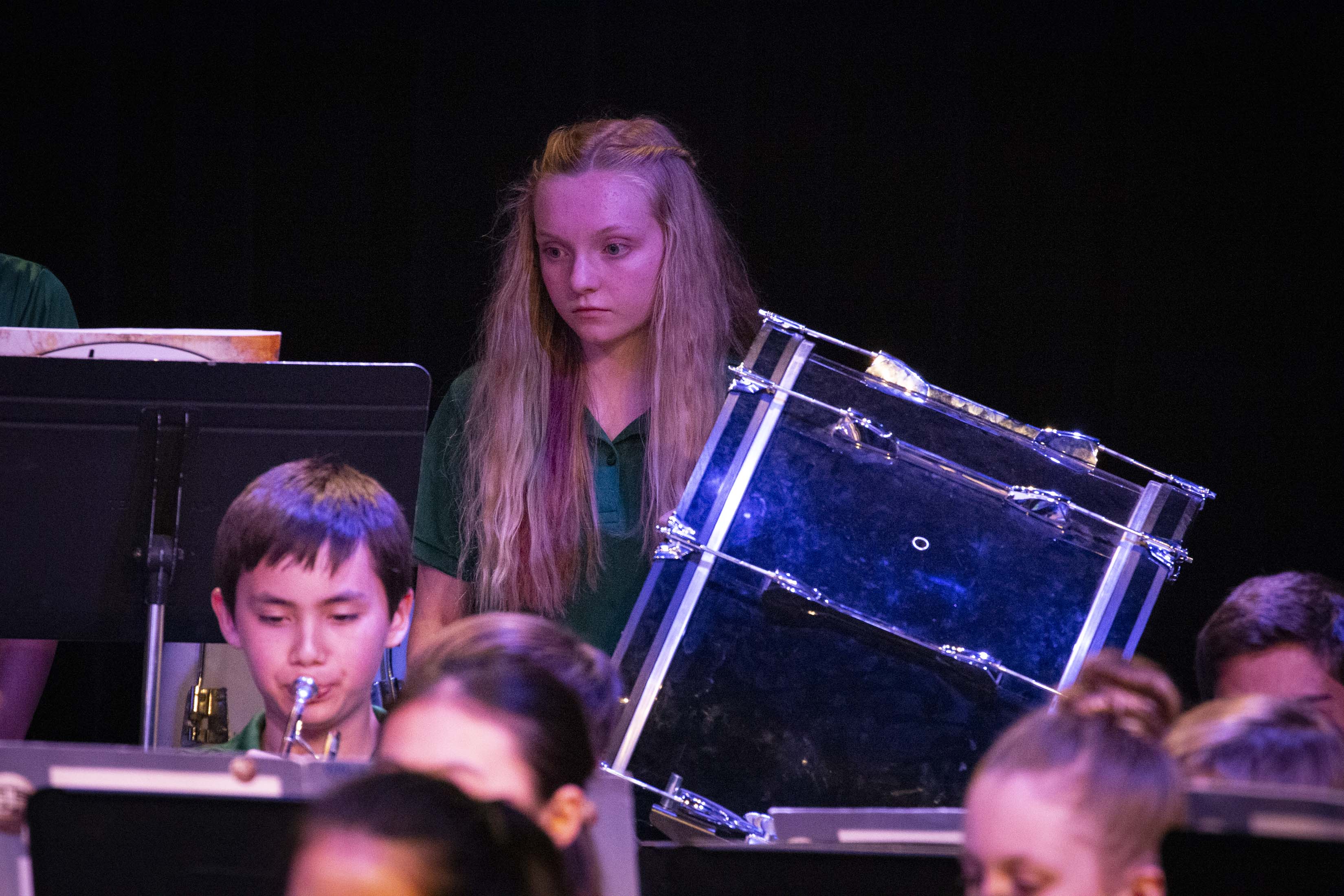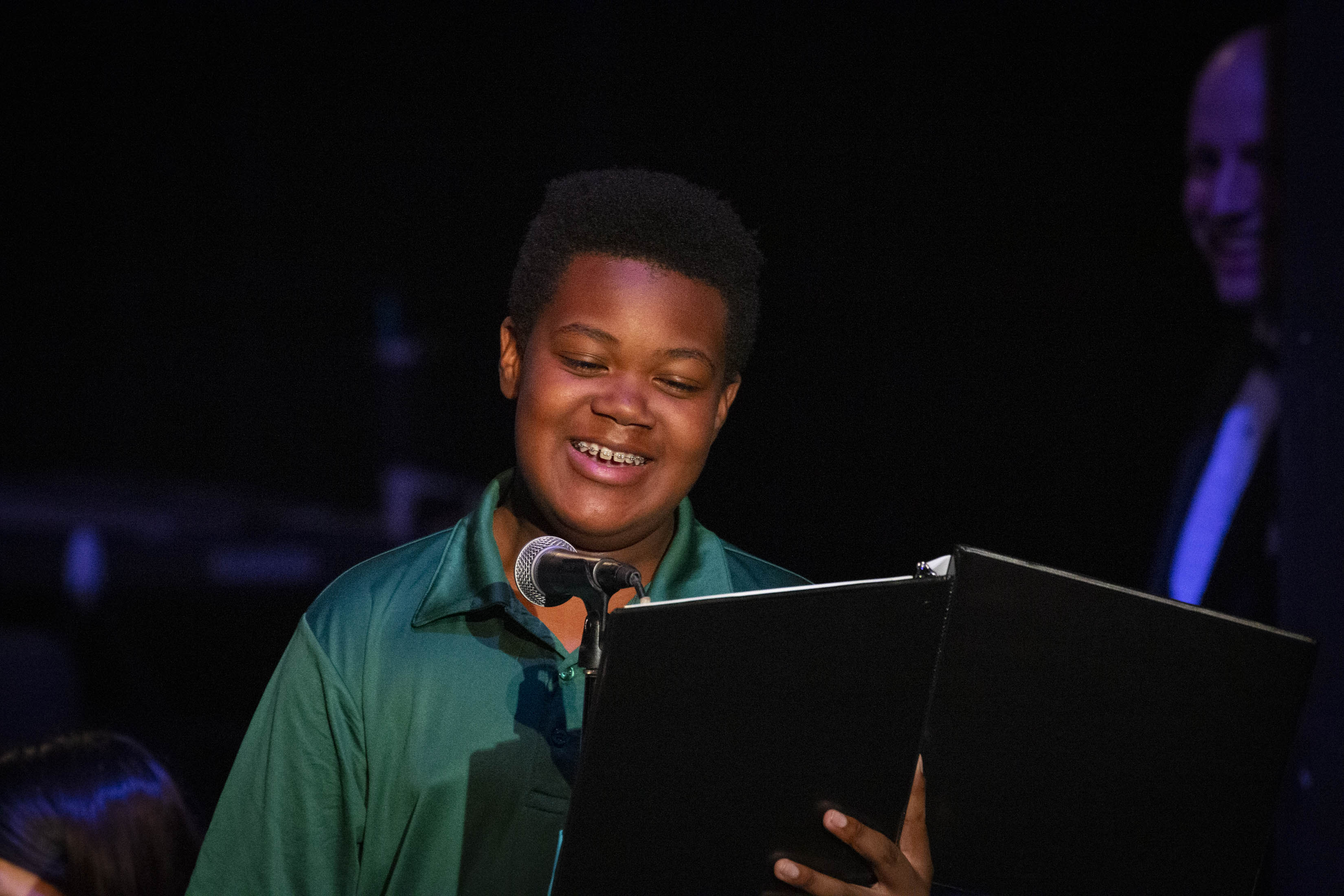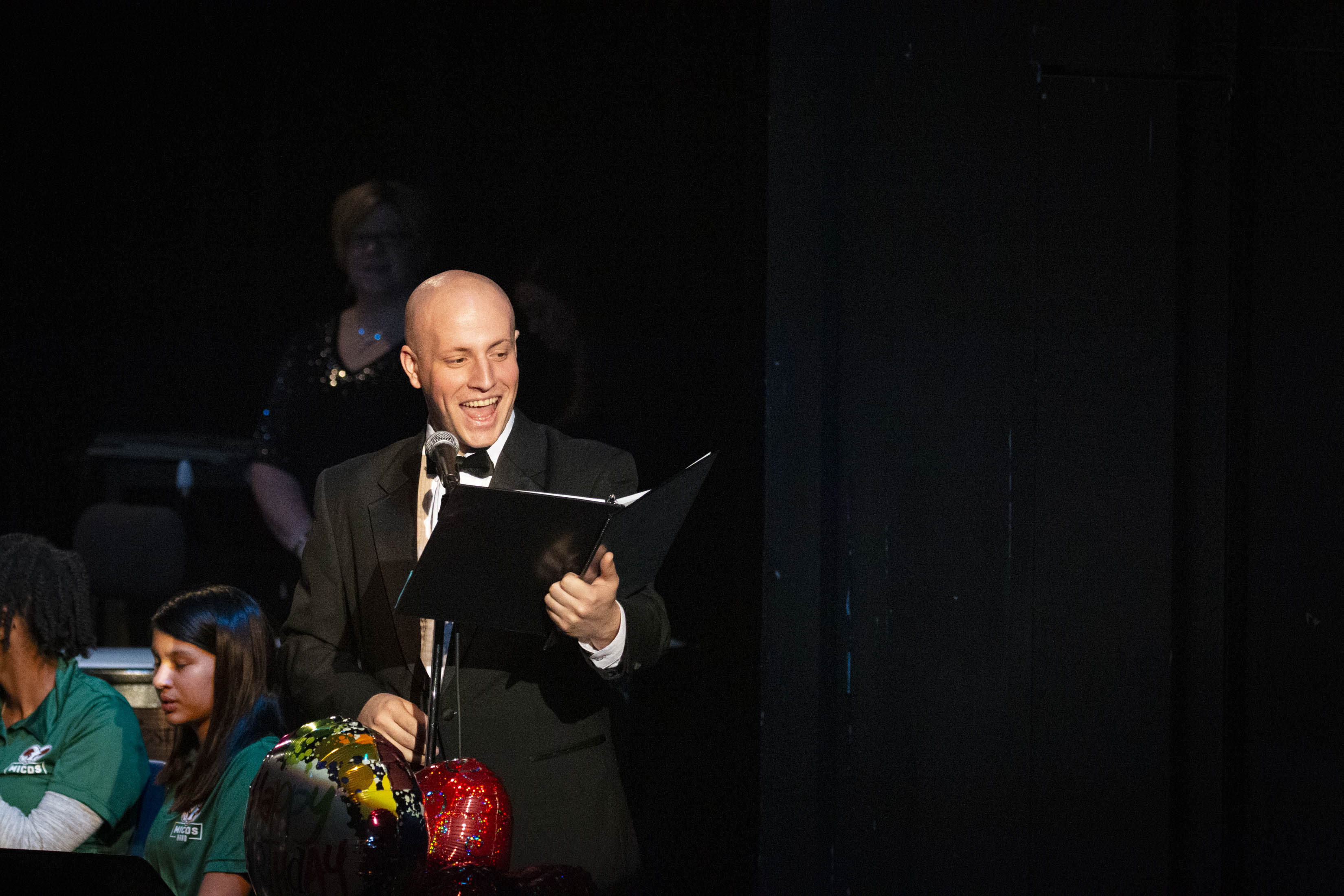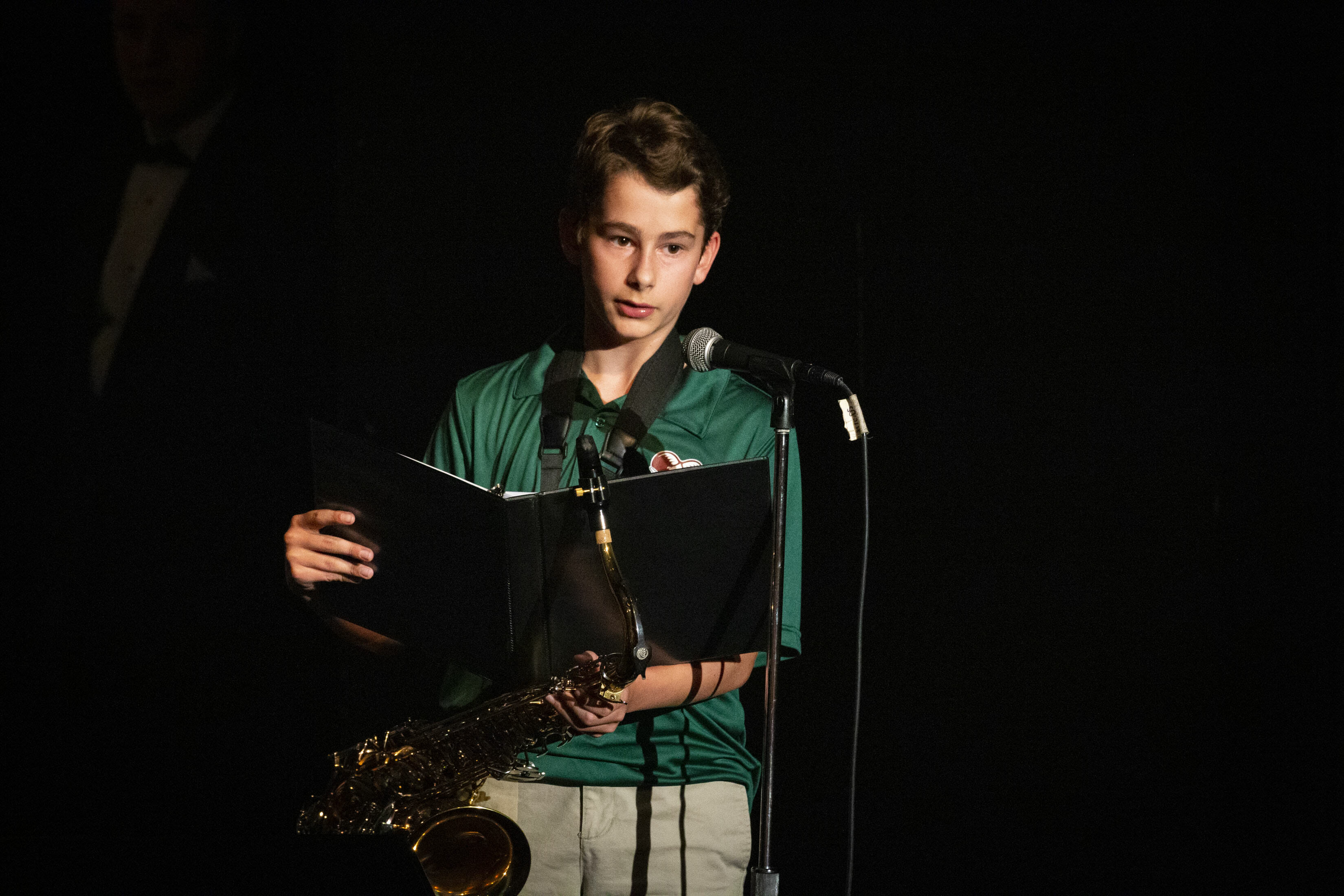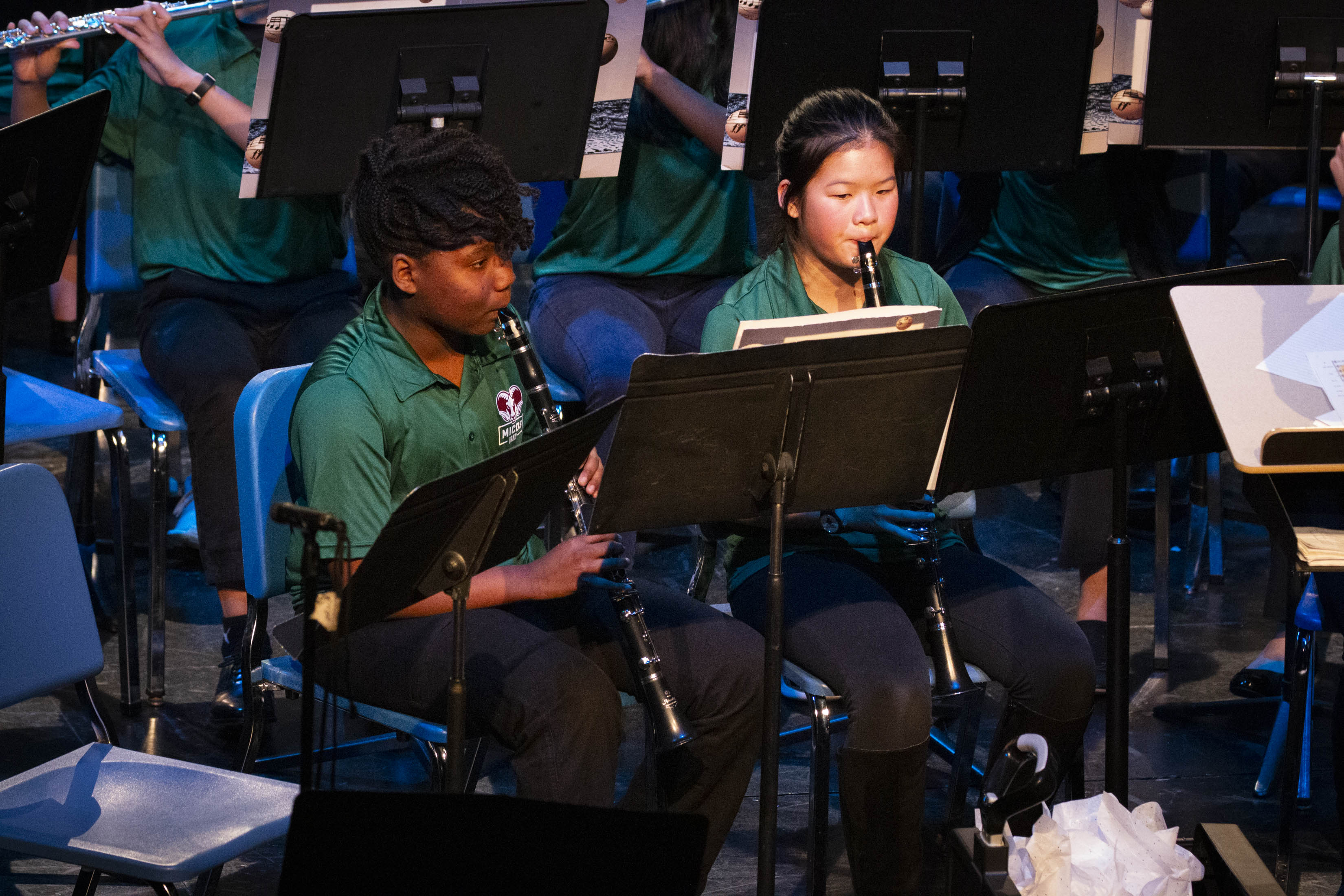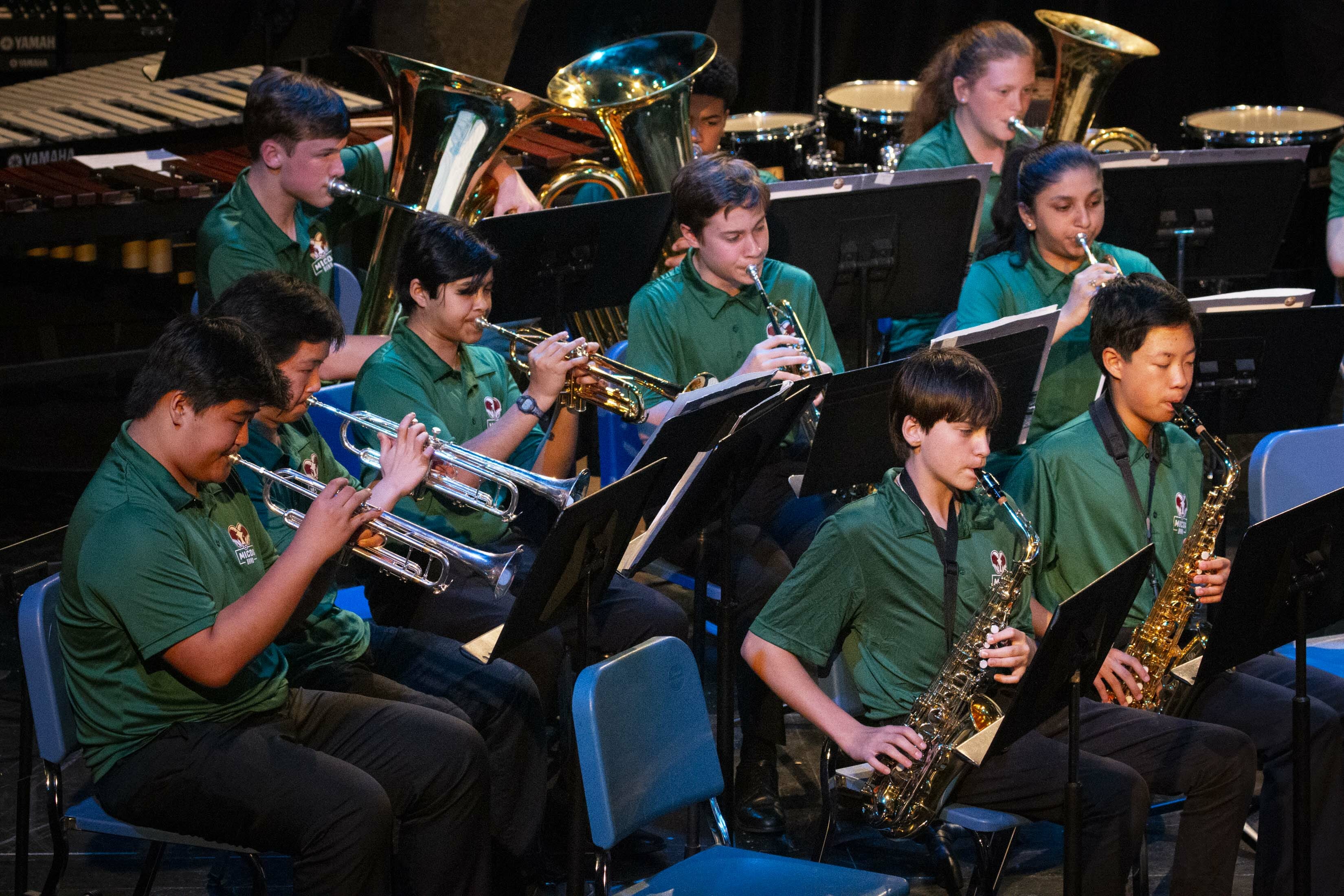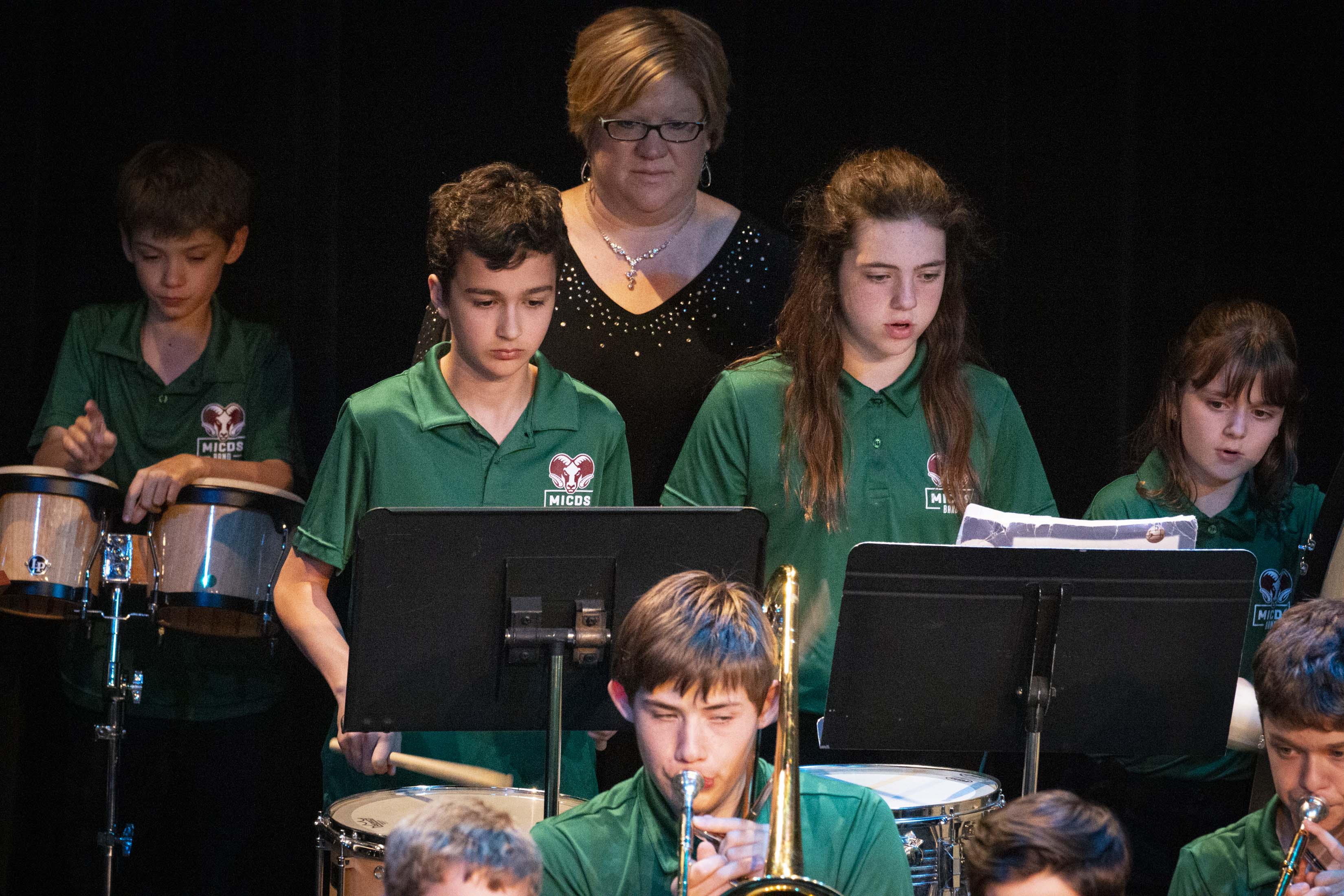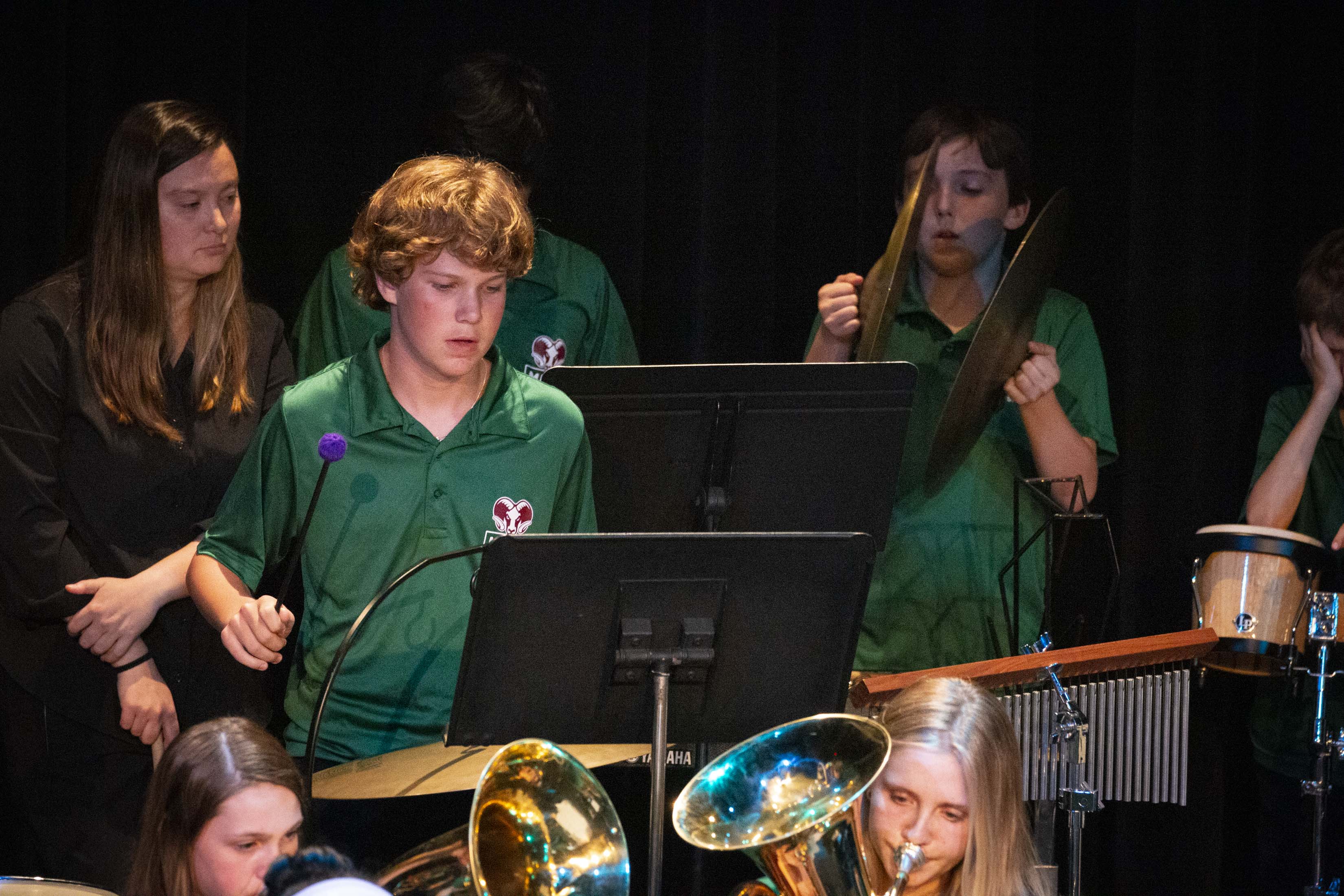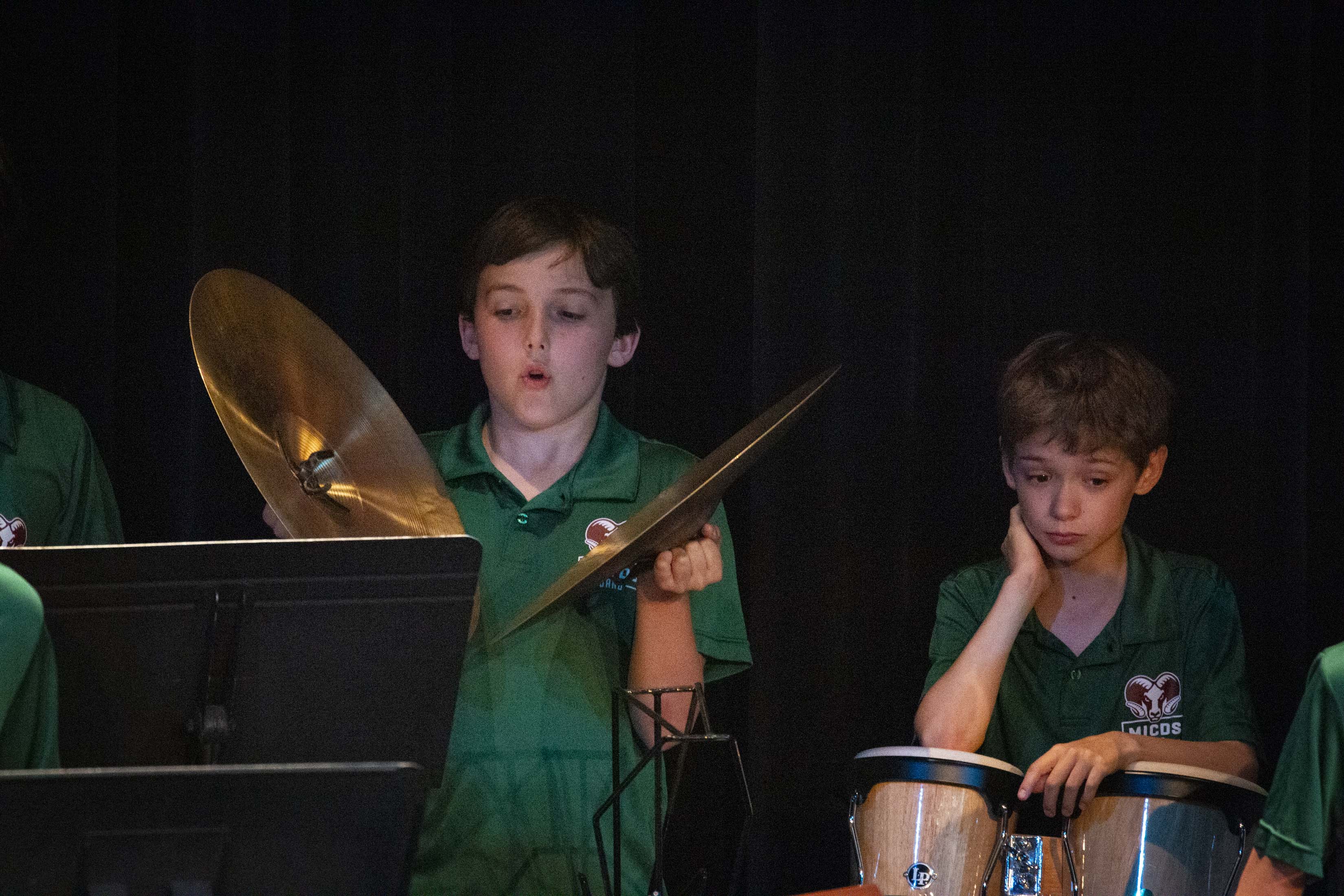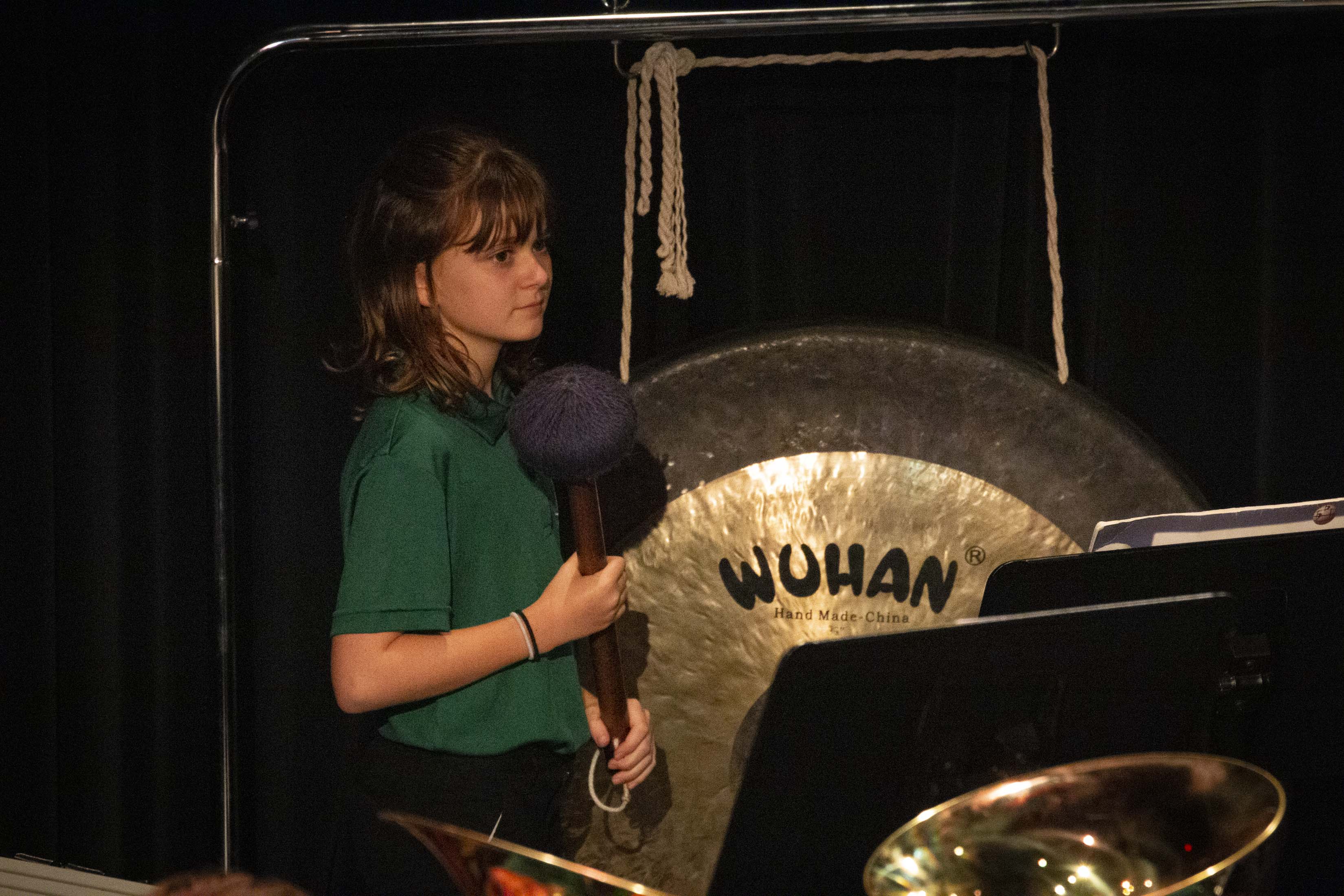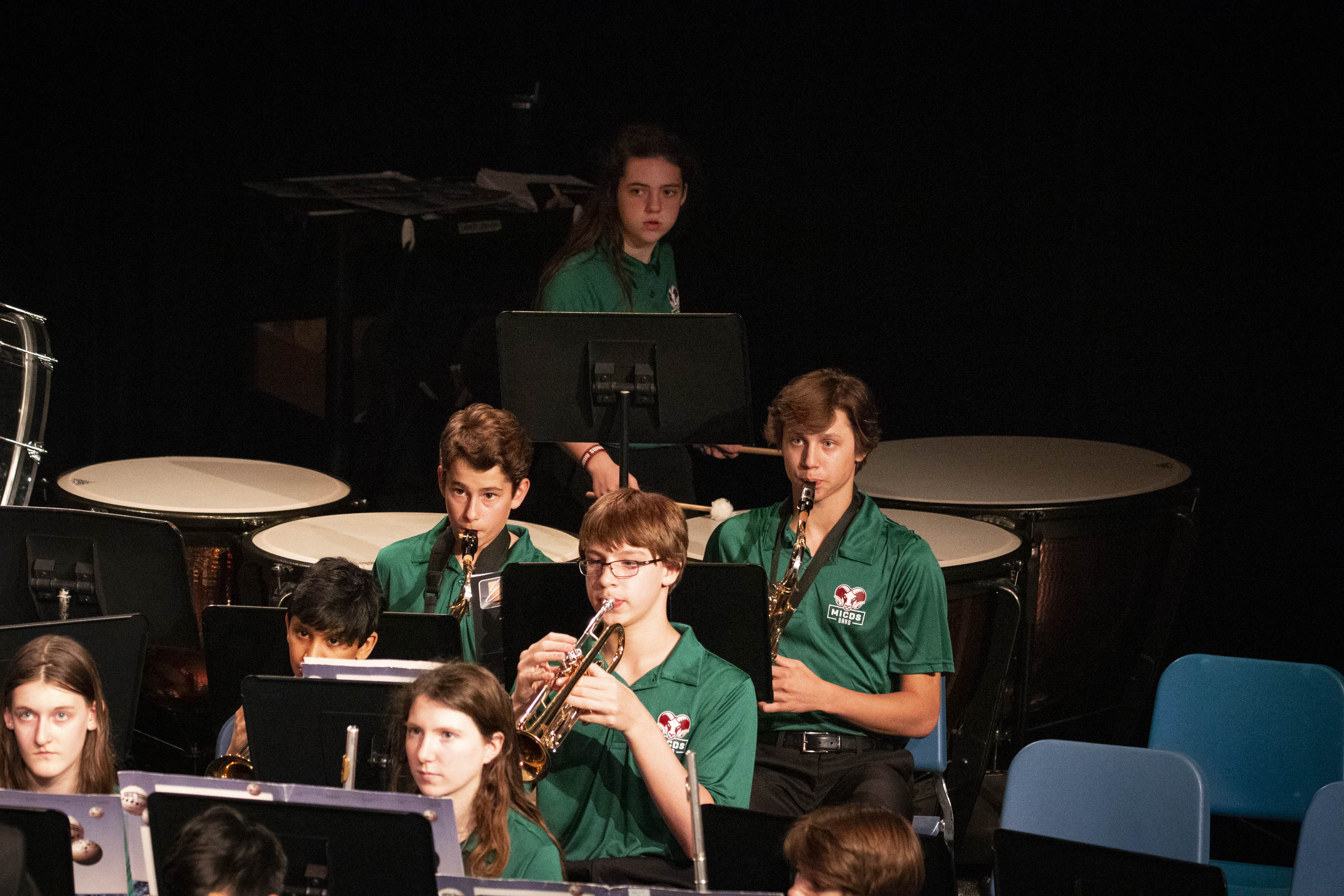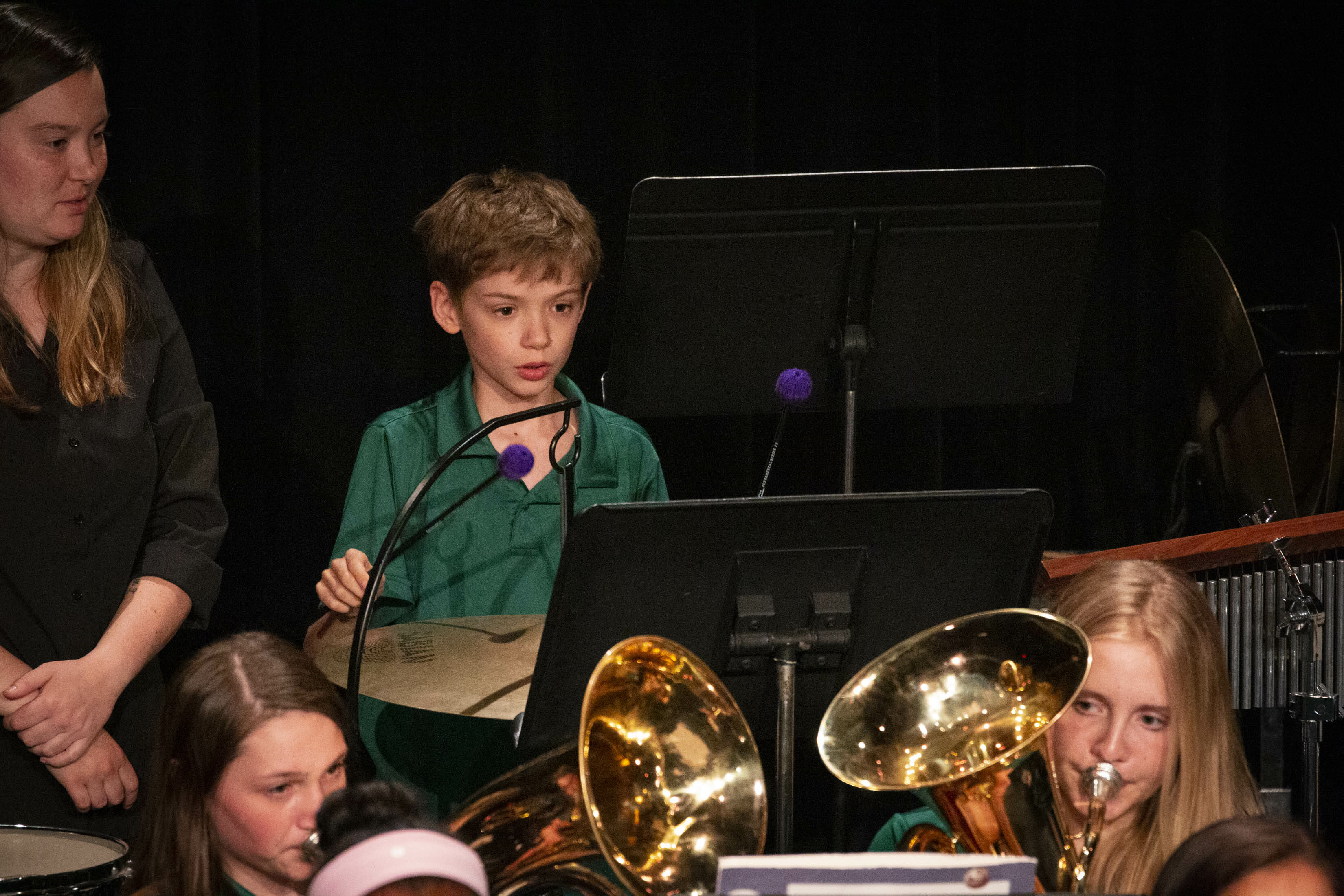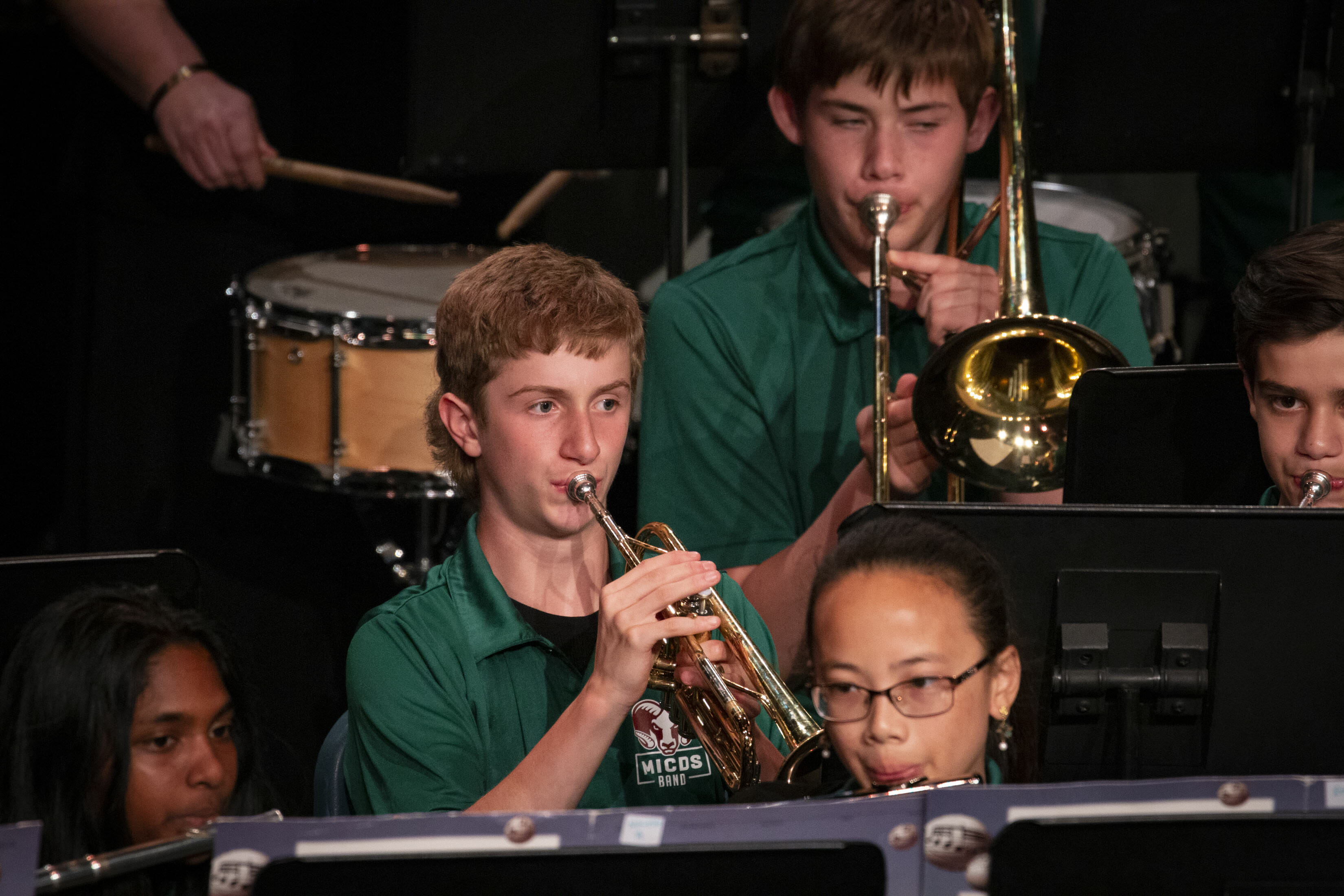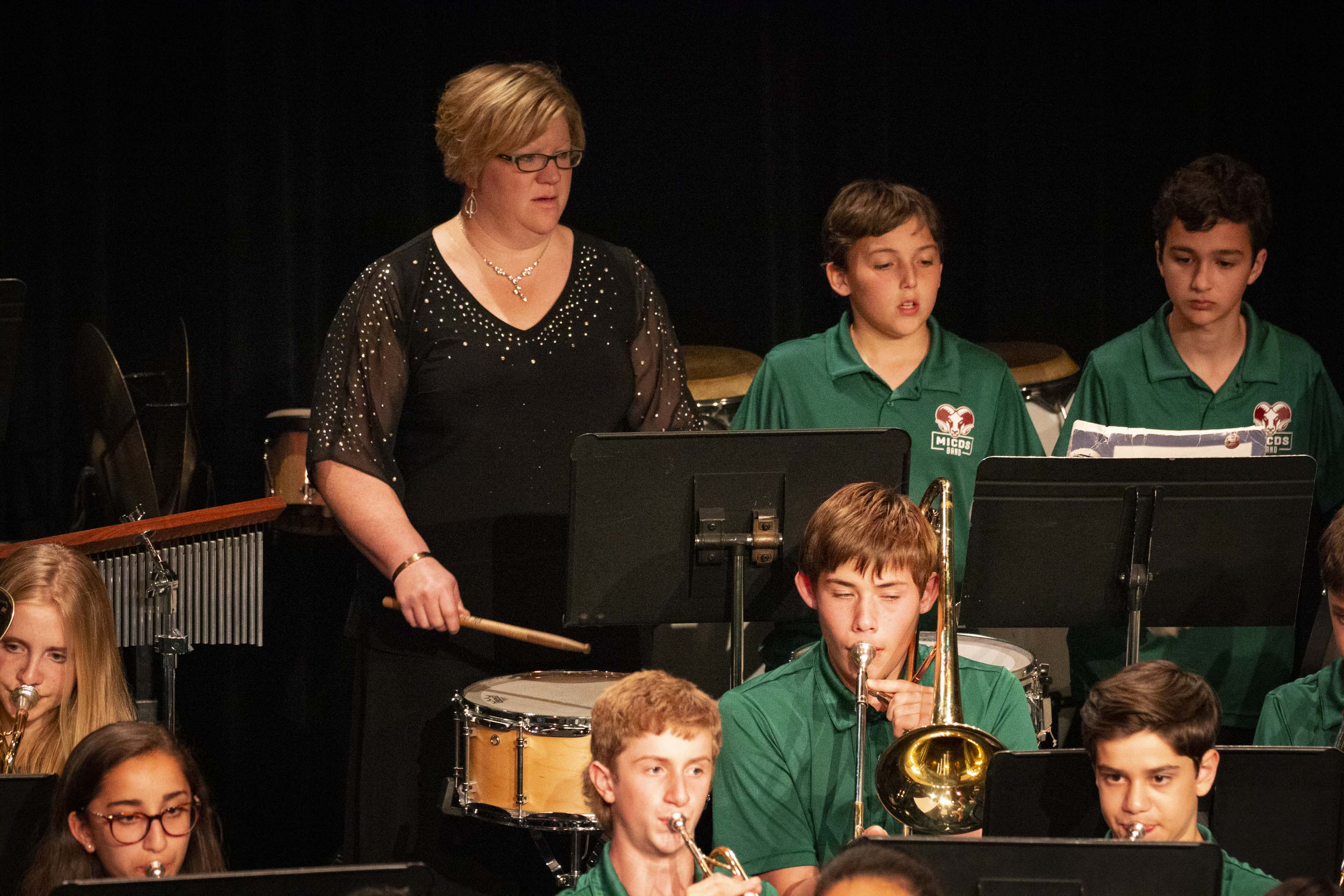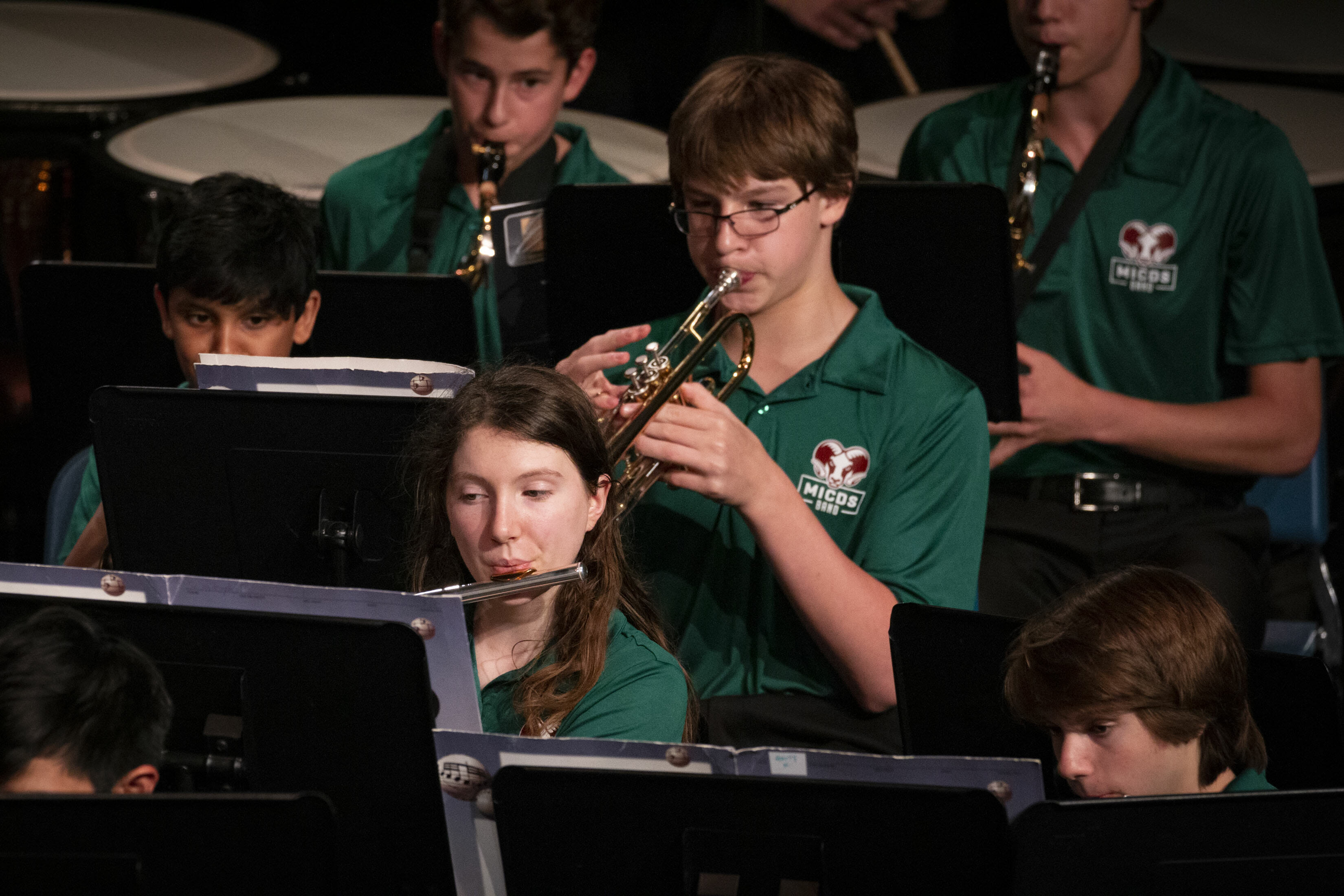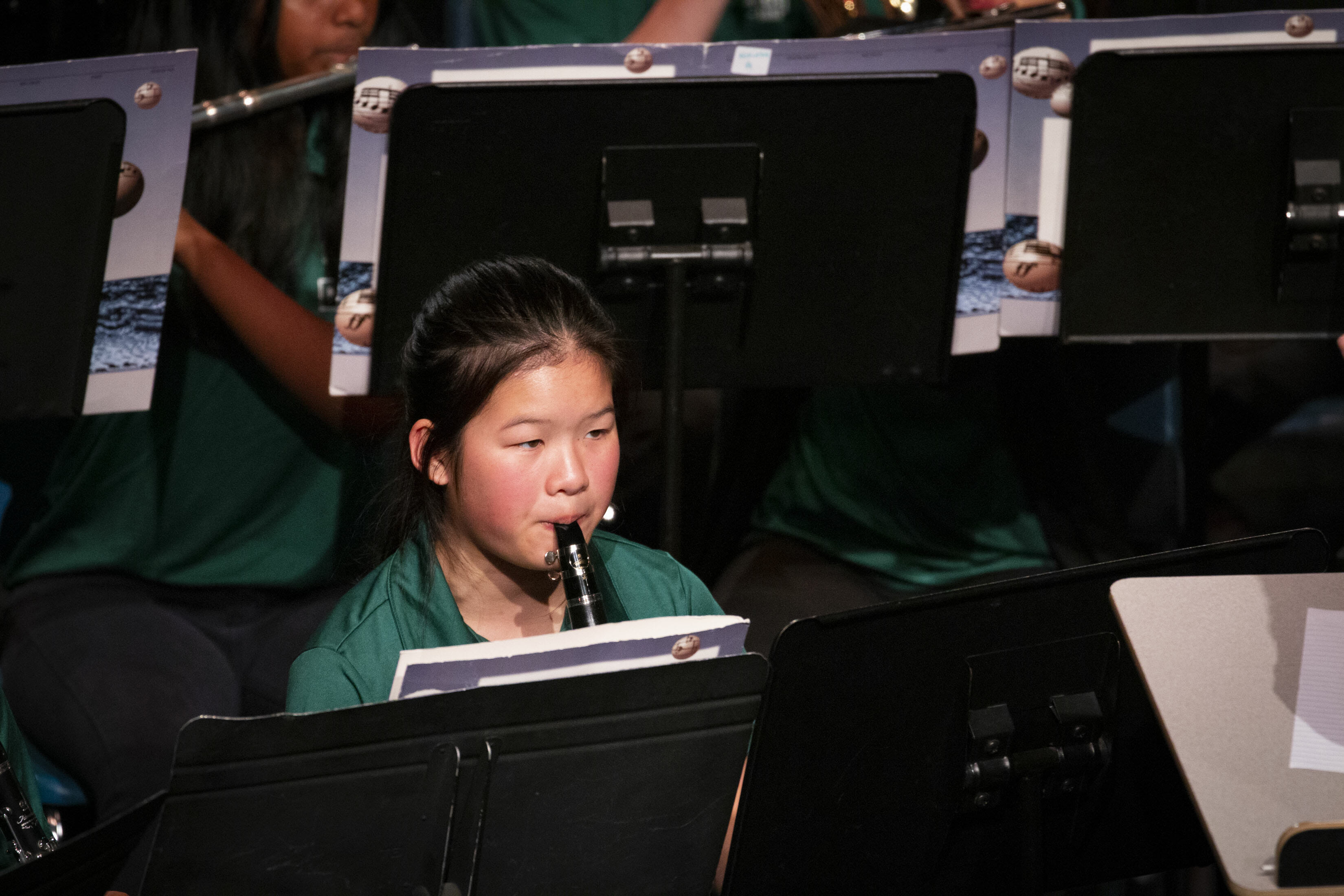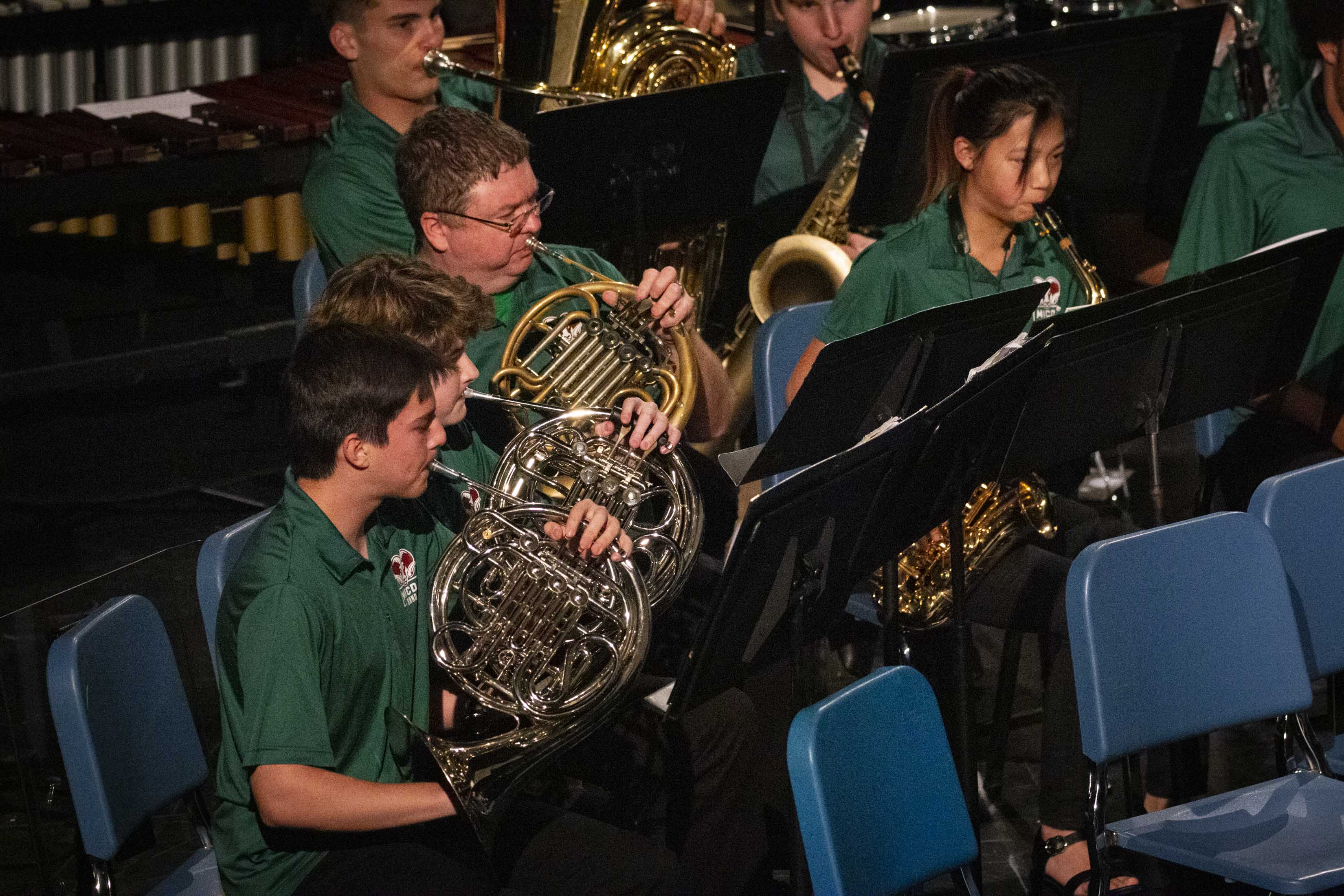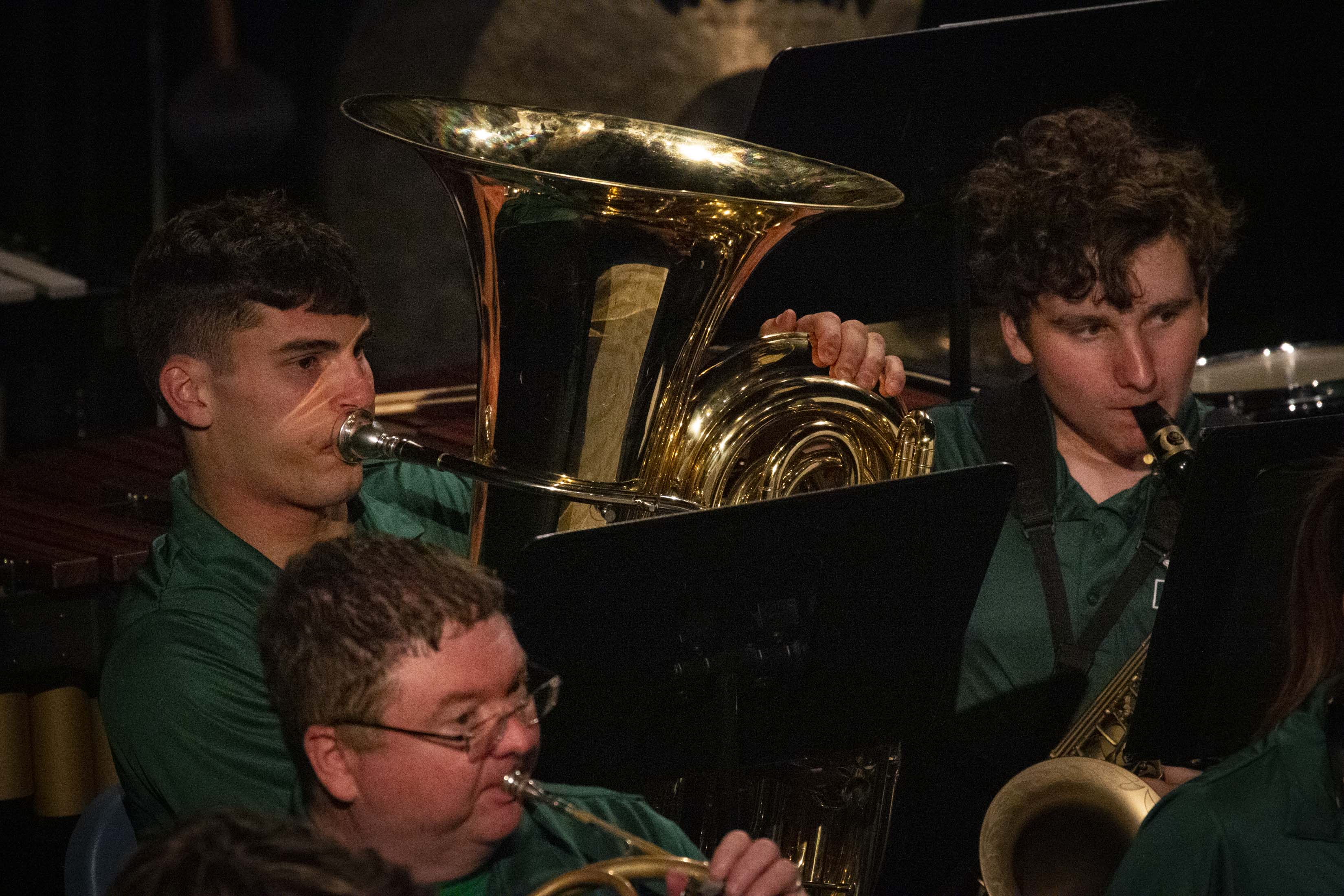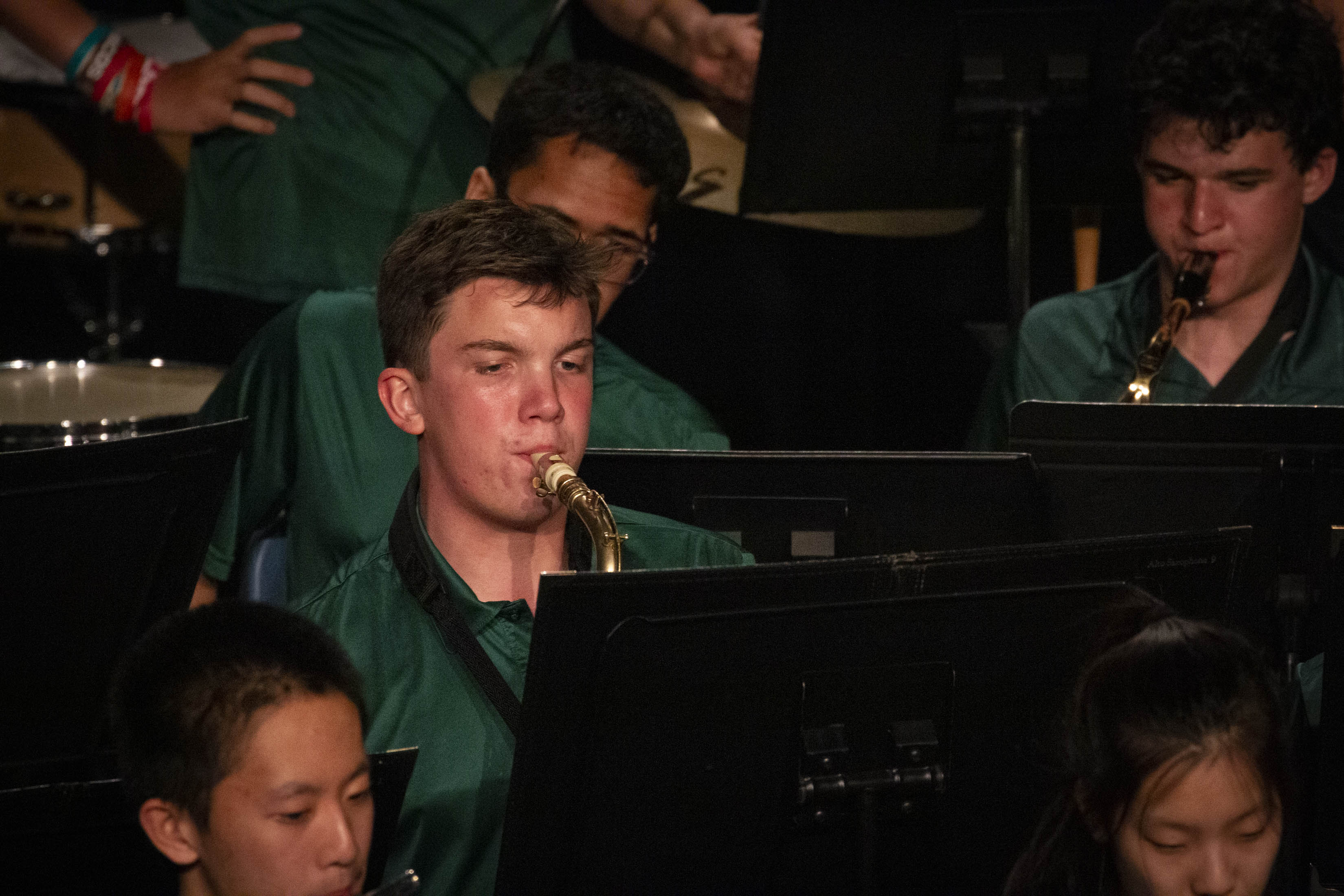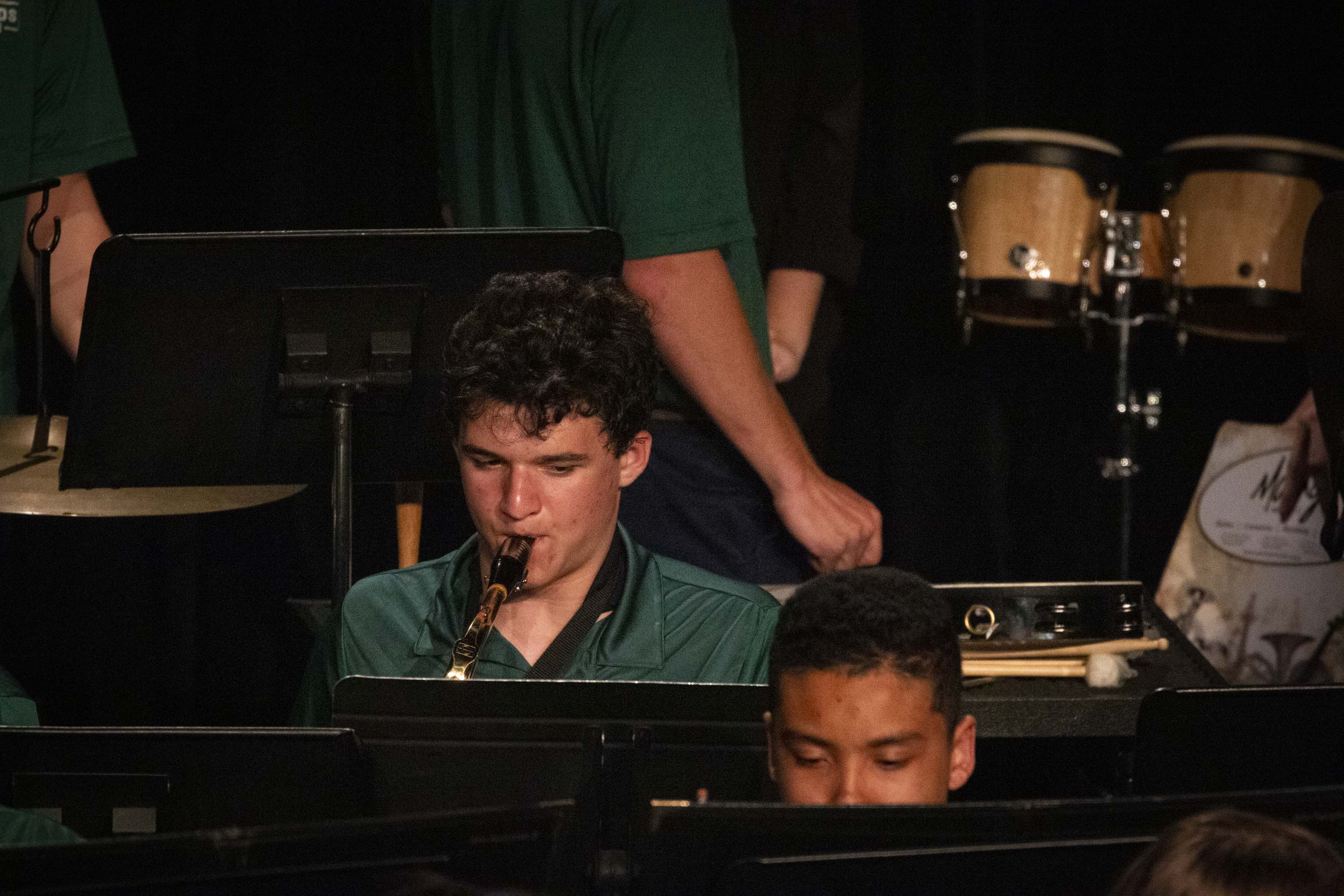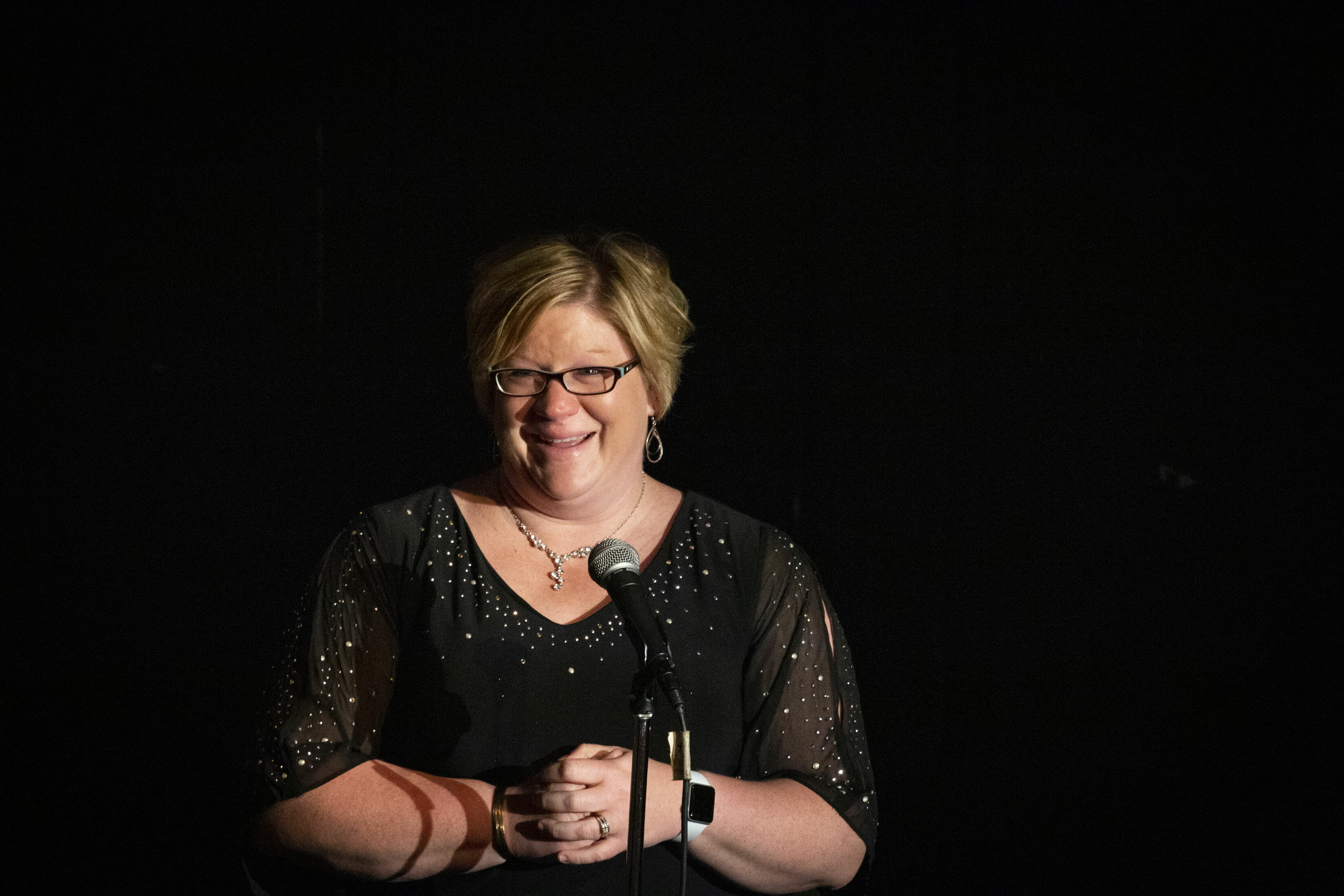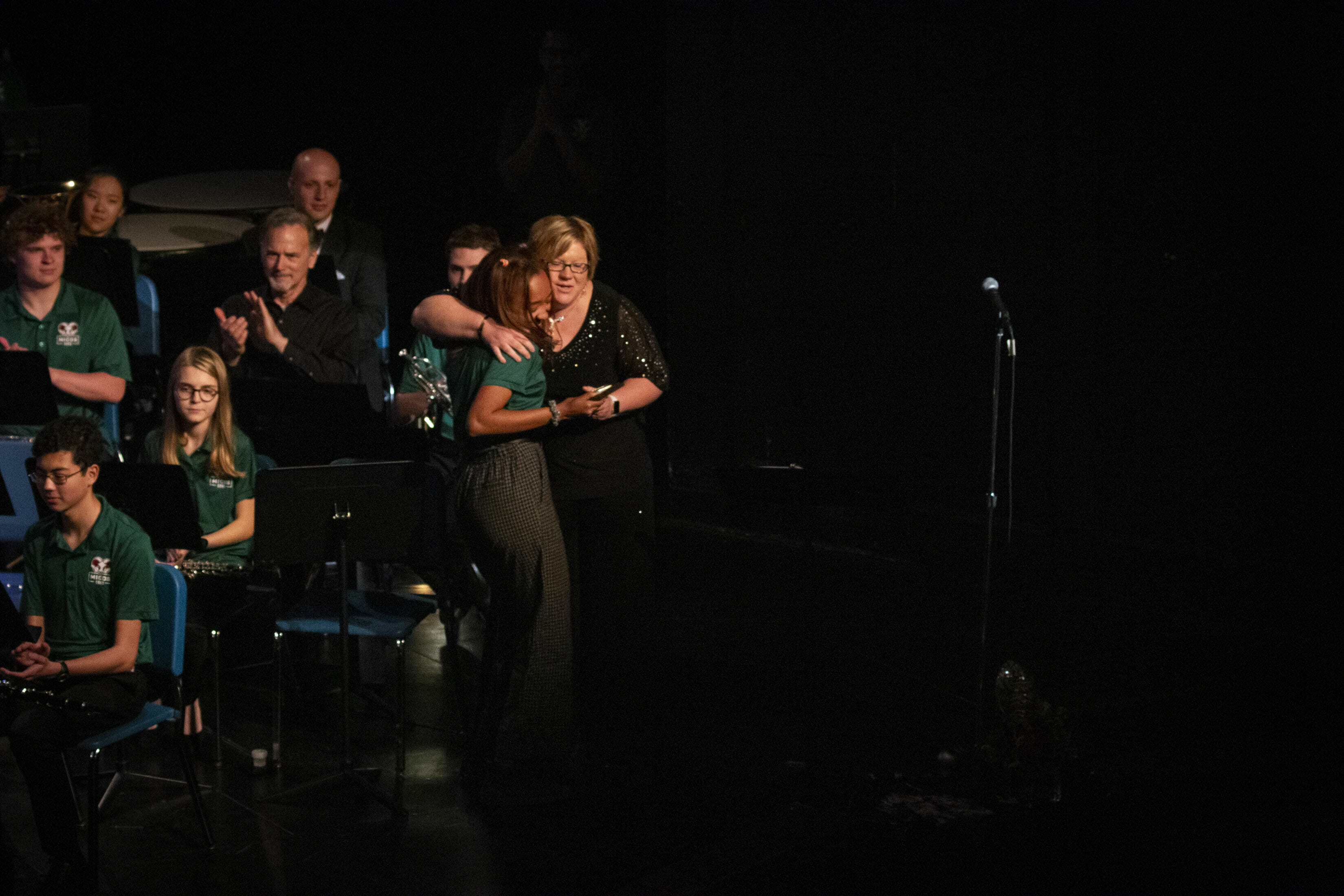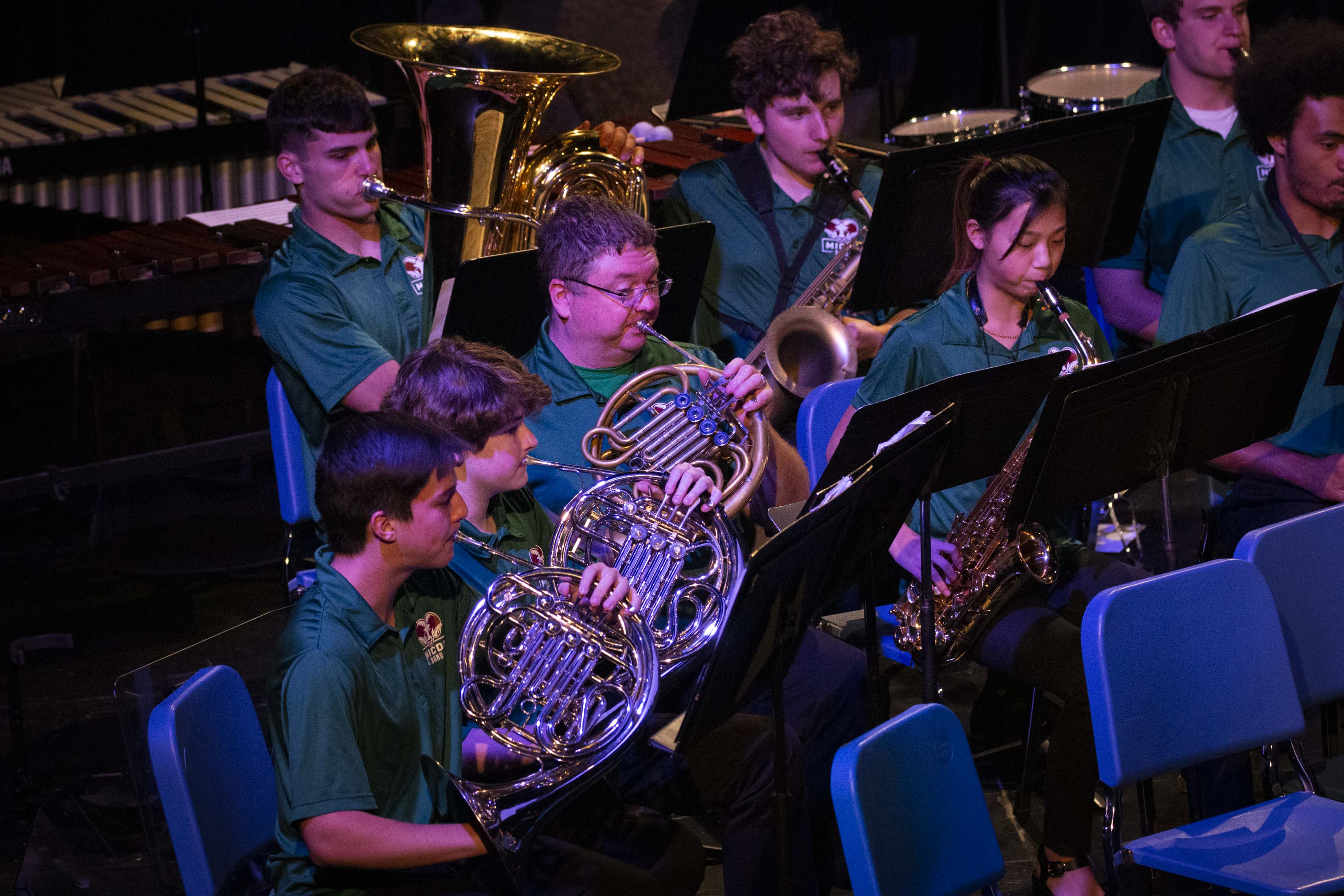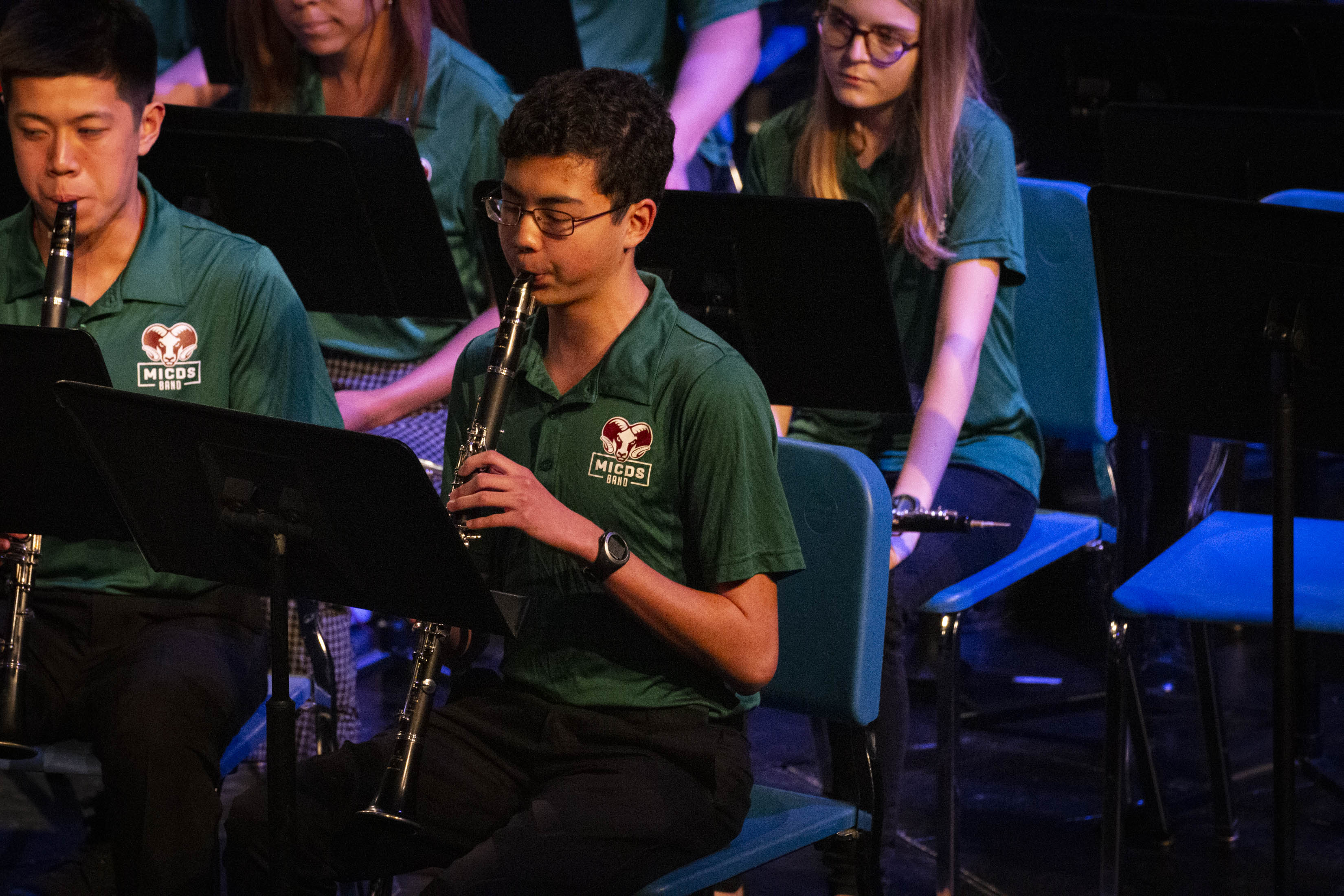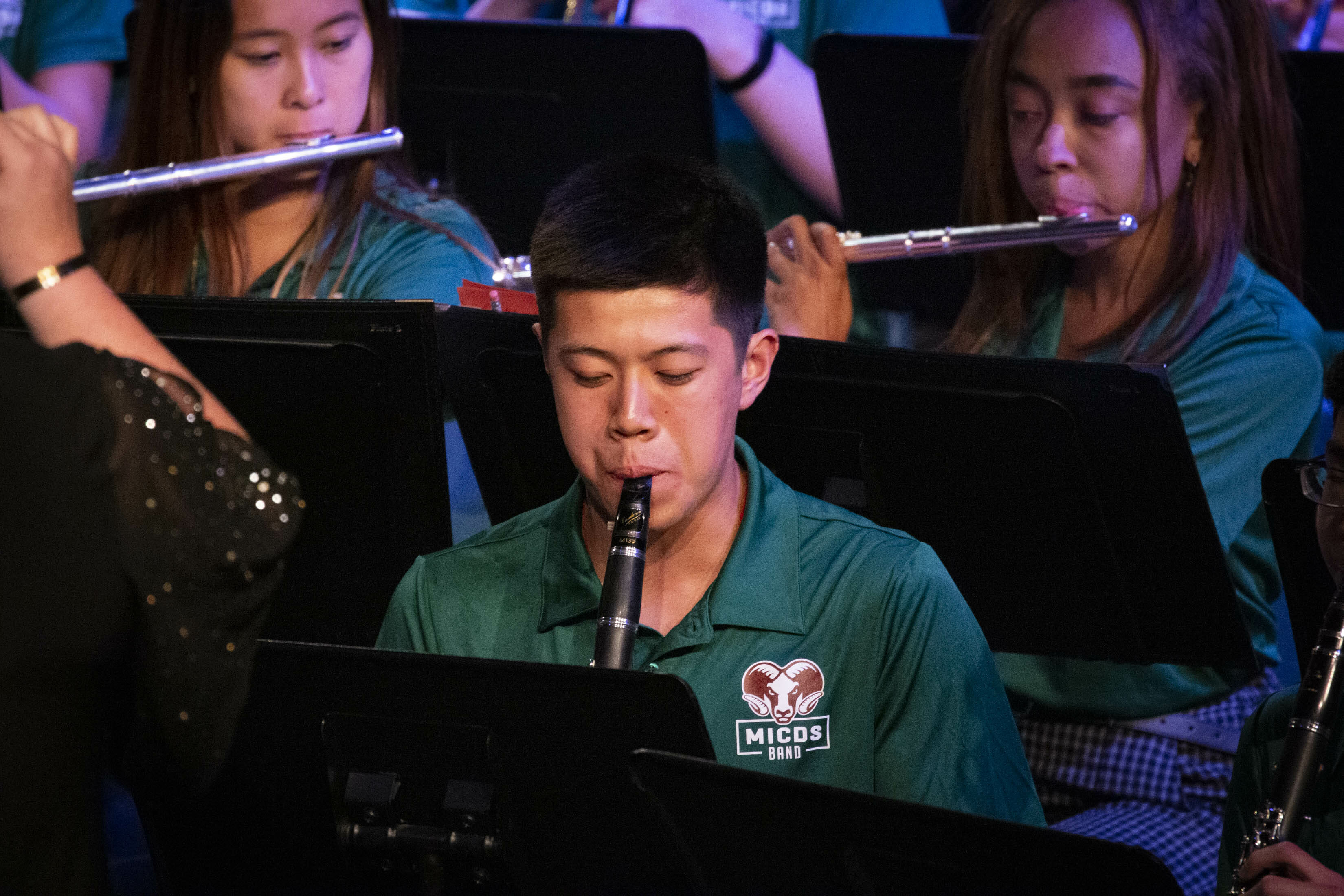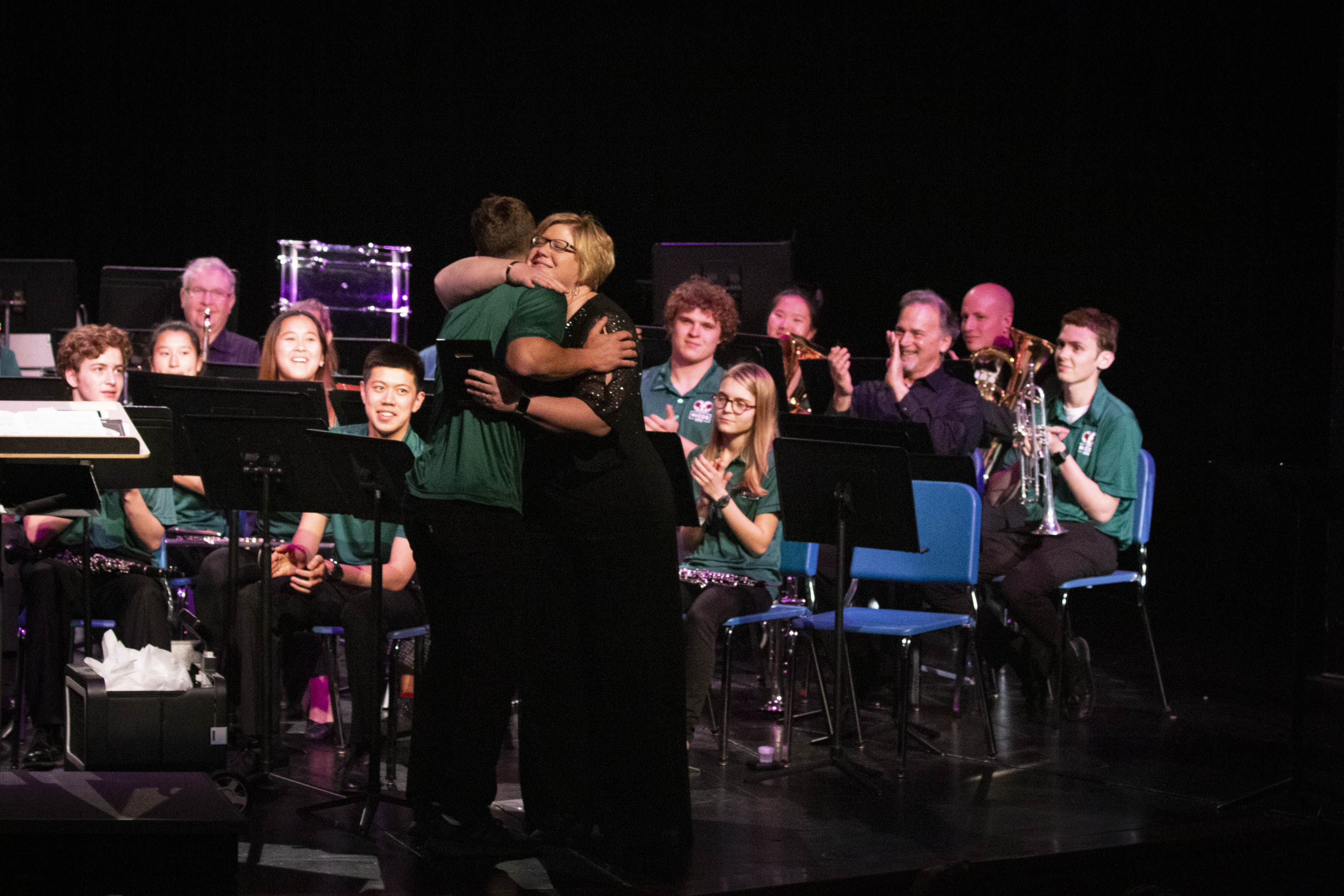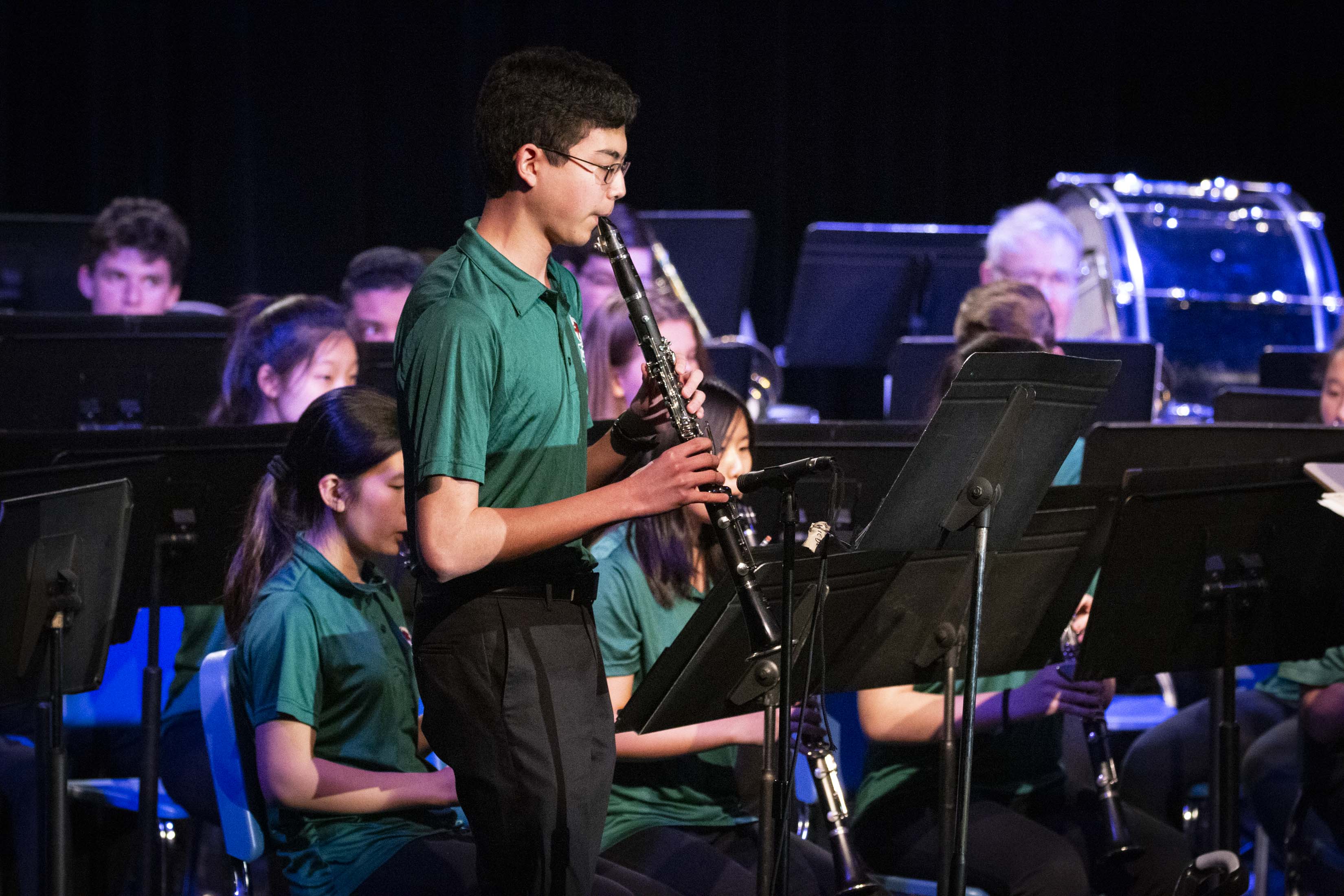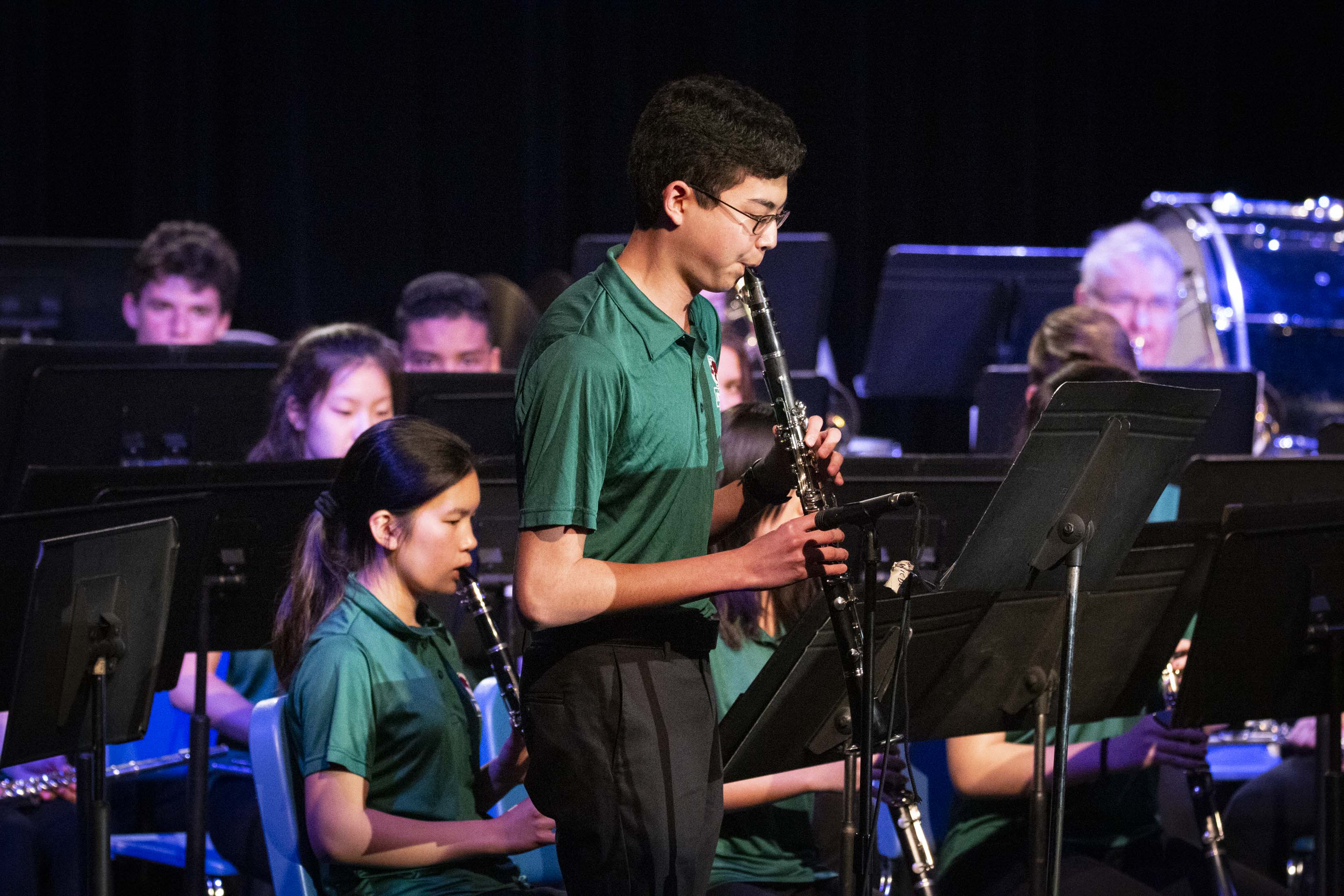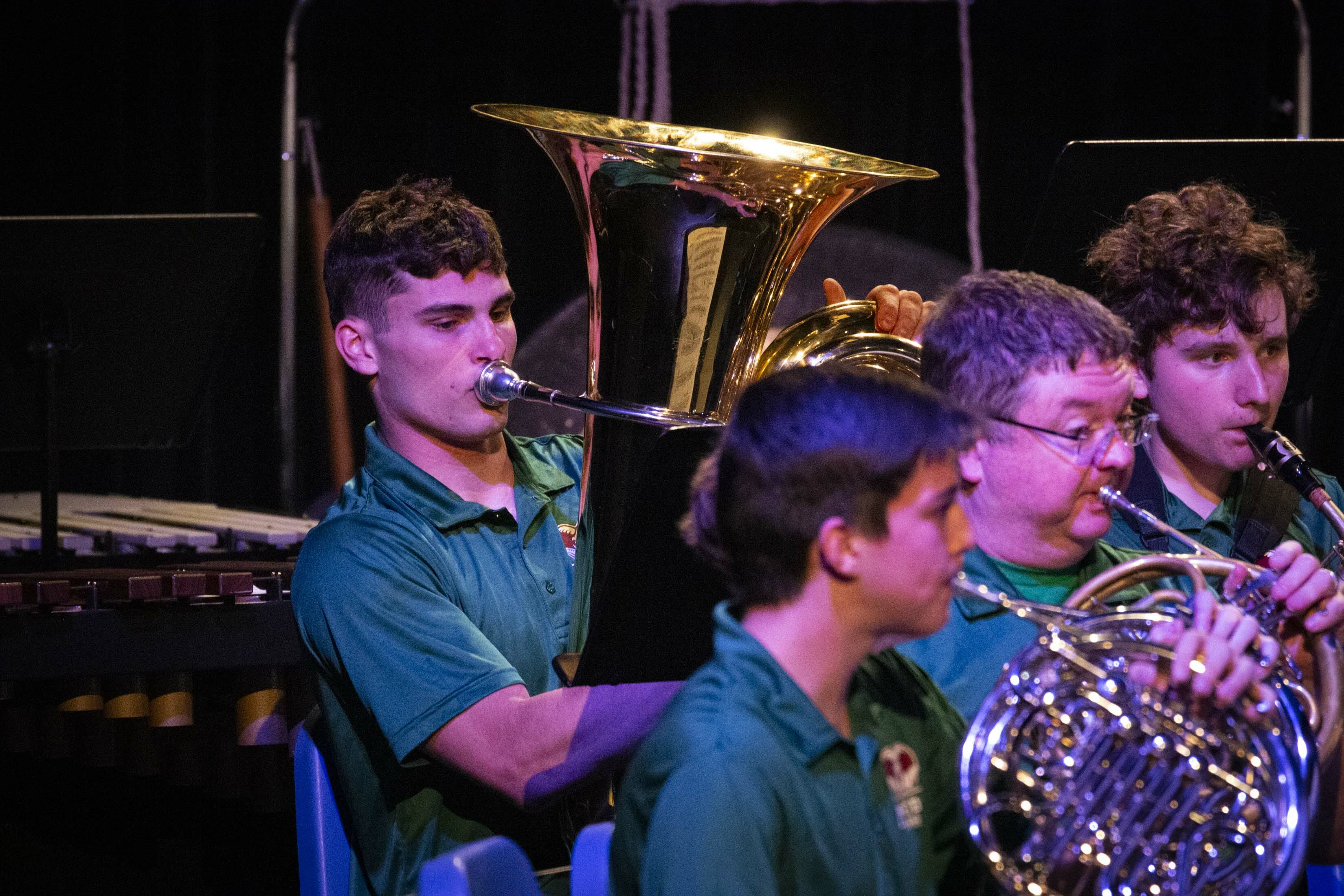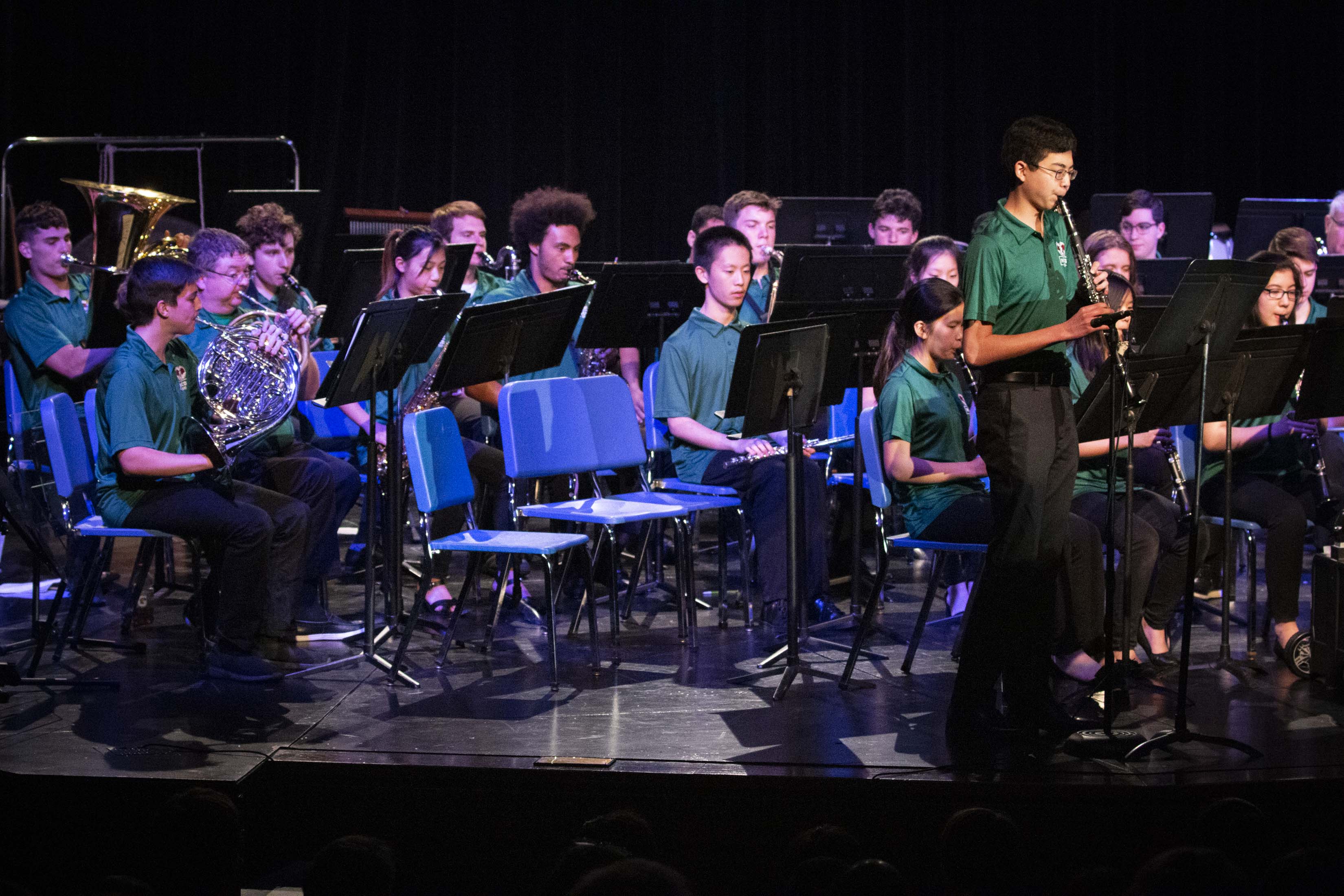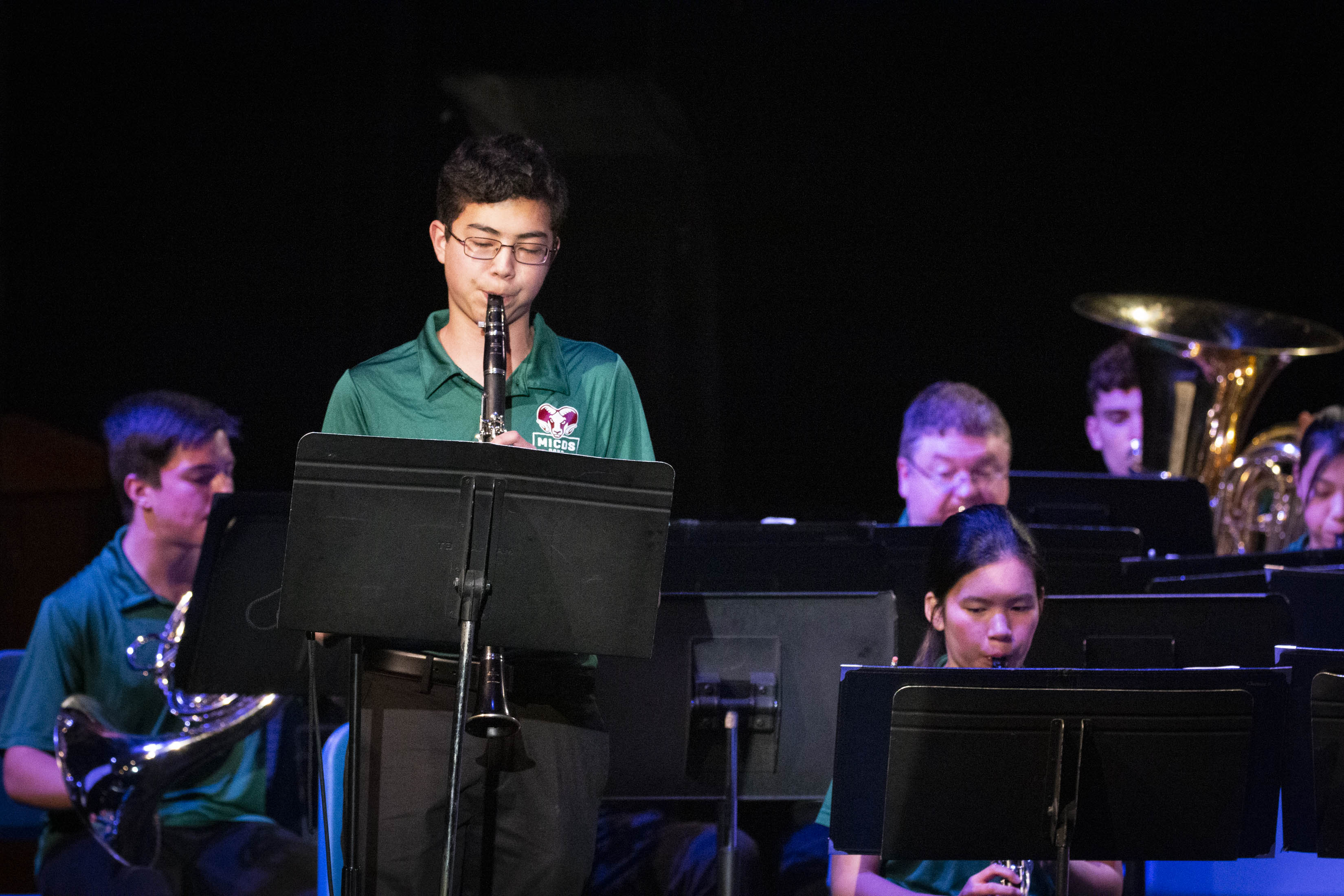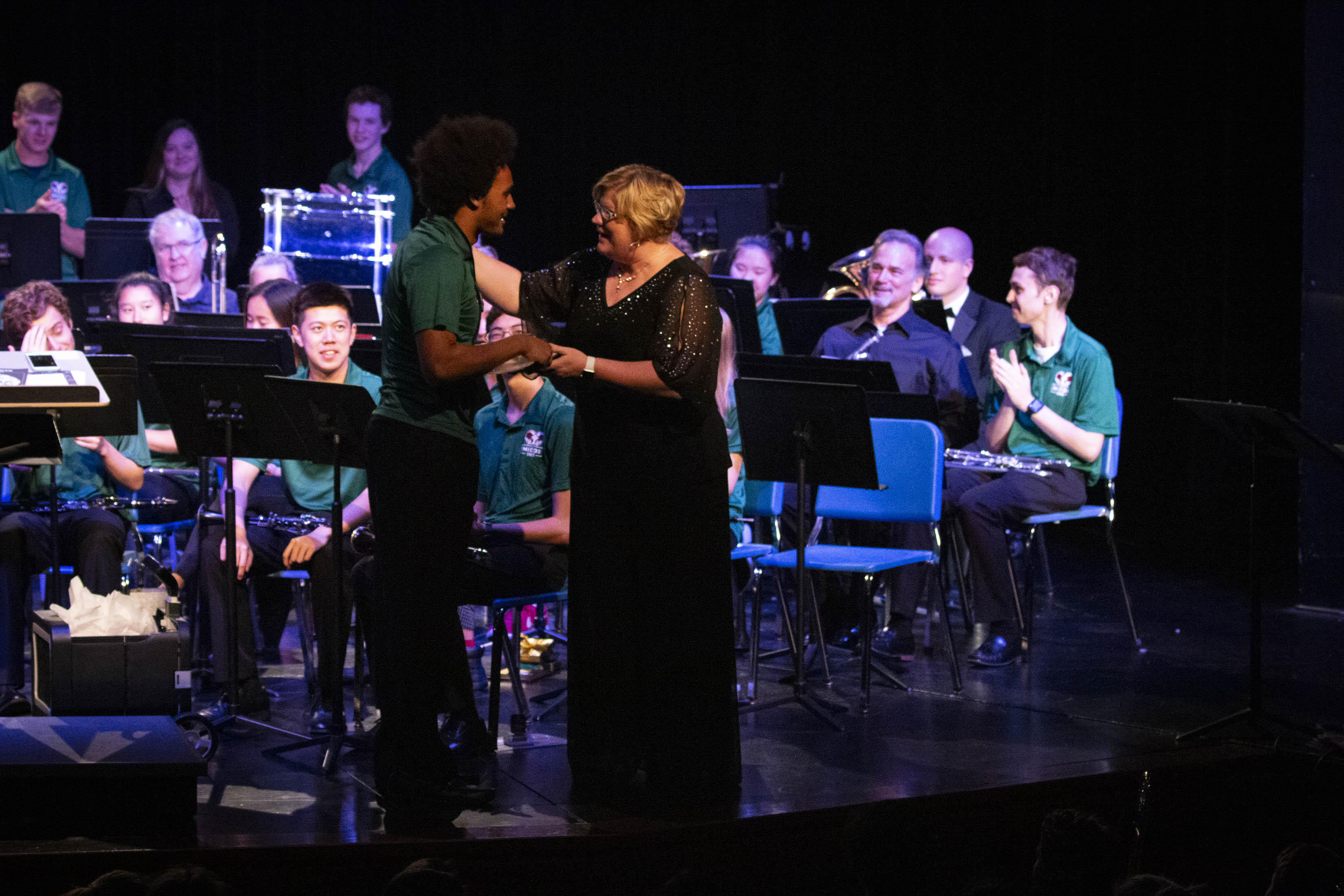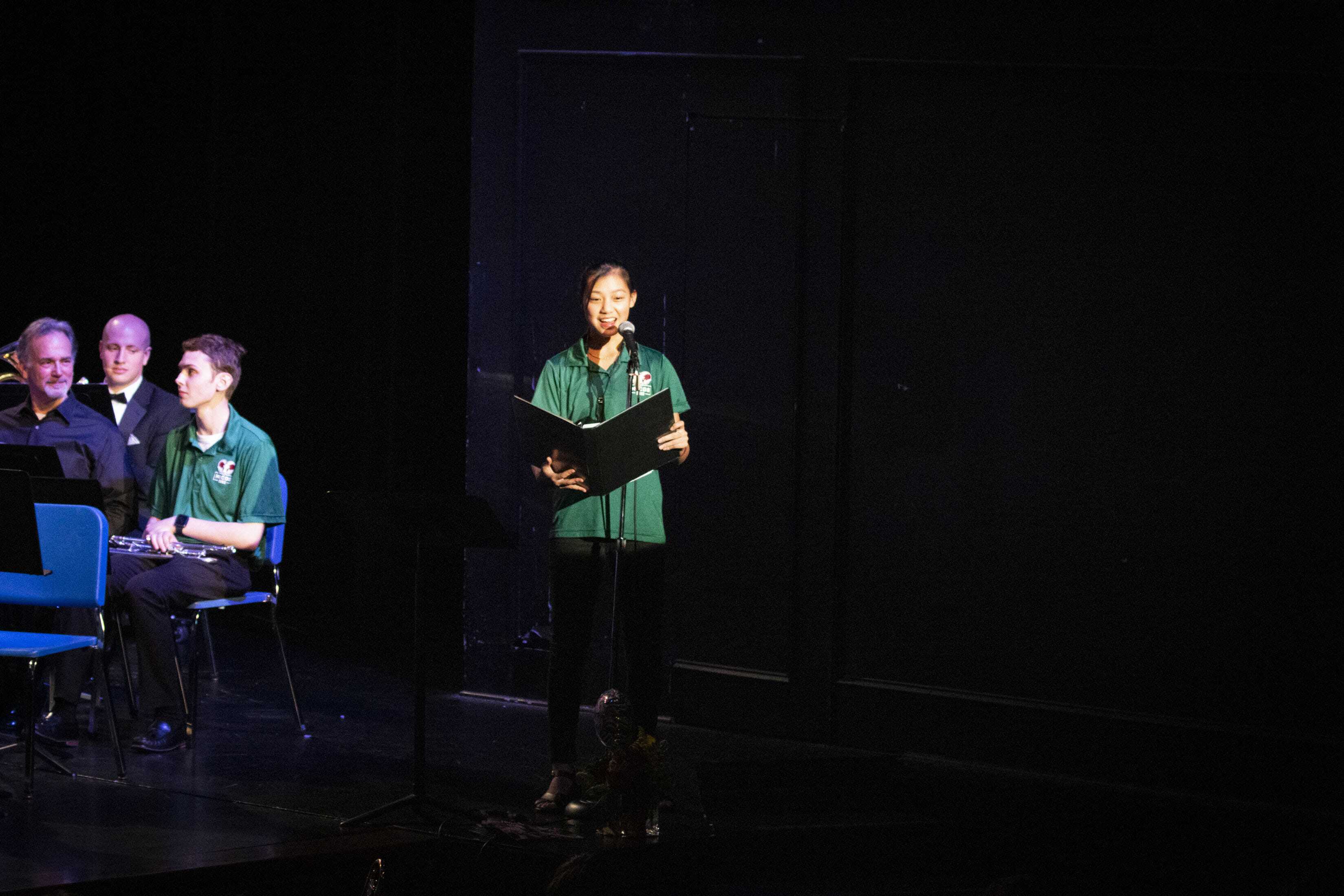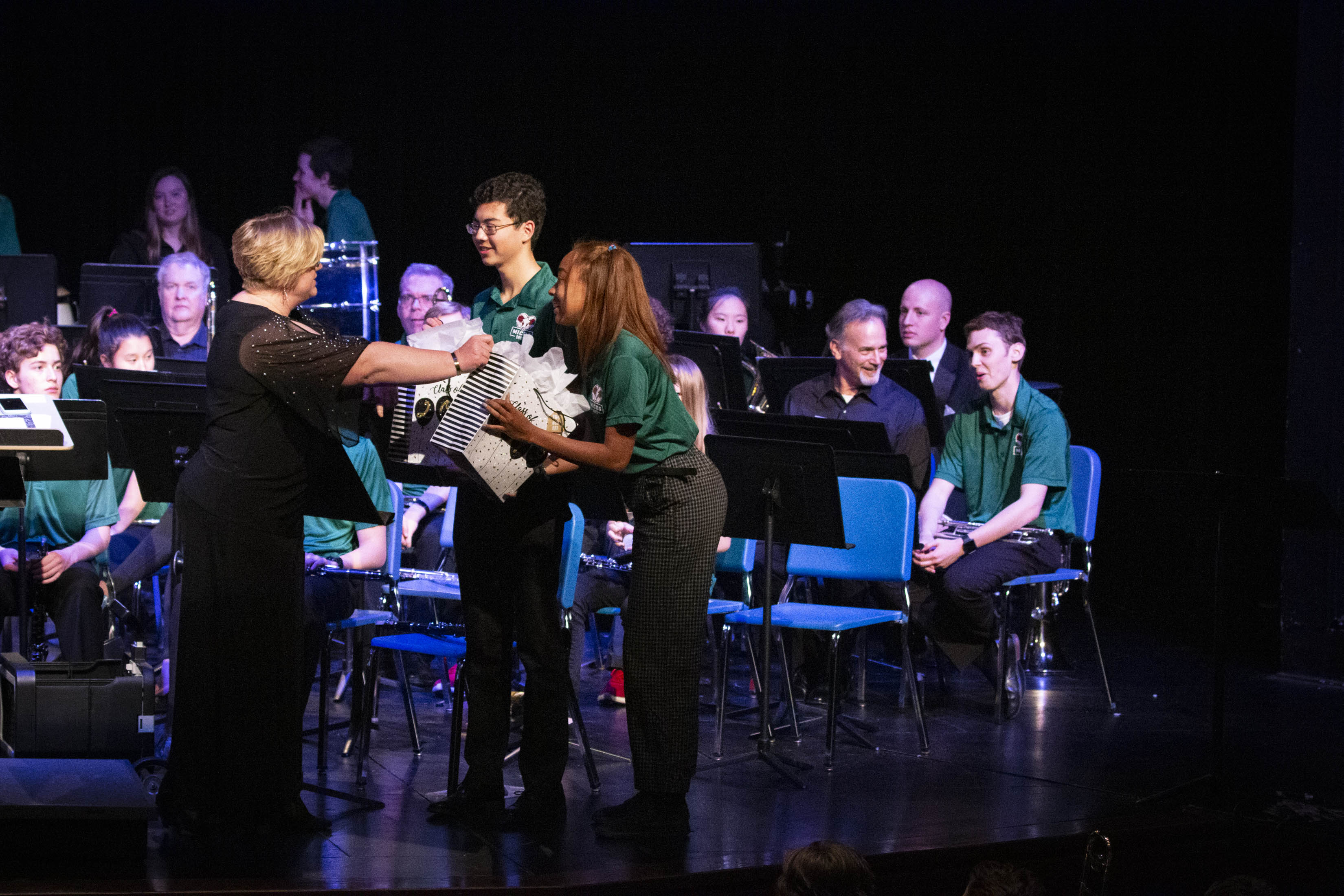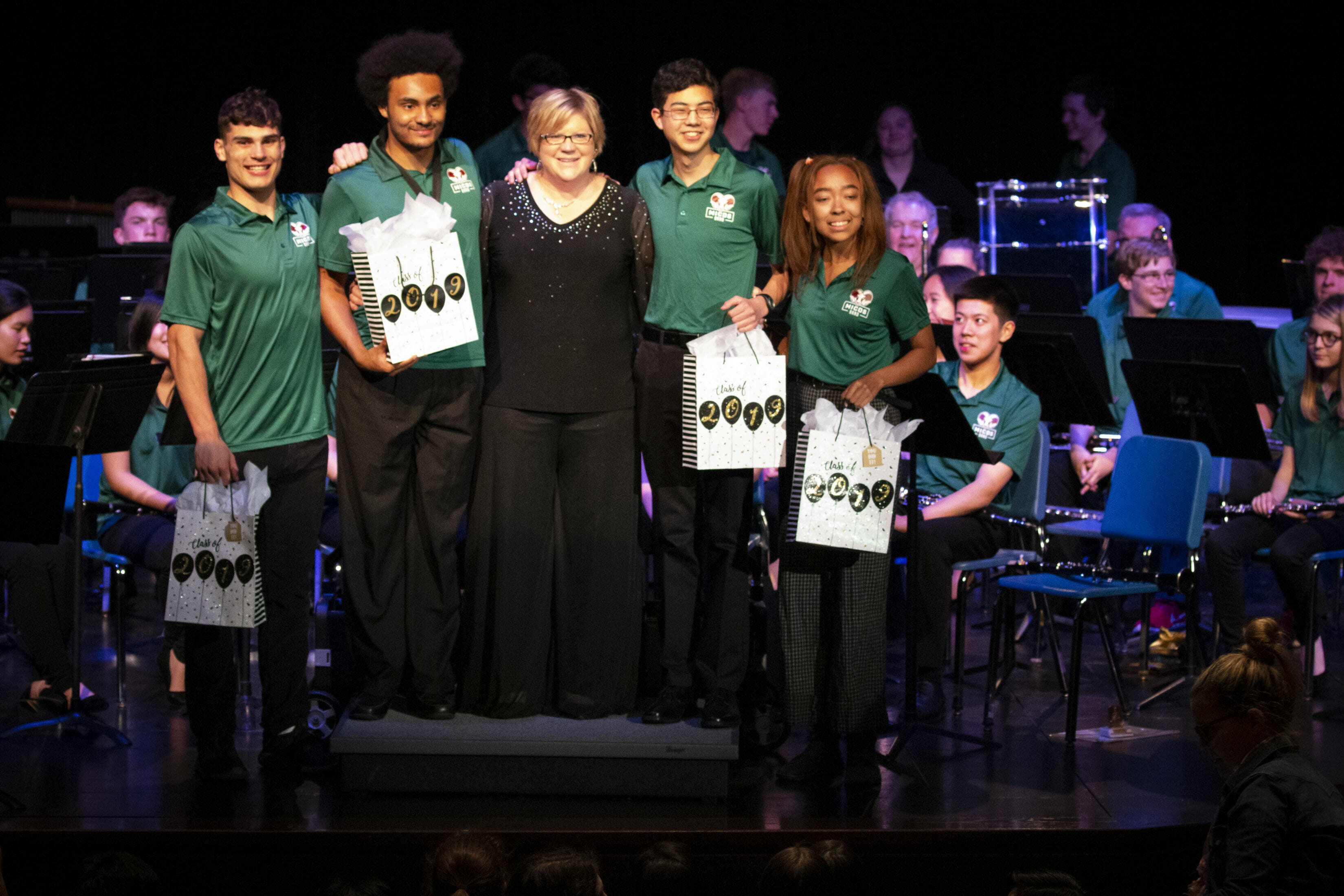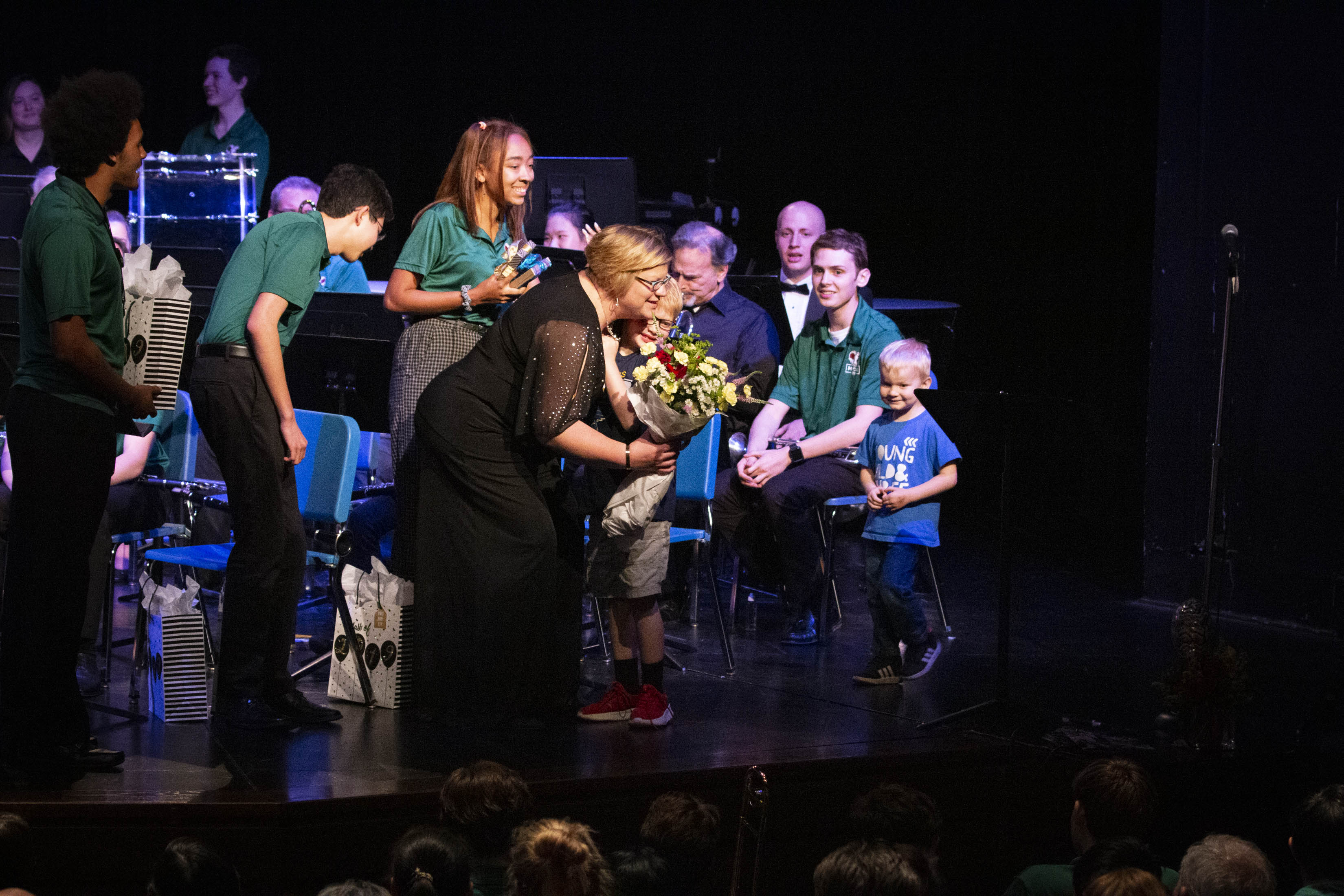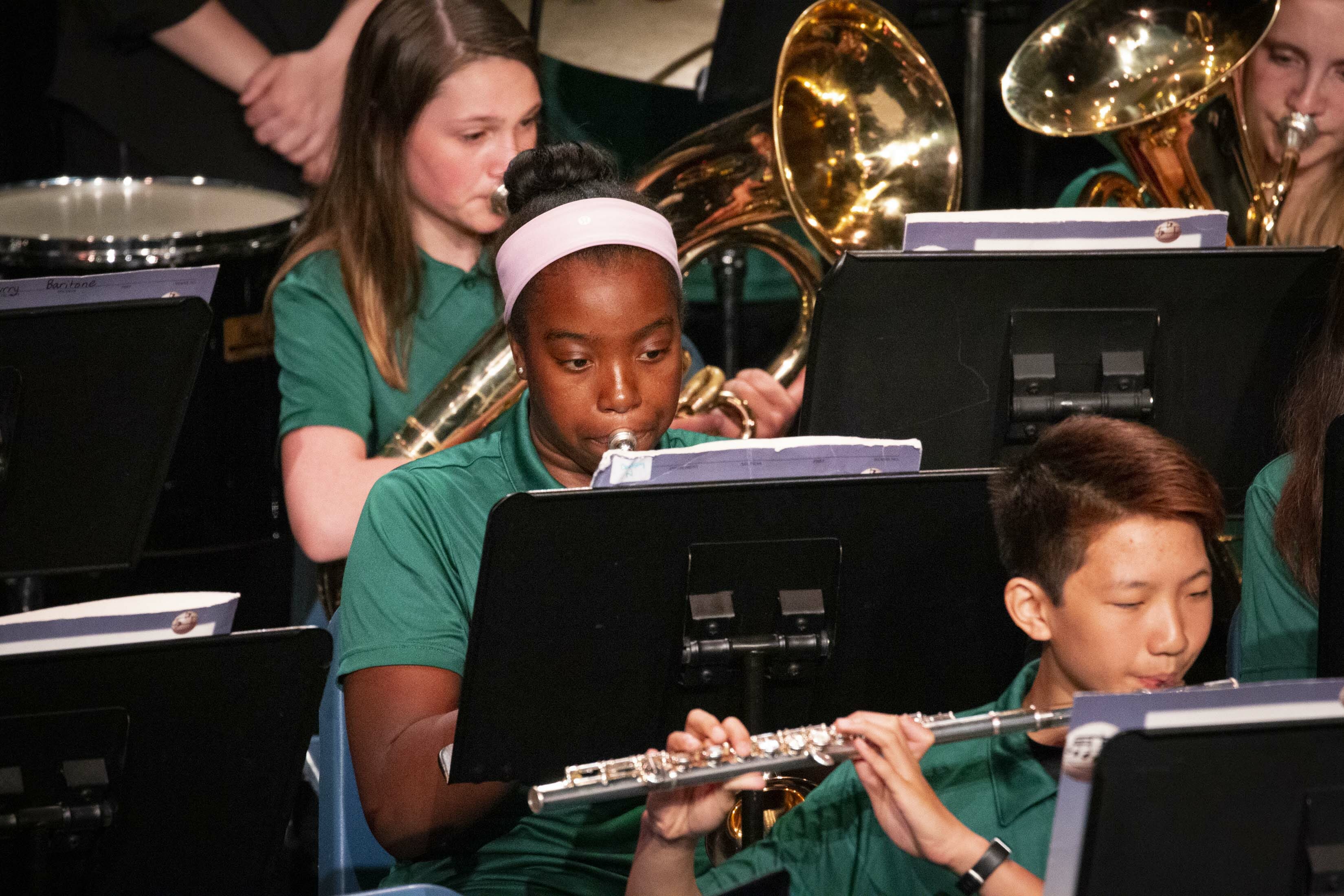A darkened Orthwein Theatre filled with beautiful music Wednesday when the Middle and Upper School bands performed their Spring Concert. Parents, faculty, staff, friends and loved ones filled the seats, enjoying a variety of music from 6th grade, 7th grade, 8th grade and Upper School students.
The 6th grade band kicked off the evening by performing three pieces. Instrumental Music Instructor Josh Baumgartner welcomed guests. He explained that the 6th grade band meets in two separate sections, the woodwinds in one class and the brass and percussion in another. Most of the students started playing their instruments at the beginning of the school year, which you’d never know as they performed beautifully. What’s even more impressive is that due to the two sections, the band had only one combined rehearsal before the concert. It was the day before, during recess! They have done a tremendous amount of work in a very short amount of time.
Anna Giles ’25 plays the clarinet, and she introduced the first piece. She said, “Excitation March was composed by Rob Grice to give young performers an opportunity to be excited about developing a march. Many consider concert marches to be the cornerstone of concert band literature.”
Clarinetist Brooke Bernstein ’25 spoke about the second performance, “Colliding Visions is a piece that was commissioned by the Prairie Hill Elementary 6th Grade Band. Unfortunately, after they received their grant, they found out that their band program was being shut down. The composer, Brian Balmages, wrote this piece knowing that it would be the last song the band would ever play. It opens with a beautiful melody, changes to a fast section which abruptly ends, then fades to a whisper. The symbolism of the students’ passion and their music program is noticeable throughout this piece.”
Norah Wright ’25, percussionist, explained the background for the third and final piece. She said, “Traditional dance in Africa often expresses the life of the community. The dance is characterized by the African polyrhythm and is closely connected with singing. The rhythmic variety typical of African music expresses itself in the body that is able to perform different sequences simultaneously. The movements are complex and often executed on the spot. Danza Africana is an original composition by Victor Lopez building on the musical concepts of these dances.”
The 7th Grade Band then took the stage, preparing for their own three pieces. Virginia Portell ’24 plays the trombone, and she welcomed the crowd, “The 7th-grade band is a band that consists of students from the 7th Grade Beginning Band, as well as students who started in 6th Grade last year. We have a wide range of instruments from woodwinds, which includes flutes, clarinets, and saxophones to brass, such as the trumpets, tuba, trombone, and baritones and we even have percussion. Even though our band only has two rehearsals in the 6-day cycle, we use these rehearsals to their full advantage.”
Amir Muhammad ’24 plays the alto saxophone. He spoke about the first piece, Chant and Ritual Dance by Joseph Compello, explaining, “It has a bold opening statement that will be developed throughout the rest of the piece. This piece has been challenging for us because it has tempo changes, and some new notes and rhythms.”
After that rousing performance, Zoe Zlatic ’24, clarinetist, introduced the second piece. “Discovery Overture, written by Anne McGinty, uses a variety of compositional techniques to alternately feature the woodwind and brass sections of our band. This piece contains marvelous melodies and distinctive harmonies. Not only does this piece have tempo changes, but it has a key change, too!”
Finally, the 7th Grade Band ended with Robotics, by Rob Romeyn. Camden Miller ’24, an alto saxophonist, said, “Contemporary harmonies, memorable themes and clanging percussion all combine to simulate the effect of a rogue robot on the loose.”
Mr. Baumgartner addressed the audience, thanking parents for their support of band students. “Learning to play an instrument isn’t easy. It isn’t easy for these kids,” he said, “and it isn’t easy for the people they live with, either. Encouragement and support are so important to education, and especially our band program.”
After the 6th and 7th grade bands performed, musicians retired to the Alumni Dining Hall to enjoy a Qdoba taco bar provided by the Arts Backers and served by band parent volunteers. They enjoyed time with each other and their 8th grade and Upper School bandmates, before the older students headed to their own concert.
Once again the seats in Orthwein Theatre filled with an audience ready to enjoy beautiful music. Mr. Baumgartner took the stage to welcome guests. He said, “The group on stage now is the 8th Grade Band. These students have been playing their instruments for at least one year, but many of them have been playing for two or more. With varying degrees of experience, you can imagine some of the difficulty we faced throughout the year. Nevertheless, these students have worked hard, and pulled together as a band to learn, and create some wonderful music. We are very proud of the work they have done.”
Jack Rollo ’23 plays the tenor saxophone. He introduced the first piece, Chariots by Sean O’Loughlin. The piece, he said, “is inspired by film scores for movies such as Spartacus and Citizen Kane. Chariots frames the sound of these scores for a middle school band, while still keeping a sense of an epic plot. The climax of this piece carries both weight and forward motion.”
Peter Grace ’23, clarinetist, spoke of the second and final piece performed by the 8th Grade band: Regal Fanfare. He said, “This majestic work by Richard Saucedo uses mixed meters alternating between 4/4 and 3/4 to achieve a truly unique-sounding fanfare. There is a nice balance between bold brass statements and answering woodwind phrases in this impressive piece.”
The 8th Grade band cleared the stage, and the Upper School students took their places and tuned their instruments. Mrs. Becky Long, Instrumental Music Instructor, welcomed the guests and shared her thoughts on the evening. She said, “What a wonderful year of music making we have had. I am so proud of each one of the musicians on stage. They handle themselves with grace, maturity, and fun each day. Tonight we are excited to share with you the culmination of a year’s worth of work. In addition, we will be honoring some outstanding students.”
She then went on to award Kelci Creath ’19 with the MICDS Band Outstanding Musicianship Award. She explained that “This award goes to a student who is just that…an outstanding musician. She is a leader in her section, earned a spot in the Metro 8 District Honor Band, received an outstanding soloist of the day award at the ABC League Solo Festival in February, an Exemplary rating at the MSHSAA District Solo Festival in March, and will be performing at the MSHSAA State Solo Festival at Mizzou on April 27.”
The band’s first piece was a chorale excerpt from Jupiter, by Gustav Holst. Shibashis Mandal ’20 plays tenor sax, and he introduced the piece. “The chorale starts out soft and emotive but you’ll hear it grow loud and majestic, ending on a powerful authentic cadence. You might recognize the melody from the British patriotic song I Vow to Thee My Country. Truth is, when Gustav Holst was commissioned to compose the British song, he was very stressed with other work and, not wanting to put that much work into it, he reworked Jupiter to match the rhythm of the lyrics he was given.”
Mrs. Long then presented the second award of the evening, the Louis Armstrong Jazz Award to Rafi Gil Diaz ’19. She said, “As a trumpeter, improviser, and singer, Louis Armstrong’s imagination and phenomenal skill dazzled audiences worldwide and revolutionized jazz. This nationally recognized jazz award was introduced in 1974 to honor the outstanding jazz musician at each high school who exhibits superior dedication, musicianship, and creativity. This year’s recipient truly embodies these qualities. In addition to having his own jazz group that he rehearses and writes arrangements for, he started a school jazz ensemble that he lets Mr. Baumgartner and I help out with. Both ensembles gave very impressive performances at the Blue Whale Cafe this year.”
This Saturday, April 20 marks the 20th anniversary of the Columbine High School Tragedy. Although our current students were not even born when it happened, they have experienced other school tragedies throughout their lifetimes. Mrs. Long and the Upper School Band performed An American Elegy composed by Frank Tichelli in memory of those who lost their lives at Columbine High School on April 20, 1999, and to honor the survivors. Mrs. Long said, “When Tichelli began the project, he wanted to use a quotation of music from the school’s alma mater in the piece. But, Columbine didn’t have an alma mater. So, Tichelli composed one.”
Of the piece, Tichelli writes “An American Elegy is offered as a tribute to the great strength and courage of the victims and survivors, in the face of a terrible tragedy. I hope the work can also serve as one reminder of how fragile and precious life is and how intimately connected we all are as human beings.”
The work begins at the bottom of the ensemble’s register, and ascends gradually to a heartfelt cry of hope. The main theme that follows reveals a more lyrical, serene side of the piece. A second theme, based on a simple repeated harmonic patterns, suggests yet another, more poignant mood. These three moods – hope, serenity, and sadness – become intertwined throughout the work, defining its complex expressive character. A four-part canon builds to a climactic quotation of the Columbine Alma Mater. The music recedes and a solo is heard, suggesting a celestial voice – a heavenly message. The full ensemble returns with a final exalted statement of the main theme.
The performance was supported by welcome members of the MICDS Upper School Choirs, under the direction of Mr. Dana Self, as they joined the instrumental performance by singing the Columbine alma mater. It was an extraordinary performance by both groups of students that left the room in awe before an eruption of appreciative applause.
Mrs. Long then presented the James Andrew Benecke ’06 Band Award to Tommaso Maiocco ’19. The plaque that holds names of the all of the recipients of this award states: This award will be presented annually, in memory of James Andrew Benecke, MICDS class of 2006, to an Upper School Band student who consistently demonstrates a commitment for improvement passion for performance, and dedication to the instrumental program at MICDS. Mrs. Long said about Tommaso, “this musician elevates all members of the band by continually displaying ‘The Right Stuff.’”
The concert then moved to Concert Fantasia on motives from Verdi’s opera Rigoletto. After Gil Diaz was selected to the Missouri All-State Band for the second year in a row, Mrs. Long asked him to learn a solo part for the spring concert. Gil Diaz suggested a band accompaniment to a solo he was already working on, and Mrs. Long agreed. Mrs. Long said, “This piece is not only unbelievably challenging for Rafi, it is an actual orchestral transcription of an opera that was premiered in 1851 and is very challenging for the entire band.” They performed beautifully!
Mrs. Long then awarded Chris Shannon ’19 the final prize of the night: the John Philip Sousa Band Award. This nationally recognized award has been the highest honor for high school band students since it was introduced in 1955. It recognizes superior musicianship and dedication. Shannon has many performances to his credit this year, including Blue Whale Cafe, MSHSAA District Solo & Ensemble Festival, and the upcoming MSHSAA State Solo and Ensemble Festival. Mrs. Long said, “He also worked unbelievably hard to prepare for his college audition and will be majoring in music next year. He has such a wonderful personality…his smile is infectious and I know he will stop at nothing to achieve his goals.”
The Upper School Band completed their concert with a vibrant performance of National Emblem March by Edwin Eugene Bagley. Amy Li ’21, alto sax, said, “One of the most famous of American marches, National Emblem became so highly thought of that many people have assumed that it was written by John Philip Sousa. It was actually composed by American composer, Edwin Eugene Bagley in 1905. National Emblem takes its name from our national emblem, the American flag. As matter of fact, portions of the Star Spangled Banner are heard in the first strain and trio of the march.”
Musicians and guests then retired to the Messing Art Gallery to enjoy a reception, while some of the state-bound solos and ensembles continued performing. It was a wonderful evening for our guests. Thank you to the Arts Backers for their support, and to the band parents who served dinner for our hungry musicians. Congratulations to all of our talented MICDS musicians and especially to those students who were honored with awards.
